Why are we reading if not in hope of beauty laid bare,
life heightened and its deepest mystery probed?
Annie Dillard, The Writing Life
This is just one of many quotes about reading or writing I sometimes share when doing talks about what books can do, why we should read (fiction or non-fiction) and the benefits of the reading life.
It was with great anticipation and a little trepidation that I prepared to (remotely) address a San Francisco Bay Area writers group—fiction writers, no less! I’ve addressed all manner of adults and children on the role of reading, but only a few times have I addressed actual writers about their own creative calling and craft. (I still recall fondly when a group of mostly seasoned journalists humored me as I tried to inspire them in their own vocation as reporters and writers.)
I’ve done some classes using teleconference technologies before but I was still nervous about whether Zoom would work (it didn’t; I won’t bore you with the glitchy details) but being with a chapter of the Association of Christian Fiction Writers was an honor and a thrill; like I said, though, I was nervous. It’s one thing to talk to book lovers about reading, but what did I have to say to real authors working on their novels? Some had even published books already, most were working on manuscripts. Although we stock a lot of so-called “Christian fiction” I have to admit I don’t read many of the stories from these evangelical publishers (and, I’ll admit it, I judge way too many of those books by their formulaic covers.) I’m not much of a fan of speculative fiction or fantasy, let alone science fiction, so, well, I was hoping I could offer some words of wisdom to help them reflect on their calling as writers.
Or at least I could remind them that we booksellers (and the many book buyers that count on us) appreciate their hard work. It’s a self-evident quip, but needs said: without writers writing books this whole publishing industry wouldn’t exist. We sell ‘em, but they write ‘em. Thanks be to God.
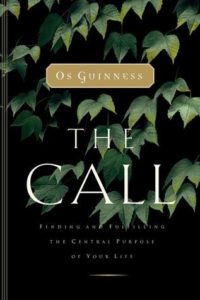 When in doubt, I often start with a passionate summary of the doctrine of vocation, talk about Os Guinness’s stellar and exquisite work The Call: Finding and Fulfilling Your Life’s Greatest Purpose (Word; $17.99) and remind folks that their work or avocations are as important to the Kingdom of God as is the work of ministers or missionaries. Explaining how the early church was wrong to so easily buy into Plato’s lie that life is made up of what some call “sacred and secular” spheres is a good way to start almost any talk on any topic. God cares, the world matters, we are called to reflect on the principles and practices that cohere with the actual way God’s good world really works, illumined by the light of Biblical truth. Citing that explosive verse about “taking every theory captive” (2 Corinthians 10:5) it’s helpful, I think, to remind folks to think well about what they do.
When in doubt, I often start with a passionate summary of the doctrine of vocation, talk about Os Guinness’s stellar and exquisite work The Call: Finding and Fulfilling Your Life’s Greatest Purpose (Word; $17.99) and remind folks that their work or avocations are as important to the Kingdom of God as is the work of ministers or missionaries. Explaining how the early church was wrong to so easily buy into Plato’s lie that life is made up of what some call “sacred and secular” spheres is a good way to start almost any talk on any topic. God cares, the world matters, we are called to reflect on the principles and practices that cohere with the actual way God’s good world really works, illumined by the light of Biblical truth. Citing that explosive verse about “taking every theory captive” (2 Corinthians 10:5) it’s helpful, I think, to remind folks to think well about what they do.
I wish the teleconferencing technology had worked better because some good back-and-forth dialogue about this would have been interesting. I invited them – as I have when I’ve addressed artists, before – to consider that one of the big topics that writers must grapple with is what they believe about the creative process itself. Too often, I think, Christian folks have too easily adopted perspectives about how imagination and creativity works without adequate philosophical reflection on the assumptions and consequences of those particular theories of creativity.
Don’t get me wrong: when a writer is revising a plot, or revising a sentence, she isn’t at that point pondering the deepest a priori attitudes or ethos of the MFA program she was a part of, or what is acceptable from a Biblical viewpoint about the proposals in, say, Julia Cameron’s beloved The Artists Way: A Spiritual Path to Greater Creativity (Tarcher; $17.00) or the philosophical-linguistic assumptions in Strunk and White. But at some point, we must. I think it hinders our Christian integrity and diminishes our gifts offered to the world when we don’t think Christianly about our work and think we can get by through “winging it” or adopting as gospel any popular author or theory that’s in vogue. (Just for an easy example, I have recommended more than a few times the truly fascinating book by the charming Elizabeth Gilbert called Big Magic Creative Living Beyond Fear (Riverhead; $16.00) but the way she suggests that “the muse” is maybe an actual being is, well, wacky at best. What should we think about this? Ought we to fall prey to talk about muses and whatnot? Where is that coming from?)
I suggested that when a lawyer is arguing her case, she isn’t at that moment thinking about the details of her jurisprudences classes as an L1 law student. (Hat tip to you, Kelley Way, lawyer and writer!) Counselors, scientists, businesspeople, parents, teachers, and nurses, are significantly influenced by the deep ideas they’ve come to adopt (from study in the classroom or from their mentors or from popular culture) and don’t always think about those theories in the moment of their daily practice; they are subconsciously assumed, lived out, like it or not. But at some point they should buy some Christian books and be intentional about thinking through just what they believe about the foundational matters in their field.
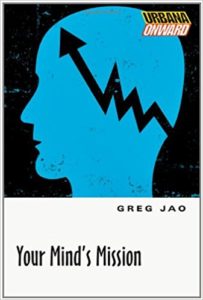 If this task or way of thinking about the intellectual implications of passages like 2 Corinthians 11:5 or Romans 12:1-2, I highly recommend at least reading up a bit on the Christian mind. My favorite brief book on this is by the wonderful Greg Jao and is called Your Mind’s Mission (IVP; $7.00.) I very briefly describe in an older BookNotes ten others in a list that’s a little dated but may proof helpful. We still stock these, and more, so check it out here.
If this task or way of thinking about the intellectual implications of passages like 2 Corinthians 11:5 or Romans 12:1-2, I highly recommend at least reading up a bit on the Christian mind. My favorite brief book on this is by the wonderful Greg Jao and is called Your Mind’s Mission (IVP; $7.00.) I very briefly describe in an older BookNotes ten others in a list that’s a little dated but may proof helpful. We still stock these, and more, so check it out here.
For writers, this includes thinking about art and creativity (long before you get to the questions of marketing and promotion, which carry their own set of intellectual and practical, spiritual challenges.) Which leads, sooner rather than later, to the thorny topic of aesthetics.
Whether one is writing a romance or a YA graphic novel, working in speculative fiction, or researching a historical piece, writing a bone fide horror novel or a cozy mystery, one’s work needs to be grounded in some basic assumptions about how God’s world of writing works, and what the creative process is all about. And, by the way: I don’t know what “literary fiction” is and reject any notion that only those writing high-brow, sophisticated novels have to consider aesthetic theory and deeper questions about the nature of creativity and story.
A FEW THAT MIGHT BE HELPFUL IN ESTABLISHING THIS FOUNDATIONAL FRAMEWORK
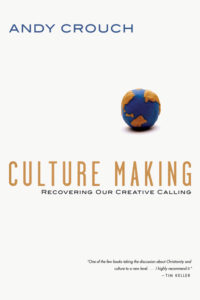 Culture Making: Recovering Our Creative Calling Andy Crouch (IVP) $22.00 Time and again I insist this is not a book for artists but for all of us, for any who long to be more meaningful engaged in the human task of culture-making, of stewarding the gifts God has given us for the common good. We are all called to make something out of what we are given and this image-of-God work of cultivating God’s garden is intrinsically human. So, yes, it is for butchers, bakers, and candlestick makers, for parents and politicians and practitioners of all sorts. But, let’s face it: who needs to have language to express this stuff, this good, creative calling, this longing to leave a legacy of something real, than those called to be artists, writers, poets, novelists? I very, very highly recommend this one-of-a-kind book.
Culture Making: Recovering Our Creative Calling Andy Crouch (IVP) $22.00 Time and again I insist this is not a book for artists but for all of us, for any who long to be more meaningful engaged in the human task of culture-making, of stewarding the gifts God has given us for the common good. We are all called to make something out of what we are given and this image-of-God work of cultivating God’s garden is intrinsically human. So, yes, it is for butchers, bakers, and candlestick makers, for parents and politicians and practitioners of all sorts. But, let’s face it: who needs to have language to express this stuff, this good, creative calling, this longing to leave a legacy of something real, than those called to be artists, writers, poets, novelists? I very, very highly recommend this one-of-a-kind book.
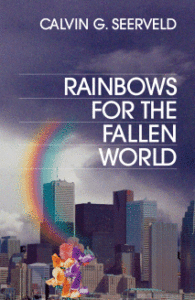 Rainbows for the Fallen World Calvin Seerveld (Toronto Tuppence Press) $30.00 In my presentation I explained a bit about this important book, on of my own personal all time favorites, especially the early chapters about how Seerveld reminds us, helps disclose for us, the aesthetic dimension to all of life. Here he does his most famous and often-discussed good work on “allusion” and a serious chapter or two on the philosophy of aesthetics. I’d read anything Cal writes – and what an energetic writer he is! For those who want a deep dive into his work, see any of these in this six-volume set which I describe HERE.
Rainbows for the Fallen World Calvin Seerveld (Toronto Tuppence Press) $30.00 In my presentation I explained a bit about this important book, on of my own personal all time favorites, especially the early chapters about how Seerveld reminds us, helps disclose for us, the aesthetic dimension to all of life. Here he does his most famous and often-discussed good work on “allusion” and a serious chapter or two on the philosophy of aesthetics. I’d read anything Cal writes – and what an energetic writer he is! For those who want a deep dive into his work, see any of these in this six-volume set which I describe HERE.
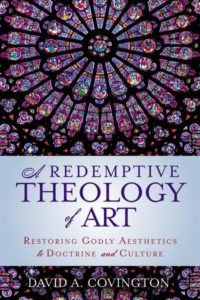 A Redemptive Theology of Art: Restoring Godly Aesthetics to Doctrine and Culture David A. Covington (Zondervan) $24.99 This is very new and I applaud Zondervan for releasing a book that, sadly, may not seem important to those who read theology. I’m part way through it want to commend the author for doing this kind of good work. It looks at how aesthetics can influence our understanding of doctrine as well as our engagement with the culture and the creative process. Good, good stuff. He quotes Seerveld, too.
A Redemptive Theology of Art: Restoring Godly Aesthetics to Doctrine and Culture David A. Covington (Zondervan) $24.99 This is very new and I applaud Zondervan for releasing a book that, sadly, may not seem important to those who read theology. I’m part way through it want to commend the author for doing this kind of good work. It looks at how aesthetics can influence our understanding of doctrine as well as our engagement with the culture and the creative process. Good, good stuff. He quotes Seerveld, too.
Noel Paul Stookey (yes of PPM fame) notes that this book reminds us of how aesthetics is related to adoration and love. And how “this book is a heartfelt reminder to seek out the redemptive quality in everything we do.”
My friend Bill Edgar of Westminster Theological Seminary, who is an excellent guide to this stuff in his own books, says:
David Covington has given us a remarkable window onto the Bible’s take on aesthetics. He gently but firmly deflates adages such as “beauty is in the eye of the beholder” and other subjective judgments, but without demeaning the spirit from which they are generated. A thoroughly elevating read.
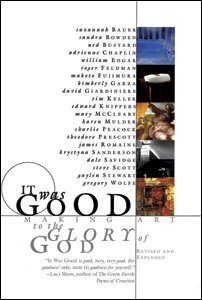
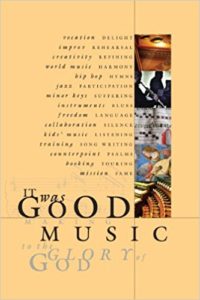
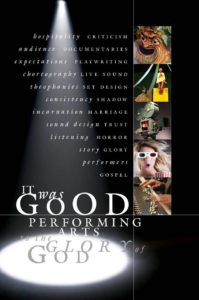 It Was Good: Making Art to the Glory of God edited by Ned Bustard (Square Halo Books) $24.99
It Was Good: Making Art to the Glory of God edited by Ned Bustard (Square Halo Books) $24.99
It Was Good: Making Music to the Glory of God edited by Ned Bustard (Square Halo Books) $24.99
It Was Good: Performing Arts to the Glory of God edited by Ned Bustard (Square Halo Books) $19.99
All three of these excellent collection of thoughtful essays are simple stellar and I recommend all three, truly. Each includes fabulous essays by dozens of thoughtful theorists and artists, practitioners and patrons, writers and thinkers, makers and performers. We are so proud to stock these (and everything else this classy niche publisher does.) The first is obviously most foundational; the second is for anyone who enjoys music (or is involved in music-making) which the new, third one is for dancers, actors, film-makers, and others in the active, performing arts. See our previous BookNotes observations about these three here, here, or here, and order from us today at our 20% off offer. Check out the Square Halo Books website, here.
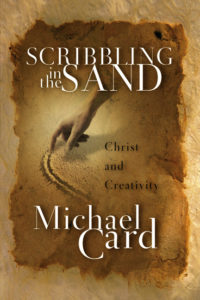 Scribbling in the Sand: Christ and Creativity Michael Card (IVP) $17.00 There are heavier books out there, but I really, really like Mike’s mature reflections and balanced call to embrace some degree of creativity in our daily lives. This is helpful for artists and writers, but also good for anyone. We recommend it often.
Scribbling in the Sand: Christ and Creativity Michael Card (IVP) $17.00 There are heavier books out there, but I really, really like Mike’s mature reflections and balanced call to embrace some degree of creativity in our daily lives. This is helpful for artists and writers, but also good for anyone. We recommend it often.
I love what Michael writes about the famous incident with Jesus writing in the dirt: “It was art and it was theater at the same time, but it was more. It was what he did not say that spoke most powerfully to the mob that morning.”
Interestingly, but well deservedly, Scrdibbling in the Sand was voted 2002 Publisher’s Weekly Best Adult Religion Book of the Year!
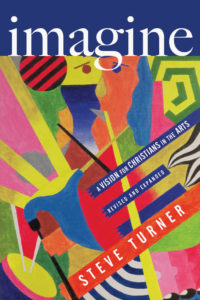 Imagine: A Vision for Christians in the Arts Steve Turner (IVP) $16.00 This is another standard go-to book for us that is basic, interesting, engaging for anyone whether filmmaker, musician, storyteller, or writer – or anyone who just enjoys the popular arts. I so appreciate this classic book, which was nicely expanded a few years back and often recommend it (to artists and others; maybe especially others.) Steve Turner is a respected rock critic (and has written widely on, among other musical icons, The Beatles.) This is a very good book, highly recommended.
Imagine: A Vision for Christians in the Arts Steve Turner (IVP) $16.00 This is another standard go-to book for us that is basic, interesting, engaging for anyone whether filmmaker, musician, storyteller, or writer – or anyone who just enjoys the popular arts. I so appreciate this classic book, which was nicely expanded a few years back and often recommend it (to artists and others; maybe especially others.) Steve Turner is a respected rock critic (and has written widely on, among other musical icons, The Beatles.) This is a very good book, highly recommended.
 Echoes of Eden: Reflections on Christianity, Literature, and the Arts Jerram Barrs (Crossway) $18.99 When my friend Denis Haack says something good about a book, when jazzman and seminary prof William Edgar has a blurb (saying it is “enriching both professional artists and anyone else sensitive to the power of art for all of life”) and when Nicholas Perrin (once a teaching assistant to NT Wright) says that Barr “clears away the clutter of much-touted arguments and sets forth a clear framework for any Christian thinking Biblically about the arts” you know you’ve got my attention.
Echoes of Eden: Reflections on Christianity, Literature, and the Arts Jerram Barrs (Crossway) $18.99 When my friend Denis Haack says something good about a book, when jazzman and seminary prof William Edgar has a blurb (saying it is “enriching both professional artists and anyone else sensitive to the power of art for all of life”) and when Nicholas Perrin (once a teaching assistant to NT Wright) says that Barr “clears away the clutter of much-touted arguments and sets forth a clear framework for any Christian thinking Biblically about the arts” you know you’ve got my attention.
Wow — check out what Pastor Tim Keller says:
The most accessible, readable, and yet theologically robust work on Christianity and the arts that you will be able to find.
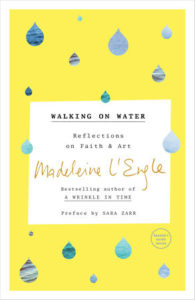 Walking on Water: Reflections on Faith and Art Madeline L’Engle (Convergence) $15.00 This is a must-read for any serious writer. Her take on the creative process and the spirituality of the arts is wise and a tad unusual – she draws on desert fathers and medieval artists and more. It is not simplistic. Of course, her main art work is as an author, so it’s very good for writers. There is, in this recently re-issued paperback, a lovely preface by the YA novelist Sara Zarr.
Walking on Water: Reflections on Faith and Art Madeline L’Engle (Convergence) $15.00 This is a must-read for any serious writer. Her take on the creative process and the spirituality of the arts is wise and a tad unusual – she draws on desert fathers and medieval artists and more. It is not simplistic. Of course, her main art work is as an author, so it’s very good for writers. There is, in this recently re-issued paperback, a lovely preface by the YA novelist Sara Zarr.
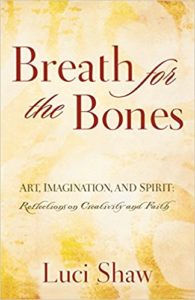 Breath for the Bones: Art, Imagination, and Spirit: Reflections on Creativity and Faith Luci Shaw (Thomas Nelson) $15.99 Luci Shaw (or was good friends and prayer partner with Madeline L’Engle, by the way) is a very esteemed Christian literary figure, a poet and nonfiction essayist, spiritual leader and storyteller. (She has a new book of poetry coming from Paraclete Press this fall!!) This is a book that should be on every aspiring writers shelves, maybe on your nightstand. She knows good writing – from Emily Dickinson to Annie Dillard – she reflects on the meaning of symbolism and metaphor and shows how good art (mostly good writing since that is her particular specialty) can help humans flourish and even experience God. Very nicely done and very inspiring.
Breath for the Bones: Art, Imagination, and Spirit: Reflections on Creativity and Faith Luci Shaw (Thomas Nelson) $15.99 Luci Shaw (or was good friends and prayer partner with Madeline L’Engle, by the way) is a very esteemed Christian literary figure, a poet and nonfiction essayist, spiritual leader and storyteller. (She has a new book of poetry coming from Paraclete Press this fall!!) This is a book that should be on every aspiring writers shelves, maybe on your nightstand. She knows good writing – from Emily Dickinson to Annie Dillard – she reflects on the meaning of symbolism and metaphor and shows how good art (mostly good writing since that is her particular specialty) can help humans flourish and even experience God. Very nicely done and very inspiring.
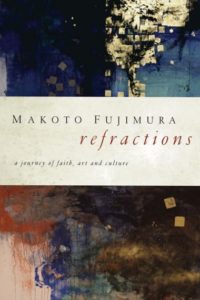 Refractions: A Journey of Faith, Art and Culture Makoto Fujimura (NavPress) $24.99 We stock and highly recommend all of Mako’s extraordinary books; there is a reason he is so well respected in so many quarters. As an abstract painter living near Ground Zero during 9-11 his ruminations on the arts have a poignant, socially responsible tone. These are beautiful essays, cries from the heart of a lively, thoughtful, Christian artist. I hope you know his many other books, from the broad and thoughtful Culture Care: Reconnecting with Beauty for our Common Life to Silence and Beauty: Hidden Faith Born of Suffering the specific, award-winning study of the classic Japanese novel, Silence, which raises huge questions about how art can be helpful as we live in a hurting world. We talked about this matter somewhat in the writers group – that good books can help heal the world. Silence and Beauty shows us how it’s done. But I think his Refractions is a must-have book.
Refractions: A Journey of Faith, Art and Culture Makoto Fujimura (NavPress) $24.99 We stock and highly recommend all of Mako’s extraordinary books; there is a reason he is so well respected in so many quarters. As an abstract painter living near Ground Zero during 9-11 his ruminations on the arts have a poignant, socially responsible tone. These are beautiful essays, cries from the heart of a lively, thoughtful, Christian artist. I hope you know his many other books, from the broad and thoughtful Culture Care: Reconnecting with Beauty for our Common Life to Silence and Beauty: Hidden Faith Born of Suffering the specific, award-winning study of the classic Japanese novel, Silence, which raises huge questions about how art can be helpful as we live in a hurting world. We talked about this matter somewhat in the writers group – that good books can help heal the world. Silence and Beauty shows us how it’s done. But I think his Refractions is a must-have book.
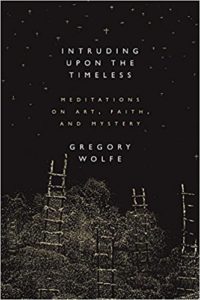 Intruding Upon the Timeless: Meditations on Art, Faith and Mystery Gregory Wolfe (Square Halo Books) $22.99 I think any literary person should know the exquisite and thoughtful prose of this well-informed Catholic leader in the movement – the space, as we say these days – relating faith and the arts. You should know the journal he founded, Image, his collection of essays entitled The Operation of Grace: Further Essays on Art, Faith, and Mystery, and a major work entitled Beauty Will Save the World: Recovering the Human in an Ideological Age. (You should know his wife, Suzanne’s, two excellent novels, too, The Confessions of X, about Augustine’s early lover and Unveiling, a revised, newly reissued novel about an art restoration project. But I digress.) This recent Square Halo edition of Intruding Upon the Timeless a collection of short, luminous, essays by Wolfe from Image was expanded last year and reissued with new artwork within, including some by woodcut artist Barry Moser. Very, very nicely done, and good reading for anyone in the arts, and certainly faith-based writers.
Intruding Upon the Timeless: Meditations on Art, Faith and Mystery Gregory Wolfe (Square Halo Books) $22.99 I think any literary person should know the exquisite and thoughtful prose of this well-informed Catholic leader in the movement – the space, as we say these days – relating faith and the arts. You should know the journal he founded, Image, his collection of essays entitled The Operation of Grace: Further Essays on Art, Faith, and Mystery, and a major work entitled Beauty Will Save the World: Recovering the Human in an Ideological Age. (You should know his wife, Suzanne’s, two excellent novels, too, The Confessions of X, about Augustine’s early lover and Unveiling, a revised, newly reissued novel about an art restoration project. But I digress.) This recent Square Halo edition of Intruding Upon the Timeless a collection of short, luminous, essays by Wolfe from Image was expanded last year and reissued with new artwork within, including some by woodcut artist Barry Moser. Very, very nicely done, and good reading for anyone in the arts, and certainly faith-based writers.
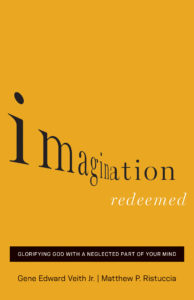 Imagination Redeemed: Glorifying God with a Neglected Part of Your Mind Gene Veith & Matthew Ristuccia (Crossway) $16.99 It is surprising that there are few books that are directly exploring the role of imagination in faith. There are a few that are a bit eccentric or obtuse, but this is clear and insightful. It is a good starting point towards a coherently Christian approach and has endorsements on the back by David Kim (of the Redeemer Presbyterian Center for Faith and Work), Jeremy Begbie (who, after Seerveld, may be one of the most important aesthetic theorists writing today) and the esteemed emeritus Wheaton literature prof Leland Ryken.
Imagination Redeemed: Glorifying God with a Neglected Part of Your Mind Gene Veith & Matthew Ristuccia (Crossway) $16.99 It is surprising that there are few books that are directly exploring the role of imagination in faith. There are a few that are a bit eccentric or obtuse, but this is clear and insightful. It is a good starting point towards a coherently Christian approach and has endorsements on the back by David Kim (of the Redeemer Presbyterian Center for Faith and Work), Jeremy Begbie (who, after Seerveld, may be one of the most important aesthetic theorists writing today) and the esteemed emeritus Wheaton literature prof Leland Ryken.
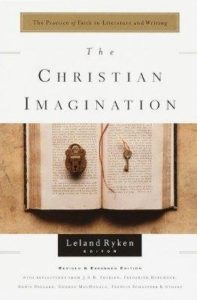 The Christian Imagination: The Practice of Faith in Literature and Writing Leland Ryken (Shaw Books) $24.99 Some say that this is an ideal book to use in a class on writing or literature, an anthology that brings together some of the very best stuff written on the integration of faith and literature. It is a bit dated and tends towards the classical, but for what it does it is an unparalleled anthology. In it you’ll find excerpts from C.S. Lewis, Flannery O’Conner, Dorothy Sayers, Frederick Buechner, and more… a good exercise for any writer is to dip into good writing and it is always worthwhile for anyone trying to develop their own opinions about creativity and aesthetics and the writing process to hear what great minds have said about this daunting topic. What a joy to have this thick paperback of 480 pages!
The Christian Imagination: The Practice of Faith in Literature and Writing Leland Ryken (Shaw Books) $24.99 Some say that this is an ideal book to use in a class on writing or literature, an anthology that brings together some of the very best stuff written on the integration of faith and literature. It is a bit dated and tends towards the classical, but for what it does it is an unparalleled anthology. In it you’ll find excerpts from C.S. Lewis, Flannery O’Conner, Dorothy Sayers, Frederick Buechner, and more… a good exercise for any writer is to dip into good writing and it is always worthwhile for anyone trying to develop their own opinions about creativity and aesthetics and the writing process to hear what great minds have said about this daunting topic. What a joy to have this thick paperback of 480 pages!
HERE ARE A FEW ABOUT THE CREATIVE PROCESS… ENJOY THEM, LEARN SOMETHING, AND, YET, AS ALWAYS, READ WITH DISCERNMENT
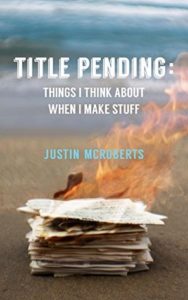 Title Pending: What I Think About When I Make Stuff Justin McRoberts (CreateSpace) $10.99 I told the San Fran Bay Area ACFW group that they should know Justin, a singer-songwriter, workshop leader, podcast genius, author and all-around cultural creative who lives out there. Title Pending is a little known self-published work by a guy I really, really respect which is full of advice and ideas about being creative. Congrats to Justin and his friend Scott “The Painter” Erickson who just signed a deal with Waterbrook. Yah. What do you think about when you make stuff? Maybe Justin’s insights can help you answer that, or give a better answer. Cool.
Title Pending: What I Think About When I Make Stuff Justin McRoberts (CreateSpace) $10.99 I told the San Fran Bay Area ACFW group that they should know Justin, a singer-songwriter, workshop leader, podcast genius, author and all-around cultural creative who lives out there. Title Pending is a little known self-published work by a guy I really, really respect which is full of advice and ideas about being creative. Congrats to Justin and his friend Scott “The Painter” Erickson who just signed a deal with Waterbrook. Yah. What do you think about when you make stuff? Maybe Justin’s insights can help you answer that, or give a better answer. Cool.
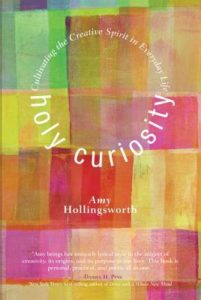 Holy Curiosity: Cultivating the Creative Spirit in Everyday Life Amy Hollingsworth (Cascade) $18.00 Perhaps you know Hollingsworth for her excellent book The Simple Faith of Mister Rogers or the riveting memoir she co-wrote with her son, Runaway Radical. She’s a fine writer and her craft is on full display here as she weaves her own story about discovering something essential about the creative process. As one writer said in a back cover review “Amy draws thread from spools ancient and modern, mythic and scientific, experiential and theoretical and weaves a seamless story…”
Holy Curiosity: Cultivating the Creative Spirit in Everyday Life Amy Hollingsworth (Cascade) $18.00 Perhaps you know Hollingsworth for her excellent book The Simple Faith of Mister Rogers or the riveting memoir she co-wrote with her son, Runaway Radical. She’s a fine writer and her craft is on full display here as she weaves her own story about discovering something essential about the creative process. As one writer said in a back cover review “Amy draws thread from spools ancient and modern, mythic and scientific, experiential and theoretical and weaves a seamless story…”
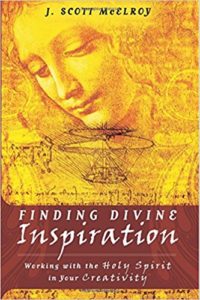 Finding Divine Inspiration: Working with the Holy Spirit in Your Creativity Scott McElroy (Destiny Image) $15.99 Scott has made a unique contribution in this field of “creativity studies” by asking, very responsibly, I might add, what active role the Holy Spirit has in our creative efforts. I like Scott a lot and many will appreciate this simple guide to discerning God’s guidance in our own efforts at the creative process. By the way, McElroy has since gone on to write a very useful book for those involved in arts ministries in the local church called Creative Church Handbook: Releasing the Power of the Arts in Your Congregation (IVP; $20.00.)
Finding Divine Inspiration: Working with the Holy Spirit in Your Creativity Scott McElroy (Destiny Image) $15.99 Scott has made a unique contribution in this field of “creativity studies” by asking, very responsibly, I might add, what active role the Holy Spirit has in our creative efforts. I like Scott a lot and many will appreciate this simple guide to discerning God’s guidance in our own efforts at the creative process. By the way, McElroy has since gone on to write a very useful book for those involved in arts ministries in the local church called Creative Church Handbook: Releasing the Power of the Arts in Your Congregation (IVP; $20.00.)
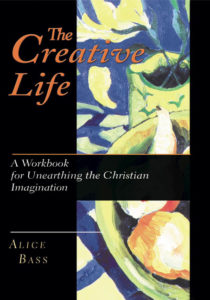 The Creative Life: A Workbook for Unearthing the Christian Imagination Alice Bass (InterVarsity Press) $19.00 You know we are fond of IVP and respect and trust their instincts about books. This was a workbook full of thoughtful exercises and things to generate greater creativity for anyone hope to unearth their own gift and capacities. I suspect this could be described as an evangelical version of something like The Artist’s Way.
The Creative Life: A Workbook for Unearthing the Christian Imagination Alice Bass (InterVarsity Press) $19.00 You know we are fond of IVP and respect and trust their instincts about books. This was a workbook full of thoughtful exercises and things to generate greater creativity for anyone hope to unearth their own gift and capacities. I suspect this could be described as an evangelical version of something like The Artist’s Way.
Bass has worked in theatre and here is what Karen, Lund, another actor has written about The Creative Life workbook:
“The Creative Life is a straightforward, practical approach to reclaiming your creativity for the Creator. Obviously inspired and delightfully inspirational, Alice Bass speaks eloquently to the artist in each of us that has been silenced by fear but seeks to re-emerge in truth and light. This workbook is a must for the Christian artist who seeks to reconnect or connect for the first time his gifts with the Giver.”
 The Creative Call: An Artist’s Response to the Way of the Spirit Janice Elsheimer (Shaw/Waterbrook) $16.99 This is a book loaded with ideas, experiments, exercises and more. Designed for anyone wanting to enhance creativity, even if it is backyard gardening, a hobby of photography or digging out an old instrument from your youth. It does seems perhaps very suited for writers; for a while, this publisher (founded by Harold and Luci Shaw) had a few books in a series they called “The Writer’s Palette.) Nice, huh?
The Creative Call: An Artist’s Response to the Way of the Spirit Janice Elsheimer (Shaw/Waterbrook) $16.99 This is a book loaded with ideas, experiments, exercises and more. Designed for anyone wanting to enhance creativity, even if it is backyard gardening, a hobby of photography or digging out an old instrument from your youth. It does seems perhaps very suited for writers; for a while, this publisher (founded by Harold and Luci Shaw) had a few books in a series they called “The Writer’s Palette.) Nice, huh?
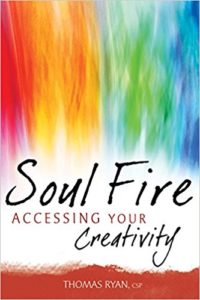
Soul Fire: Accessing Your Creativity Thomas Ryan, CSP (Skylight Paths) $16.99 This is deeply spiritual in an ecumenical, even interfaith way; the author is a Catholic mystic and yoga instructor and draws here on some of the usual suspects on tapping your inner spirit and creative impulses – Julia Cameron, Dan Wakefield, Marianne Williamson, Jung, even. He has some lovely, evocative poetry, lots of creativity exercises, sidebars with practical advise. This was released before the popularity of Richard Rohr’s Falling Upward but Ryan does deal (as does Rohr) with some “second half of life” stuff and those that appreciate Rohr will like this.
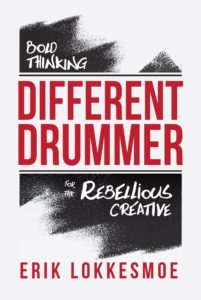 Different Drummer: Bold Thinking for the Rebellious Creative Erik Lokkesmoe (Elevant) $13.99 This small book is expertly designed with short and pithy chapters, super-graphics, cool design with touches of red ink and black graphics, with no-holds-barred bold reminders to be a “difference maker.” Lokkesmoe – who left a job in the policy world of Washington DC to be a culturally creative organizer — shows how to be encouraged, how to let go of fear and move forward into your essential role in God’s missional plan. This is very, very practical but yet expressing a youthful sort of idealistic energy. First it’ll rock your world and then you’ll really dig it.
Different Drummer: Bold Thinking for the Rebellious Creative Erik Lokkesmoe (Elevant) $13.99 This small book is expertly designed with short and pithy chapters, super-graphics, cool design with touches of red ink and black graphics, with no-holds-barred bold reminders to be a “difference maker.” Lokkesmoe – who left a job in the policy world of Washington DC to be a culturally creative organizer — shows how to be encouraged, how to let go of fear and move forward into your essential role in God’s missional plan. This is very, very practical but yet expressing a youthful sort of idealistic energy. First it’ll rock your world and then you’ll really dig it.
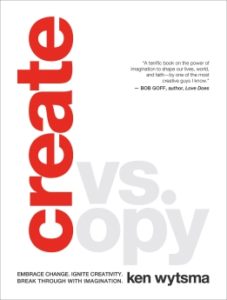 Create vs Copy: Embrace Change, Ignite Creativity, Break Through with Imagination Ken Wytsma (Moody Press) $14.99 I hope you recall that we’ve touted Wytsma before – we highly recommend his book that came out of his spectacular work founding the annual “Justice Conference” called Pursuing Justice as well as his excellent book on racism and white privilege, The Myth of Equality. But this hand-sized hardback is not only pretty cool to see but is laden with great insight about how to cultivate a creative mindset in life and leadership, using greater imagination, learning how to unleash some of our in-born creativity. The blurb on the front by Bob Goff is pretty nifty, too.
Create vs Copy: Embrace Change, Ignite Creativity, Break Through with Imagination Ken Wytsma (Moody Press) $14.99 I hope you recall that we’ve touted Wytsma before – we highly recommend his book that came out of his spectacular work founding the annual “Justice Conference” called Pursuing Justice as well as his excellent book on racism and white privilege, The Myth of Equality. But this hand-sized hardback is not only pretty cool to see but is laden with great insight about how to cultivate a creative mindset in life and leadership, using greater imagination, learning how to unleash some of our in-born creativity. The blurb on the front by Bob Goff is pretty nifty, too.
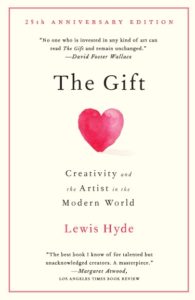 The Gift: Creativity and the Artist in the Modern World Lewis Hyde (Vintage) $16.95 This is less a workshop on being creative or an inspirational guide to finding your flow but a very impressive, almost scholarly history of how creators make a difference. Margaret Atwood says it is “the best book I know of for talented but unacknowledged creators. A masterpiece.” Jonathan Lethem said it is an “epiphany, in sculpted prose.” It is a manifesto of sorts, a call for a culture not to be so governed by money and commodity but to be reformed by the audacious generosity of artists who share their work as gift. Canadian folk-rocker Bruce Cockburn did a neat song on his 1988 Big Circumstance album inspired by this book called “The Gift.” Enjoy that here.
The Gift: Creativity and the Artist in the Modern World Lewis Hyde (Vintage) $16.95 This is less a workshop on being creative or an inspirational guide to finding your flow but a very impressive, almost scholarly history of how creators make a difference. Margaret Atwood says it is “the best book I know of for talented but unacknowledged creators. A masterpiece.” Jonathan Lethem said it is an “epiphany, in sculpted prose.” It is a manifesto of sorts, a call for a culture not to be so governed by money and commodity but to be reformed by the audacious generosity of artists who share their work as gift. Canadian folk-rocker Bruce Cockburn did a neat song on his 1988 Big Circumstance album inspired by this book called “The Gift.” Enjoy that here.
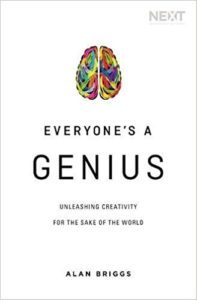 Everyone’s a Genius: Unleashing Creativity for the Sake of the World Alan Briggs (Thomas Nelson) $16.99 Briggs has a great book about staying put and caring about your own neighborhood called Staying is the New Going and the introduction (by Michael Frost) about how literature can evoke a sense of place is worth the price of the book. Many have heard me rave about this author. This is a fairly new one, absolutely fascinating, about team-building and brain studies and leadership and art and culture and, well making stuff. Very nice; a fabulous way to think about creativity and, curiously, missional church leadership, too. Give it a try – you’ll be captivated.
Everyone’s a Genius: Unleashing Creativity for the Sake of the World Alan Briggs (Thomas Nelson) $16.99 Briggs has a great book about staying put and caring about your own neighborhood called Staying is the New Going and the introduction (by Michael Frost) about how literature can evoke a sense of place is worth the price of the book. Many have heard me rave about this author. This is a fairly new one, absolutely fascinating, about team-building and brain studies and leadership and art and culture and, well making stuff. Very nice; a fabulous way to think about creativity and, curiously, missional church leadership, too. Give it a try – you’ll be captivated.
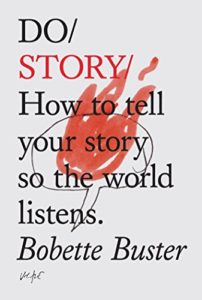 Do Story: How to Tell Your Story So the World Listens Bobette Buster (Chronicle Books) $16.95 Buster is an extraordinary woman who teaches storytelling at Northeastern University and has done presentations with all the great film studios (Pixar, Sony, Disney.) While this book seems to be more about engaging an audience with live storytelling – if you want to do a TED talk, you’ve got to get this – it is rich for anyone doing any sort of storytelling, writing, marketing, even. It’s a very hip little volume by an amazingly important person of faith. Enjoy.
Do Story: How to Tell Your Story So the World Listens Bobette Buster (Chronicle Books) $16.95 Buster is an extraordinary woman who teaches storytelling at Northeastern University and has done presentations with all the great film studios (Pixar, Sony, Disney.) While this book seems to be more about engaging an audience with live storytelling – if you want to do a TED talk, you’ve got to get this – it is rich for anyone doing any sort of storytelling, writing, marketing, even. It’s a very hip little volume by an amazingly important person of faith. Enjoy.
+++
Well. I had seven big points that I preached about in the Christian Fiction Writers workshop, seven things books can do as we read them and how authors should be thinking about how the results or fruit of their writerly art. Of course they are not to pander or write directly in order to achieve these goals (that’s not the point) but it might be that knowing how character or plot development matters to readers, and some of what good art can evoke, will at least keep them moving in the right direct as they dream up worlds, create characters, allow the plots to meander and grow.
Those seven points could all be sermons in themselves, but at the very least I hope the participants recall that I insisted that readers respond to novels – and films and plays and TV shows and ballads – because they help us narrate our own lives; we connect the dots of the narrative and make sense of our own storied lives. We are wired for words because we are made in the image of a speaking God – let there be! – and our human love-language is story because we are made in the image of a storytelling God. (The Bible is a big, complicated, story, after all, surely an unfolding drama.
The narrative nature of Scripture is, happily, getting a lot of attention these days. There are wonderful resources that help us explore this such as The Drama of Scripture: Finding Our Place in the Biblical Story by Craig Bartholomew and Michael Goheen (Baker 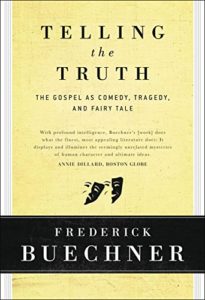 Academic; $24.99) which is very good, even for seasoned Bible readers. Since I was talking to writers,
Academic; $24.99) which is very good, even for seasoned Bible readers. Since I was talking to writers,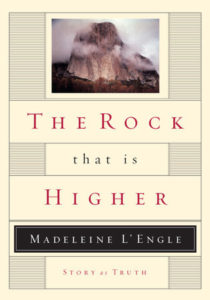 though, I slipped into an advertisement for Frederick Buechner’s fascinating Telling the Truth: The Gospel as Tragedy, Comedy and Fairy Tale (HarperOne; $17.99.) There is much more that should be said about God as Word and the Bible as Story. It’s important for all of us but should be great encouragement to those honing their writing chops, inventing fantastical worlds, spinning years and writing mysteries. Stories are close to the heart of God. And they work for us, helping us long for the right stuff, to learn to belong, to realize the story we are a part of, as Madeline L’Engle explores in her lovely The Rock That Is Higher: Story as Truth (Waterbrook; $16.99.)
though, I slipped into an advertisement for Frederick Buechner’s fascinating Telling the Truth: The Gospel as Tragedy, Comedy and Fairy Tale (HarperOne; $17.99.) There is much more that should be said about God as Word and the Bible as Story. It’s important for all of us but should be great encouragement to those honing their writing chops, inventing fantastical worlds, spinning years and writing mysteries. Stories are close to the heart of God. And they work for us, helping us long for the right stuff, to learn to belong, to realize the story we are a part of, as Madeline L’Engle explores in her lovely The Rock That Is Higher: Story as Truth (Waterbrook; $16.99.)
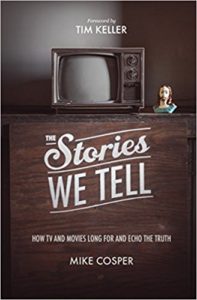 Time didn’t allow, but in a more extensive workshop teaching about this, I’d look at least at the splendid table of contents of The Stories We Tell: How TV and Movies Long for and Echo the Truth by Mike Cosper (Crossway; $15.99) which gives us new ways to appreciate the stories we watch (or read!) Although written for viewers themselves, I think writers would be helped by The Stories We Tell, just being reminded how all this works.
Time didn’t allow, but in a more extensive workshop teaching about this, I’d look at least at the splendid table of contents of The Stories We Tell: How TV and Movies Long for and Echo the Truth by Mike Cosper (Crossway; $15.99) which gives us new ways to appreciate the stories we watch (or read!) Although written for viewers themselves, I think writers would be helped by The Stories We Tell, just being reminded how all this works.
In the middle of my talk I did a hefty, if quick, riff on James K.A. Smith’s You Are What You Love: The Spiritual Power of Habit (Brazos; $19.99.) It was during one of the points about how reading well can shape our desires (and, consequentially, our virtue, as 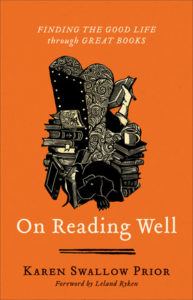 so beautifully explored in the forthcoming On Reading Well: Finding the Good Life Through Great Books by Karen Swallow Prior (Brazos Press; $19.99.) I love Smith’s line about how our imaginations can be “conscripted into a story” of a certain vision of the good life. That’s what good stories do; they grab our hearts, shape our imagination, and thereby form our desires (for better or for worse, of course. They sneak right past those “watchful dragons” you know.) They help us want what we want and love what we love. For those who take Christian beliefs seriously, and want to be part of God’s redemptive story, the problem is, as Smith warns, we might not love what we think we do.
so beautifully explored in the forthcoming On Reading Well: Finding the Good Life Through Great Books by Karen Swallow Prior (Brazos Press; $19.99.) I love Smith’s line about how our imaginations can be “conscripted into a story” of a certain vision of the good life. That’s what good stories do; they grab our hearts, shape our imagination, and thereby form our desires (for better or for worse, of course. They sneak right past those “watchful dragons” you know.) They help us want what we want and love what we love. For those who take Christian beliefs seriously, and want to be part of God’s redemptive story, the problem is, as Smith warns, we might not love what we think we do.
So, again — stories can shape our loves and desires and the social imaginaries which give rise to certain ways of life. That is, we become virtuous (or not) somewhat because of the stories we enter.
[To be clear, as Smith explains in You Are What You Love, this includes all sorts of influences by pop culture and our living in the world as we do; practices like how we shop and use cell phones, how we stand with our hands over our hearts singing an anthem to our nation, what we do, over and over, which he calls “secular liturgies.” But his point is utterly germane when we think about how novels shape us; Karen Swallow Prior knows this and nicely cites Smith early on in her forthcoming On Reading Well. Mark you calendars now if you are anywhere near us September 14th. If you care about story, if you love or want to love books, if you want a thoughtful conversation about virtue and narrative and loving the right stuff about the right books, you’ve got to join us!]
So, again, books matter, reading influences us, and consequently there is much at stake in the holy call to write well and artfully tell good stories of depth and truth.
Just for fun, here is a famous quote, again from C.S. Lewis, that I sometimes ponder when thinking about literature, about fiction reminding us how living in the “real” world is enhanced by stories, even fantasy and fairy stories. I hope my writer friends appreciate it (especially those that are writing fantasy or speculative fiction or some kind of magical realism:
Fairy land arouses a longing for [a child] knows not what. It stirs and troubles him (to his life-long enrichment) with the dim sense of something beyond his reach and, far from dulling or emptying the actual world, gives it a new dimension of depth. He does not despise real woods because he has read of enchanted woods: The reading makes all real woods a little enchanted.
A FEW GOOD BOOKS ABOUT THE READING LIFE
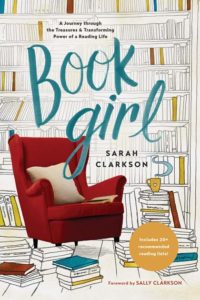 Book Girl: A Journey Through the Treasures & Transforming Power of a Reading Life Sarah Clarkson (Tyndale) $15.99 Oh how I wish I had known about this when we did our BookNotes a week or so ago about books you should pre-order. Book Girl by Sarah Clarkson comes out in September and you certainly should pre-order it right away. As I hope you saw, I highly recommended in that BookNotes On Reading Well by Karen Swallow Prior (who will be doing a presentation at our store on September 14th 2018) and invited you to pre-order that book about reading. But this beautiful book by Sally Clarkson should also have been on that list as well. It comes out in September and the first few chapters are about as sweet as anything I’ve ever read about the power of books, the virtues of the reading life, and joy of discovering books. How interesting that there are two books about the reading life coming out from two Christian publishers this fall.
Book Girl: A Journey Through the Treasures & Transforming Power of a Reading Life Sarah Clarkson (Tyndale) $15.99 Oh how I wish I had known about this when we did our BookNotes a week or so ago about books you should pre-order. Book Girl by Sarah Clarkson comes out in September and you certainly should pre-order it right away. As I hope you saw, I highly recommended in that BookNotes On Reading Well by Karen Swallow Prior (who will be doing a presentation at our store on September 14th 2018) and invited you to pre-order that book about reading. But this beautiful book by Sally Clarkson should also have been on that list as well. It comes out in September and the first few chapters are about as sweet as anything I’ve ever read about the power of books, the virtues of the reading life, and joy of discovering books. How interesting that there are two books about the reading life coming out from two Christian publishers this fall.
Book Girls: A Journey… is written specifically for women (it is called Book Girl, after all) but I was wiping tears from my eyes as I read these splendid, glorious words from a kindred sister. What a book! Much of the passion I shared for the role of a riveting story or the deep meaning of good fiction with the California ACFW gang is also found in Clarkson’s lovely, seasoned voice, and if you like being encouraged to read, or enjoy ruminations on why your book hobby is so very vital, well, this really is wonderful. You will love it.
 The big second half of Book Girl is comprised of Sarah Clarkson’s remarkably interesting lists of books around varying themes and genres (fiction and non-fiction.) As I skimmed these chapters on real-life topics and marveled at the many books she deftly annotated I kept shaking my head in agreement and kept smiling in recognition…
The big second half of Book Girl is comprised of Sarah Clarkson’s remarkably interesting lists of books around varying themes and genres (fiction and non-fiction.) As I skimmed these chapters on real-life topics and marveled at the many books she deftly annotated I kept shaking my head in agreement and kept smiling in recognition…
Man, we stock a lot of these titles and so wish we had Sarah for a customer! Ha! Seriously, some bookstores might find a good book loving loyal customer or two the very thing that keeps them afloat in these hard days of declining interest in books and bookstores. I couldn’t help but thinking that maybe those who take her up on these high quality books will rediscover a favorite bookseller (and not buy them from the faceless porno-dealer Amazon.)
Books about books are always interesting to me, and we have bunches of them here at the shop, but this one is ideal for any Christian reader. Whether you’re a book girl or not. Again, you can pre-order this beautiful paperback even now at the 20% discount price.
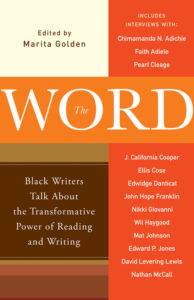 The Word: Black Writers Talk about the Transformative Power of Reading and Writing edited by Marita Golden (Broadway) $14.99 I nearly have the first pages of this remarkable book memorized as I’ve read them out loud to so many groups… these opening vignettes of novelist and memoirist Marita Golden’s encounter with books have very significantly moved me and never fails to remind me of the impact of books and why we do what we do as booksellers. I love these kinds of anthologies about folks talking about the power of books, reading them and even writing them. That it is black writers makes it that much more vital.
The Word: Black Writers Talk about the Transformative Power of Reading and Writing edited by Marita Golden (Broadway) $14.99 I nearly have the first pages of this remarkable book memorized as I’ve read them out loud to so many groups… these opening vignettes of novelist and memoirist Marita Golden’s encounter with books have very significantly moved me and never fails to remind me of the impact of books and why we do what we do as booksellers. I love these kinds of anthologies about folks talking about the power of books, reading them and even writing them. That it is black writers makes it that much more vital.
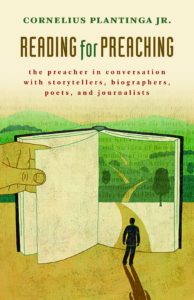 Reading for Preaching: The Preacher in Conversation with Storytellers, Biographers, Poets, and Journalists Cornelius Plantinga, Jr. (Eerdmans) $14.00 Those who are fairly new to BookNotes might want to click back to this short review I did of this when it first came out. Plantinga is famous for having written a number of great books (including one of my all times favorites, Engaging God’s World: A Christian Vision of Faith, Learning and Living) but one of the most interesting (and generative) things he has done is to offer a retreat for pastors where they talk about novels (and other good writing) they have been assigned.This spectacular resource came out of those retreats; it was designed to enhance preaching, but I think it is fabulous for anyone that likes good books and wonders just a bit more of what we can learn from them. As Richard Lischer says, Reading for Preaching represents the gift of a lifetime. And, again, no matter if you are a preacher or not, as Thomas Long writes, “This book is about delightful reading, and it is itself a delight to read.”
Reading for Preaching: The Preacher in Conversation with Storytellers, Biographers, Poets, and Journalists Cornelius Plantinga, Jr. (Eerdmans) $14.00 Those who are fairly new to BookNotes might want to click back to this short review I did of this when it first came out. Plantinga is famous for having written a number of great books (including one of my all times favorites, Engaging God’s World: A Christian Vision of Faith, Learning and Living) but one of the most interesting (and generative) things he has done is to offer a retreat for pastors where they talk about novels (and other good writing) they have been assigned.This spectacular resource came out of those retreats; it was designed to enhance preaching, but I think it is fabulous for anyone that likes good books and wonders just a bit more of what we can learn from them. As Richard Lischer says, Reading for Preaching represents the gift of a lifetime. And, again, no matter if you are a preacher or not, as Thomas Long writes, “This book is about delightful reading, and it is itself a delight to read.”
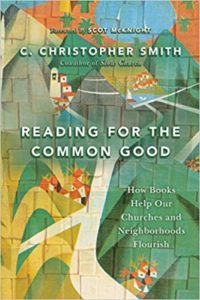 Reading for the Common Good: How Books Help Our Churches and Neighborhoods Flourish C. Christopher Smith (IVP) $16.00 I said in my little writer’s workshop that this was a book I wished I had written and that I so, so value it. I cannot but want to press a copy into the hands of anyone who cares about books, about thinking well and studying and talking about books and being committed to the reading life; Chris really understands the holy significance of books in Kingdom ministry and knows that slow reading and careful conversations are key practices to reform our social imaginaries. This book has such a unique and valuable take on things that I need to say that I even think that without a wider embrace of the ideas shared in this provocative, thoughtful book, the role of Christian bookstores may be doomed. Reading matters, and this gives as robust (and enjoyable) vision for that as any book I know. Buy a few, please, and share them. Give one to a book-lovin’ friend and one who ought to be. Yes!
Reading for the Common Good: How Books Help Our Churches and Neighborhoods Flourish C. Christopher Smith (IVP) $16.00 I said in my little writer’s workshop that this was a book I wished I had written and that I so, so value it. I cannot but want to press a copy into the hands of anyone who cares about books, about thinking well and studying and talking about books and being committed to the reading life; Chris really understands the holy significance of books in Kingdom ministry and knows that slow reading and careful conversations are key practices to reform our social imaginaries. This book has such a unique and valuable take on things that I need to say that I even think that without a wider embrace of the ideas shared in this provocative, thoughtful book, the role of Christian bookstores may be doomed. Reading matters, and this gives as robust (and enjoyable) vision for that as any book I know. Buy a few, please, and share them. Give one to a book-lovin’ friend and one who ought to be. Yes!
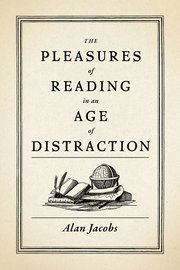 The Pleasures of Reading in an Age of Distraction Alan Jacobs (Oxford University Press) $19.95 Jacobs is an exquisite, world-class scholar, a serious essayist – think First Things or Image or the old Books & Culture – and this wonderful 2011 book was a contribution to the discussions around the topic of how on-line reading effects our capacity to pay attention, to read well, to retain what we’ve read. Important books like Nicholas Carr’s The Shallows (a very good, if alarming, read) were pessimistic, exposing how too much time on Facebook and social media erodes our capacities to read seriously. The Shallows was understandably dire, an Amusing Ourselves to Death for the digital age. Well, in all of these conversations and broadsides against tech and laments about the erosion of our reading habits, few noted that what was at stake was not just retaining great learning, but, well, enjoyment. We are supposed to be having fun, reading books we like. So this wonderful book – still a rather serious work of lit-and-culture-criticism from Oxford University Press – is about pleasure. Many of our best customers have truly enjoyed it.
The Pleasures of Reading in an Age of Distraction Alan Jacobs (Oxford University Press) $19.95 Jacobs is an exquisite, world-class scholar, a serious essayist – think First Things or Image or the old Books & Culture – and this wonderful 2011 book was a contribution to the discussions around the topic of how on-line reading effects our capacity to pay attention, to read well, to retain what we’ve read. Important books like Nicholas Carr’s The Shallows (a very good, if alarming, read) were pessimistic, exposing how too much time on Facebook and social media erodes our capacities to read seriously. The Shallows was understandably dire, an Amusing Ourselves to Death for the digital age. Well, in all of these conversations and broadsides against tech and laments about the erosion of our reading habits, few noted that what was at stake was not just retaining great learning, but, well, enjoyment. We are supposed to be having fun, reading books we like. So this wonderful book – still a rather serious work of lit-and-culture-criticism from Oxford University Press – is about pleasure. Many of our best customers have truly enjoyed it.
I wish I had mentioned the Jacobs’ Pleasures of Reading to my new writer friends in San Francisco. Although I emphasized all kinds of deep meaning and self-awareness and worldview formation and the like that reading fiction can evoke in us, let’s face it: authors want people to say they enjoyed their book! They want readers to take pleasure in the story. Yes, yes, yes.
+++
Since I was talking to writers, inspiring them to think about their calling and task, to — highfalutin’ as it may sound – develop a Christian perspective on a philosophy of the arts and a theologically-sound perspective on the creative process and a faith-informed view of the craft of writing – I figured these two books simply had to be mentioned and heartily recommended. In a longer workshop I’d cite them carefully and read lovely, thoughtful excerpts. I bet you recall me mentioning them before.
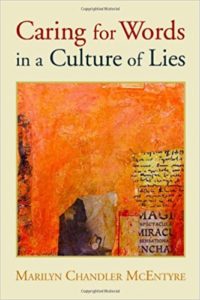 Caring for Words in a Culture of Lies Marilyn McEntyre (Eerdmans) $19.00 What if words were like natural resources, gift from God who wants to steward them well? These are brilliant “stewardship strategies” for anyone who uses words in these awful times. Highly recommended, especially for writers. Why don’t you just get it now, if you haven’t yet, because I’m going to keep recommending it over and over. It’s that good and that important.
Caring for Words in a Culture of Lies Marilyn McEntyre (Eerdmans) $19.00 What if words were like natural resources, gift from God who wants to steward them well? These are brilliant “stewardship strategies” for anyone who uses words in these awful times. Highly recommended, especially for writers. Why don’t you just get it now, if you haven’t yet, because I’m going to keep recommending it over and over. It’s that good and that important.
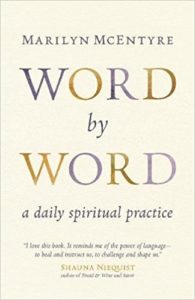 Word By Word: A Daily Spiritual Practice Marilyn McEntyre (Eerdmans) $17.99 This is like an ordinary Christian daily devotional, but instead of the standard Bible verse and reflection on it, this offers a word on ponder. One reflects on it in a variety of ways, a different angle each day, for a week. It is a beautifully (and deeply spiritual) tutorial on plumbing the meaning of the words and phrases we use, entering into them in wise and fruitful ways.
Word By Word: A Daily Spiritual Practice Marilyn McEntyre (Eerdmans) $17.99 This is like an ordinary Christian daily devotional, but instead of the standard Bible verse and reflection on it, this offers a word on ponder. One reflects on it in a variety of ways, a different angle each day, for a week. It is a beautifully (and deeply spiritual) tutorial on plumbing the meaning of the words and phrases we use, entering into them in wise and fruitful ways.
I can’t say enough about those two books. Writer or not, reader or not, these are so very important to our flourishing and health in this crazy world.
To reinforce some of this deep conviction of ours, at the very end of the Association of Christian Fiction Writer’s talk I cited what is shown in large, Celtic-type script on the back cover of the new fantasy novel (the first of a series, of course) by 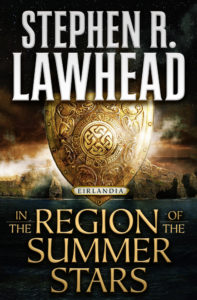 Stephen Lawhead:
Stephen Lawhead:
“Thus does the world change, not with a sword. But with a word.”
That’s from the brand new In the Region of the Summer Stars, Book One in the Eirlandia series (Tor; $25.99.) I hope you know Steve Lawhead who has done a prodigious body of work of fantasy and (ancient) historical fiction.
 And, if you will allow me this stream-of-consciousness mention, speaking of fantasy: it is great news for Tolkien lovers that Christopher Tolkien has been working on yet another (and most likely the last) unpublished story of Middle-earth fiction from his famous father. Look for The Fall of Gondolin by J.R.R. Tolkien coming from Houghton Mifflin ($30.00) on the street date of August 30, 2918. Naturally, you can pre-order it by following the link to our secure order form page, below.
And, if you will allow me this stream-of-consciousness mention, speaking of fantasy: it is great news for Tolkien lovers that Christopher Tolkien has been working on yet another (and most likely the last) unpublished story of Middle-earth fiction from his famous father. Look for The Fall of Gondolin by J.R.R. Tolkien coming from Houghton Mifflin ($30.00) on the street date of August 30, 2918. Naturally, you can pre-order it by following the link to our secure order form page, below.
A FEW ABOUT WRITING
 On Writing: A Memoir of the Craft Stephen King (Scribner) $17.00 I don’t know anyone who has read this book who hasn’t exclaimed about how surprised they were by it, and how enjoyable and inspiring it was; even, for some, how very helpful it was. It is by almost all accounts a tremendous read, wise and thoughtful and full of basic, solid advice, even if it is mostly written as a memoir. A hint: he’s interested in the mechanics of language usage more than you may wish but not big on plot outlines.
On Writing: A Memoir of the Craft Stephen King (Scribner) $17.00 I don’t know anyone who has read this book who hasn’t exclaimed about how surprised they were by it, and how enjoyable and inspiring it was; even, for some, how very helpful it was. It is by almost all accounts a tremendous read, wise and thoughtful and full of basic, solid advice, even if it is mostly written as a memoir. A hint: he’s interested in the mechanics of language usage more than you may wish but not big on plot outlines.
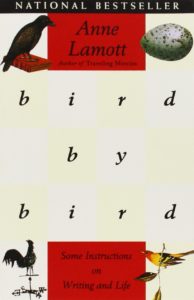 Bird by Bird: Some Instructions on Writing and Life Anne Lamott (Anchor) $16.00 Are there any serious writers who don’t know this book? It was called “a warm, generous and hilarious guide through the writer’s world and its treacherous swamps.” It is pretty clear that she came to Christian faith as she was writing this – Traveling Mercies colorfully tells that story, of course. An enduring book, it came out in 1994 (preceding the novel, a few years later, Crooked Little Hearts.) As the Seattle Times wrote of it, Bird by Bird is “A gift to all of us mortals who write or ever wanted to write… sidesplittingly funny, patiently wise and alternately cranky and kind – a reveille to get off our duffs and start writing now, while we still can.” Yup.
Bird by Bird: Some Instructions on Writing and Life Anne Lamott (Anchor) $16.00 Are there any serious writers who don’t know this book? It was called “a warm, generous and hilarious guide through the writer’s world and its treacherous swamps.” It is pretty clear that she came to Christian faith as she was writing this – Traveling Mercies colorfully tells that story, of course. An enduring book, it came out in 1994 (preceding the novel, a few years later, Crooked Little Hearts.) As the Seattle Times wrote of it, Bird by Bird is “A gift to all of us mortals who write or ever wanted to write… sidesplittingly funny, patiently wise and alternately cranky and kind – a reveille to get off our duffs and start writing now, while we still can.” Yup.
 Letters & Life: On Being a Writer, On Being a Christian Bret Lott (Crossway) $22.99 Kudos to Crossway, so many years ago influenced by Francis Schaeffer, for their conviction that, even for their very conservative theological views, they know that good art matters. They published novelist Larry Woiwode when the New Yorker crowd dropped him; they publish Lott, a New York Times bestselling author (whose book Jewel was even an Oprah Book Club selection) who has served on the National Council on the Arts. Yes, Lott is a straight-laced Baptist Sunday school teacher and he talks a lot in this collection of essays about his classic, evangelical faith, but he also offers deep and erudite ruminations on the craft of writing, on what we mean by “literary fiction” (he doesn’t know either, btw) and all manner of important stuff for serious literary types. Highly recommended.
Letters & Life: On Being a Writer, On Being a Christian Bret Lott (Crossway) $22.99 Kudos to Crossway, so many years ago influenced by Francis Schaeffer, for their conviction that, even for their very conservative theological views, they know that good art matters. They published novelist Larry Woiwode when the New Yorker crowd dropped him; they publish Lott, a New York Times bestselling author (whose book Jewel was even an Oprah Book Club selection) who has served on the National Council on the Arts. Yes, Lott is a straight-laced Baptist Sunday school teacher and he talks a lot in this collection of essays about his classic, evangelical faith, but he also offers deep and erudite ruminations on the craft of writing, on what we mean by “literary fiction” (he doesn’t know either, btw) and all manner of important stuff for serious literary types. Highly recommended.
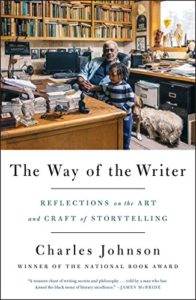 The Way of the Writer: Reflections on the Art and Craft of Storytelling Charles Johnson (Scribner) $16.00 I have a few friends who swear by this meaty book by an fiction writer who has won the prestigious National Book Award. And who has a degree in philosophy and has been a MacArthur Fellow. In 2002 Johnson received the Arts and Letters Award in Literature from the American Academy of Arts and Letters. James McBride – please tell me you know McBride — says about The Way of the Writer “A treasure chest of writing secrets and philosophy… told by a man who has kissed the black stone of literary excellence.”
The Way of the Writer: Reflections on the Art and Craft of Storytelling Charles Johnson (Scribner) $16.00 I have a few friends who swear by this meaty book by an fiction writer who has won the prestigious National Book Award. And who has a degree in philosophy and has been a MacArthur Fellow. In 2002 Johnson received the Arts and Letters Award in Literature from the American Academy of Arts and Letters. James McBride – please tell me you know McBride — says about The Way of the Writer “A treasure chest of writing secrets and philosophy… told by a man who has kissed the black stone of literary excellence.”
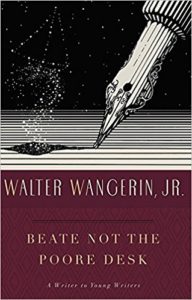 Beate Not the Poore Desk: A Writer to Young Writers Walter Wangerin, Jr. (The Rabbit Room) $14.95 Walt Wangerin is one of the great writers of our time, a Lutheran pastor, fantasy writer, children’s author, memoirist, devotional writer, Bible scholar, poet, and novelist. My, my, my. You should read anything he writes. Kudos to The Rabbit Room for offering this book where this National Book Award-winner “turns his keen eye upon the craft of writing.”
Beate Not the Poore Desk: A Writer to Young Writers Walter Wangerin, Jr. (The Rabbit Room) $14.95 Walt Wangerin is one of the great writers of our time, a Lutheran pastor, fantasy writer, children’s author, memoirist, devotional writer, Bible scholar, poet, and novelist. My, my, my. You should read anything he writes. Kudos to The Rabbit Room for offering this book where this National Book Award-winner “turns his keen eye upon the craft of writing.”
Rev. Wangerin shares some of his own foibles and missteps as a writer and a lot of his own story, actually. But much of this is very, very practical. I promise that if you are a young writer you will really value this short book. A nicely designed paperback, too, with French Flaps that fold over; well done!
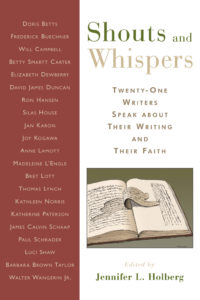 Shouts and Whispers: Twenty-One Writers Speak About Their Writing and Their Faith edited by Jennifer L. Holberg (Eerdmans) $18.99 This is the second marvelous book that more or less came out of the legendary, bi-annual Calvin Festival of Faith and Writing. Here you get remarkable, sometimes stunning, essays by excellent wordsmiths and storytellers such as Doris Betts, Frederick Buechner, Betty Smartt Carter, David James Duncan, Jan Karon, Joy Kogawa, Anne Lamott, Madeleine L’Engle, Brett Lott, Thomas Lynch, Katherine Paterson, Barbara Brown Taylor and more. Wow. Just wow. You need this.
Shouts and Whispers: Twenty-One Writers Speak About Their Writing and Their Faith edited by Jennifer L. Holberg (Eerdmans) $18.99 This is the second marvelous book that more or less came out of the legendary, bi-annual Calvin Festival of Faith and Writing. Here you get remarkable, sometimes stunning, essays by excellent wordsmiths and storytellers such as Doris Betts, Frederick Buechner, Betty Smartt Carter, David James Duncan, Jan Karon, Joy Kogawa, Anne Lamott, Madeleine L’Engle, Brett Lott, Thomas Lynch, Katherine Paterson, Barbara Brown Taylor and more. Wow. Just wow. You need this.
 Writers to Read: Nine Names That Belong On Your Bookshelf Douglas Wilson (Crossway) $16.99 Wilson is a bit curmudgeonly and an incredible wordsmith (he himself wrote Wordsmithy: Hot Tips for the Writing Life.) This asks, in a way, why certain writers are legendary, classic, enduring. And what it means to choose wise ones to emulate. Of course it is a truism, a classic adage, that to be a better writer one must read good writers. Did I say that in the ACFW Zoom presentation? I intended to, but it almost sounds too self-serving, bookseller that I am. But I’ll say it here, now. To be a good thinker, a good writer, a good reader – read!
Writers to Read: Nine Names That Belong On Your Bookshelf Douglas Wilson (Crossway) $16.99 Wilson is a bit curmudgeonly and an incredible wordsmith (he himself wrote Wordsmithy: Hot Tips for the Writing Life.) This asks, in a way, why certain writers are legendary, classic, enduring. And what it means to choose wise ones to emulate. Of course it is a truism, a classic adage, that to be a better writer one must read good writers. Did I say that in the ACFW Zoom presentation? I intended to, but it almost sounds too self-serving, bookseller that I am. But I’ll say it here, now. To be a good thinker, a good writer, a good reader – read!
Here in the fascinating and entertaining Writers to Read: Nine Names… the opinionated Wilson tells you why he commends Chesterton, Menchken, Wodehouse, Eliot, Tolkien, Lewis, Capon, Marilyn Robinson, and his son N.D. Wilson.
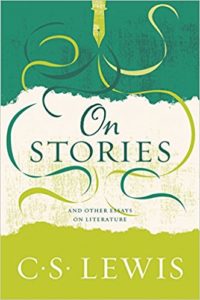 On Stories And Other Essays on Literature C.S. Lewis (HarperOne) $13.99 This wasn’t supposed to be a list of books about literature, about reading and criticism, but about creativity and writing. Nonetheless, we simply must list at least this one by the great master. There are some lovely and some haunting and some very important chapters in this handsome, small paperback. The lead essay, “On Stories,” is truly classic, as is his “On Three Ways of Writing for Children.” And I wonder what we should think about “The Death of Words”? While you’ve got your large cup of tea and are in a Lewisy mood, don’t forget his Of Other Worlds: Essays and Stories (HarperOne; $13.99.)
On Stories And Other Essays on Literature C.S. Lewis (HarperOne) $13.99 This wasn’t supposed to be a list of books about literature, about reading and criticism, but about creativity and writing. Nonetheless, we simply must list at least this one by the great master. There are some lovely and some haunting and some very important chapters in this handsome, small paperback. The lead essay, “On Stories,” is truly classic, as is his “On Three Ways of Writing for Children.” And I wonder what we should think about “The Death of Words”? While you’ve got your large cup of tea and are in a Lewisy mood, don’t forget his Of Other Worlds: Essays and Stories (HarperOne; $13.99.)
+++
STEVE GARBER ON TOM WOLFE AND GOOD STORIES
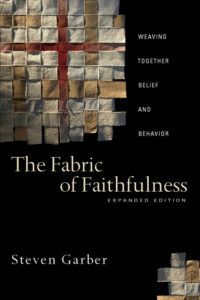
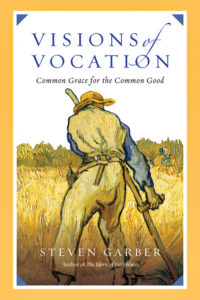 As I often do in presentations, I quote other authors (well there’s an understatement; I can almost hear my friends chuckling.) Quite regularly I quote or at least allude to Steve Garber. His Fabric of Faithfulness: Moving From Belief to Behavior (IVP; $19.00) is challenging but profound and such a great work; his Visions of Vocation: Common Grace for the Common Good (IVP; $17.00) remains one of my favorite books. In both exquisitely-written books he cites writers and novelists and artists. In Visions of Vocation Garber tells of an encounter with novelist Tom Wolfe (who was such a zesty non-fiction writer that he is credited with helping launch what is often called “the new journalism.”) When Wolfe died a week or two ago, Steve shared a tender piece on Facebook (that was somewhat similar to his telling in VoV.) It was too timely not to share.
As I often do in presentations, I quote other authors (well there’s an understatement; I can almost hear my friends chuckling.) Quite regularly I quote or at least allude to Steve Garber. His Fabric of Faithfulness: Moving From Belief to Behavior (IVP; $19.00) is challenging but profound and such a great work; his Visions of Vocation: Common Grace for the Common Good (IVP; $17.00) remains one of my favorite books. In both exquisitely-written books he cites writers and novelists and artists. In Visions of Vocation Garber tells of an encounter with novelist Tom Wolfe (who was such a zesty non-fiction writer that he is credited with helping launch what is often called “the new journalism.”) When Wolfe died a week or two ago, Steve shared a tender piece on Facebook (that was somewhat similar to his telling in VoV.) It was too timely not to share.
You see, I was inviting these Christian fiction writers not to be simplistic or preachy, to “tell it slant” and to – regardless of what the “inspirational market” wants – invite readers to grow up and into the truth of things as they really are. Southern Novelist Walker Percy famously talked about how bad books always lie and I proposed to these authors that they must tell the truth about this glorious, broken world of wonder, the good, the bad, the ugly. My friend Bill Mallonee, an Americana roots rocker, has an album called Slow Trauma and that gets at something very sad but true about life East of Eden. (Francis Schaeffer, decades ago, in his fine little book Art and the Bible talked about the minor and major themes of a Biblical worldview, sorrowful fallenness and hopeful redemption, and why we need both in honest art.) Art dare not be weighted with too much of a message or lesson lest it be mere propaganda; further, a cheap conversion episode that makes everything happy in the end is not good or true. And so, we must be careful with sentimental religiosity or cheap endings as if we have to shoe-horn some religious message into the story for it to be considered Christian enough.
But that does not mean that gifted writers dare not attempt to wisely plumb the very mysteries of Christian conversion. And so, as I invited these writers to work hard to become good enough writers to tell rich and nuanced and honest stories, I paraphrased what my friend Steve reported about his long conversation with Wolfe. Here, you can read it for yourself.
“I don’t finish my stories very well, do I?”
When I saw the news of Tom Wolfe’s death this morning, I immediately thought back to a conversation with him many years ago. We were at a small table in the Senator’s dining room of the U.S. Capitol, a politician, two journalists, and a professor, me always the professor at the table. And for a good hour and more we talked, asking questions about many things.
But along the way, I asked about his novel, “A Man in Full,” telling him that I had spent my week at the beach reading his story of “the last great white football player at Georgia Tech,” who had given his life to remaking the Atlanta skyline. Forty-plus years later he has become fabulously wealthy, with businesses all over America. It is a long book, and I won’t even try to summarize it here, only to say that I thought he “cheated” at the end. In the story he makes clear that Stoicism is not a sufficient answer for human beings who want to live into history, seeing and hearing and feeling the world. At a critical point in the book, he makes that dramatically clear. But then the last pages are given to a warmed-over Stoicism, as some kind of answer for being and becoming “a man in full.”
So, with the great American novelist at the table, I told him that I was drawn into the story until the very end…. and he looked at me, with honest eyes, “I don’t finish my novels very well, do I?”
We talked some more, and he said, “I thought of a Christian conversion, but that’s already been done.” Anyone who knows me knows that I do not require “a Christian conversion” to believe that someone has a written a good story. I am always willing to read a book that wrestles with the truth of the human condition. But I am also aware that some of the very best books we know— “Crime and Punishment” and “Les Miserables,” for example —have a Christian conversion at the heart of their stories. Raskolnikov and Jean Valjean are names for the ages because of the complexity of their characters, human beings torn between the glory and the ruin of the human heart— and on the pilgrimages of their lives as told by Dostoevsky and Hugo, we see them humbled before the God of heaven and earth, finding great grace.
When we finished the conversation, I wanted to take a long walk across the Capitol grounds, continuing to talk with Wolfe. There seemed an openness and tenderness, and I wanted to know more.
And now he knows more… Lord, be merciful to all of us.
BookNotes

SPECIAL
DISCOUNT
ANY ITEM MENTIONED
20% Off
this takes you to the secure Hearts & Minds order form page
just tell us what you want
if you have questions or need more information
just ask us what you want to know
Hearts & Minds 234 East Main Street Dallastown PA 17313
read@heartsandmindsbooks.com
717-246-3333
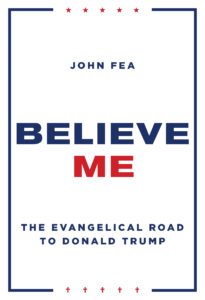
 We are glad Dr. Fea is coming to the shop on Friday night (August 10th at 7:00 pm) and we hope many will come to hear him talk about his new book, Believe Me: The Evangelical Road to Trump and chat together over refreshments as we ponder the nature of the intersection of faith and public life these days. Since he is such a passionate historian, I’m sure the conversation will be informative and interesting.
We are glad Dr. Fea is coming to the shop on Friday night (August 10th at 7:00 pm) and we hope many will come to hear him talk about his new book, Believe Me: The Evangelical Road to Trump and chat together over refreshments as we ponder the nature of the intersection of faith and public life these days. Since he is such a passionate historian, I’m sure the conversation will be informative and interesting.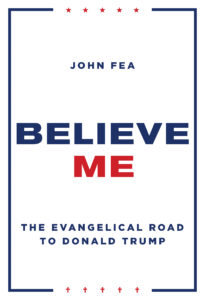 Believe Me: The Evangelical Road to Donald Trump (Eerdmans) $24.99 This, of course, is the new release that Dr. Fea has been researching for the last year or so. We are thrilled to have recommended it early on and appreciate Fea’s concern that many of the religious leaders who support President Trump are theologically muddled and that too many citizens are driven by concerns (fear? nostalgia?) that are not healthy or faithful. Regardless of your view of the religious right or the current President, this is a fine work, offering an evangelical historian’s assessment of these peculiar days in which we live.
Believe Me: The Evangelical Road to Donald Trump (Eerdmans) $24.99 This, of course, is the new release that Dr. Fea has been researching for the last year or so. We are thrilled to have recommended it early on and appreciate Fea’s concern that many of the religious leaders who support President Trump are theologically muddled and that too many citizens are driven by concerns (fear? nostalgia?) that are not healthy or faithful. Regardless of your view of the religious right or the current President, this is a fine work, offering an evangelical historian’s assessment of these peculiar days in which we live.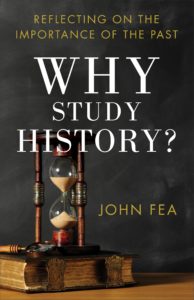 Why Study History?: Reflecting on the Importance of the Past (Baker Academic) $20.00 This slim volume is worth its weight in gold, ideal not only for history majors or younger students but for any of us that need reminded of the importance and value of the study of history. And my, oh my, we all need that reminder in this postmodern era that seems to glory only in the “right now.” That professor Fea brings a particularly Christian slant to his fine essay makes it that much more useful for many. What a great, great little book. Very highly recommended for one and all.
Why Study History?: Reflecting on the Importance of the Past (Baker Academic) $20.00 This slim volume is worth its weight in gold, ideal not only for history majors or younger students but for any of us that need reminded of the importance and value of the study of history. And my, oh my, we all need that reminder in this postmodern era that seems to glory only in the “right now.” That professor Fea brings a particularly Christian slant to his fine essay makes it that much more useful for many. What a great, great little book. Very highly recommended for one and all.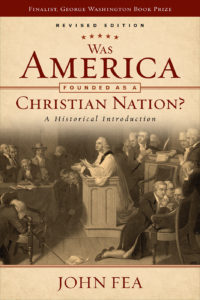 Was America Founded as a Christian Nation? An Historical Introduction (Westminster/John Knox) $30.00 This fabulous and important work was a finalist in the prestigious George Washington Book Prize and is considered by some to be the best (and most evenhanded, insightful) book on the question. It is one of Dr. Fea’s great accomplishments and is respected even by scholars who may have wished for a different emphasis here or there. It’s a live question, and an important matter, and is very highly recommended.
Was America Founded as a Christian Nation? An Historical Introduction (Westminster/John Knox) $30.00 This fabulous and important work was a finalist in the prestigious George Washington Book Prize and is considered by some to be the best (and most evenhanded, insightful) book on the question. It is one of Dr. Fea’s great accomplishments and is respected even by scholars who may have wished for a different emphasis here or there. It’s a live question, and an important matter, and is very highly recommended.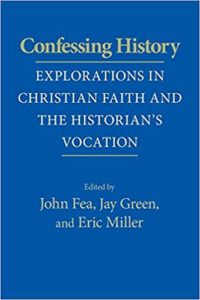 Confessing History: Explorations in Christian Faith and the Historian’s Vocation (University of Notre Dame Press) $40.00 This was co-edited by John with two other exceptional evangelical historians on the notion of the call to be a Christian scholar and professor and the nature of Christian historiography. In a way, Jay Green (of Covenant College) and Eric Miller (of Geneva College) and Fea (of Messiah College) and the others who contributed to this volume represent a newer generation of historians who were informed decisively by the groundbreaking work and reputation of the likes of Mark Noll, Nathan Hatch, and George Marsden.
Confessing History: Explorations in Christian Faith and the Historian’s Vocation (University of Notre Dame Press) $40.00 This was co-edited by John with two other exceptional evangelical historians on the notion of the call to be a Christian scholar and professor and the nature of Christian historiography. In a way, Jay Green (of Covenant College) and Eric Miller (of Geneva College) and Fea (of Messiah College) and the others who contributed to this volume represent a newer generation of historians who were informed decisively by the groundbreaking work and reputation of the likes of Mark Noll, Nathan Hatch, and George Marsden.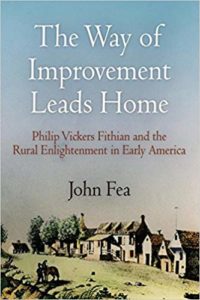 The Way of Improvement Leads Home: Philip Vickers Fithian and the Rural Enlightenment in Early America (University of Pennsylvania Press) $24.99 In this first full biography of Philip Vickers Fithian, John Fea tells the story of how one young man sought to pursue the life of an eighteenth-century Presbyterian gentleman while continuing to yearn for the everyday passions that defined what it meant for him to be human. What a fascinating study in early American experiences. I rhink rhia
The Way of Improvement Leads Home: Philip Vickers Fithian and the Rural Enlightenment in Early America (University of Pennsylvania Press) $24.99 In this first full biography of Philip Vickers Fithian, John Fea tells the story of how one young man sought to pursue the life of an eighteenth-century Presbyterian gentleman while continuing to yearn for the everyday passions that defined what it meant for him to be human. What a fascinating study in early American experiences. I rhink rhia

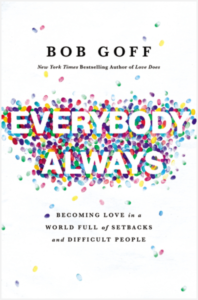 Everybody Always: Becoming Love in a World Full of Setbacks and Difficult People Bob Goff (Thomas Nelson Publishing) regularly $16.99; BOOK CLUB PRICE $13.59
Everybody Always: Becoming Love in a World Full of Setbacks and Difficult People Bob Goff (Thomas Nelson Publishing) regularly $16.99; BOOK CLUB PRICE $13.59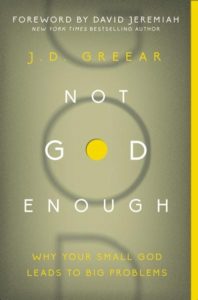 Not God Enough: Why Your Small God Leads to Big Problems J.D. Greear (Zondervan) regularly $16.99; BOOK CLUB PRICE $13.59
Not God Enough: Why Your Small God Leads to Big Problems J.D. Greear (Zondervan) regularly $16.99; BOOK CLUB PRICE $13.59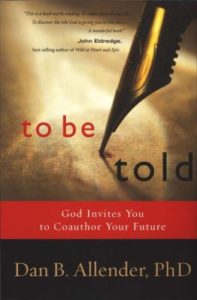 To Be Told: God Invites You to Coauthor Your Future Dan Allender (Waterbrook) regularly $15.99; BOOK CLUB PRICE $12.79
To Be Told: God Invites You to Coauthor Your Future Dan Allender (Waterbrook) regularly $15.99; BOOK CLUB PRICE $12.79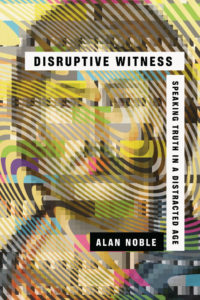 Disruptive Witness: Speaking Truth in an Age of Distraction Alan Noble (IVP) regular price $16.00; BOOK CLUB PRICE $12.80
Disruptive Witness: Speaking Truth in an Age of Distraction Alan Noble (IVP) regular price $16.00; BOOK CLUB PRICE $12.80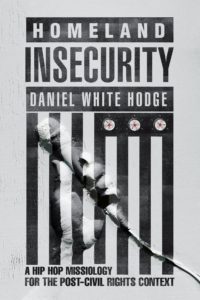 Homeland Insecurity: A Hip Hope Missiology for the Post-Civil Rights Context Daniel White Hodge (IVP Academic) regularly $27.00; BOOK CLUB PRICE $21.60
Homeland Insecurity: A Hip Hope Missiology for the Post-Civil Rights Context Daniel White Hodge (IVP Academic) regularly $27.00; BOOK CLUB PRICE $21.60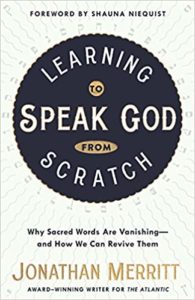 As you can tell from the title and important sub-title of his soon-to-be-released Learning to Speak God from Scratch:Why Sacred Words are Vanishing and How We Can Revive Them is exactly about how the meanings of ancient religious expressions and previously understood sacred terms are up for grabs in much of post-modern America. Heck, forget the hip and diverse postmodern enclaves of Brooklyn, RINO in Denver, Portlandia, or keeping it weird Austin, even in fairly white-bread, middle-American small towns the older religious consensus is long gone. We don’t have to rehearse here the contours of our post-Christian age (and will only give a quick shout-out about our BookNotes review a few weeks ago of the very thoughtful cultural study Disruptive Witness: Speaking Truth in a Distracted Age by Alan Noble.)
As you can tell from the title and important sub-title of his soon-to-be-released Learning to Speak God from Scratch:Why Sacred Words are Vanishing and How We Can Revive Them is exactly about how the meanings of ancient religious expressions and previously understood sacred terms are up for grabs in much of post-modern America. Heck, forget the hip and diverse postmodern enclaves of Brooklyn, RINO in Denver, Portlandia, or keeping it weird Austin, even in fairly white-bread, middle-American small towns the older religious consensus is long gone. We don’t have to rehearse here the contours of our post-Christian age (and will only give a quick shout-out about our BookNotes review a few weeks ago of the very thoughtful cultural study Disruptive Witness: Speaking Truth in a Distracted Age by Alan Noble.)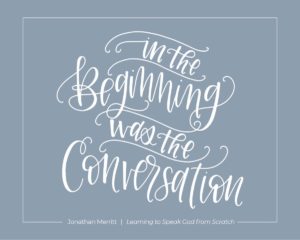 So, it’s complicated. Urgently so. And Jonathan uses his great gift as a storyteller (who has his fingers to the pulse of the generation John Seel calls “the New Copernicans”) to explore the conundrums of contemporary communication and guide us towards helpful ways to breathe new life into your spiritual conversations. Or to perhaps equip you with deeper confidence to have conversations about things that matter most.
So, it’s complicated. Urgently so. And Jonathan uses his great gift as a storyteller (who has his fingers to the pulse of the generation John Seel calls “the New Copernicans”) to explore the conundrums of contemporary communication and guide us towards helpful ways to breathe new life into your spiritual conversations. Or to perhaps equip you with deeper confidence to have conversations about things that matter most.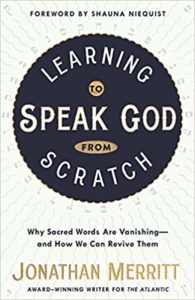
 Heron River: A Novel Hugh Cook (Mosaic Press) $16.00 Hugh Cook is a novelist who has been known in the Dutch Reformed faith communities of Ontario for quite some time; I used to read him in a magazine called Vanguard decades ago and he has often read or lectured at the popular and widely esteemed Calvin College Festival of Faith and Writing. (That should nearly settle it; to be involved in that bi-annual event is a great marker for faith-informed writers. It is its own kind of recommendation.) Cook is a vivid writer and a great storyteller (and, I happen to know, a voracious reader of excellent literature, from Flannery O’Conner to Kent Haruf.) One of his previous novels earned a regional award in Canada and another has been adapted for the stage. He is Canadian writer that I wish was better known in the States.
Heron River: A Novel Hugh Cook (Mosaic Press) $16.00 Hugh Cook is a novelist who has been known in the Dutch Reformed faith communities of Ontario for quite some time; I used to read him in a magazine called Vanguard decades ago and he has often read or lectured at the popular and widely esteemed Calvin College Festival of Faith and Writing. (That should nearly settle it; to be involved in that bi-annual event is a great marker for faith-informed writers. It is its own kind of recommendation.) Cook is a vivid writer and a great storyteller (and, I happen to know, a voracious reader of excellent literature, from Flannery O’Conner to Kent Haruf.) One of his previous novels earned a regional award in Canada and another has been adapted for the stage. He is Canadian writer that I wish was better known in the States.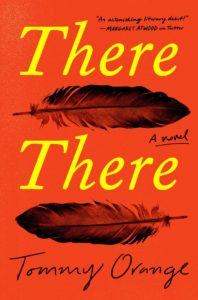 There There: A Novel Tommy Orange (Knopf) $25.95 This is a complex novel comprised of many interlocking characters who are all urban Native peoples (and it, too, for the record, has characters who use the F word a lot.) So much of contemporary fiction about American Indians is set on the rez and There There breaks new ground, set in the rough streets of inner city Oakland CA. It is vulgar and written with, as one reviewer put it, “A rush of intensity and fervor… bursting with talent and big ideas… Funny and profane and conscious of the violence that runs like a scar thorough American culture.” Ron Charles calls is “Masterful… White-hot. A devastating debut novel.” It has been described in extraordinary ways; Margaret Atwood says it is “astonishing” and Dwight Garner in the New York Times writes of his “Bravura… There There has so much jangling energy and brings so much news from a distinct corner of American life that it’s a revelation. Its appearance marks the passing of a generational baton.”
There There: A Novel Tommy Orange (Knopf) $25.95 This is a complex novel comprised of many interlocking characters who are all urban Native peoples (and it, too, for the record, has characters who use the F word a lot.) So much of contemporary fiction about American Indians is set on the rez and There There breaks new ground, set in the rough streets of inner city Oakland CA. It is vulgar and written with, as one reviewer put it, “A rush of intensity and fervor… bursting with talent and big ideas… Funny and profane and conscious of the violence that runs like a scar thorough American culture.” Ron Charles calls is “Masterful… White-hot. A devastating debut novel.” It has been described in extraordinary ways; Margaret Atwood says it is “astonishing” and Dwight Garner in the New York Times writes of his “Bravura… There There has so much jangling energy and brings so much news from a distinct corner of American life that it’s a revelation. Its appearance marks the passing of a generational baton.”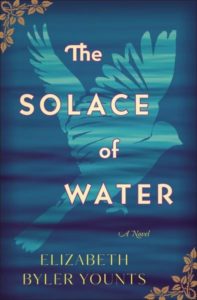 The Solace of Water: A Novel Elizabeth Byler Younts (Thomas Nelson) $15.99 Several of our staff have just adored this fascinating story that gives a very thoughtful and unexpected twist on the “Amish” fiction genre. Younts lives in Central Pennsylvania and the novel is set in the 1950s in a rural community in Pennsylvania. The well-written plot revolves around two women in great grief – an African American woman who has moved North from the Jim Crow South and a local Amish woman. They initially bond over their losses – both have lost children (and in one case, water was involved.) The author believes that it is “eminently relevant to the beauty and struggle in America today.” What a lovely, thoughtful, serious and eloquent book – Beth was very taken with it and has been telling others!
The Solace of Water: A Novel Elizabeth Byler Younts (Thomas Nelson) $15.99 Several of our staff have just adored this fascinating story that gives a very thoughtful and unexpected twist on the “Amish” fiction genre. Younts lives in Central Pennsylvania and the novel is set in the 1950s in a rural community in Pennsylvania. The well-written plot revolves around two women in great grief – an African American woman who has moved North from the Jim Crow South and a local Amish woman. They initially bond over their losses – both have lost children (and in one case, water was involved.) The author believes that it is “eminently relevant to the beauty and struggle in America today.” What a lovely, thoughtful, serious and eloquent book – Beth was very taken with it and has been telling others!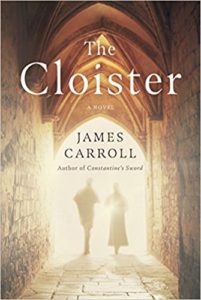 The Cloister: A Novel James Carroll (Nan Talese/Doubleday) $27.95 You may know Carroll as a left-wing Catholic who has written widely about mendacity and complicity and corrupt money in our public lives. He has called the church to greater commitments to integrity and justice. He also, by the way, wrote one of the most moving memoirs I have ever read, An American Requiem: God, My Father, and the War That Came Between Us for which he won the American Book Award in 1996. (That book, by the way, eloquently tells of his increasing involvement in the anti-Viet Nam war movement even as his father was a strategist for the war at the Pentagon and family friends with President Johnson’s family. It is one of the important books in my life and my dad and I talked about it deeply.) The Cloister is Mr. Carroll’s first novel and it is a modern-day re-working of the famous medieval illicit love story of Aberlard and Heloise – set in the The Cloisters in New York City. (Ha – bet you didn’t see that coming.) Nicholas Delbanco says it is “wonder-filled” and another reviewer says it is an “enlightening, vitally important book, a necessity for our time.” There are overlapping narrative arcs (the lovers are a Catholic priest and a French Jewish woman) as the story moves from the Nazi holocaust to the Crusades to the “startling mysteries of prejudice, brutality, and love.” One writer compared it to All the Light We Cannot See and another says, “like all the best fiction, it commandeers the reader’s heart.” I am really looking forward to it.
The Cloister: A Novel James Carroll (Nan Talese/Doubleday) $27.95 You may know Carroll as a left-wing Catholic who has written widely about mendacity and complicity and corrupt money in our public lives. He has called the church to greater commitments to integrity and justice. He also, by the way, wrote one of the most moving memoirs I have ever read, An American Requiem: God, My Father, and the War That Came Between Us for which he won the American Book Award in 1996. (That book, by the way, eloquently tells of his increasing involvement in the anti-Viet Nam war movement even as his father was a strategist for the war at the Pentagon and family friends with President Johnson’s family. It is one of the important books in my life and my dad and I talked about it deeply.) The Cloister is Mr. Carroll’s first novel and it is a modern-day re-working of the famous medieval illicit love story of Aberlard and Heloise – set in the The Cloisters in New York City. (Ha – bet you didn’t see that coming.) Nicholas Delbanco says it is “wonder-filled” and another reviewer says it is an “enlightening, vitally important book, a necessity for our time.” There are overlapping narrative arcs (the lovers are a Catholic priest and a French Jewish woman) as the story moves from the Nazi holocaust to the Crusades to the “startling mysteries of prejudice, brutality, and love.” One writer compared it to All the Light We Cannot See and another says, “like all the best fiction, it commandeers the reader’s heart.” I am really looking forward to it.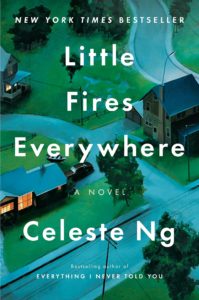
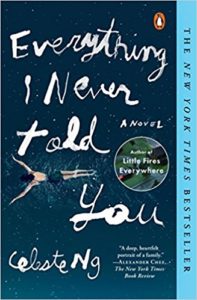 Everything I Never Told You Celeste Ng (Penguin) $16.00 Beth tell us that in her opinion Everything… is even better than the excellent Little Fires Everywhere. Again, it is a deep and heartfelt portrait of a family. Full of pathos about the mysterious death of a teen, it might be compared to The Lovely Bones The Los Angeles Review of Books noted that “Ng moves gracefully… creating a series of mysteries and revelations that lead back to the original question: what happened to Lydia. Masterful.” It is “wonderfully moving, a beautifully crafted study of dysfunction and grief that will resonate with anyone who has ever had a family drama.” A thoughtful and passionate Christian friend who is Asian American and speaks of the challenges of growing up as a minority in these times quipped once that folks should read this because “it explains everything.”
Everything I Never Told You Celeste Ng (Penguin) $16.00 Beth tell us that in her opinion Everything… is even better than the excellent Little Fires Everywhere. Again, it is a deep and heartfelt portrait of a family. Full of pathos about the mysterious death of a teen, it might be compared to The Lovely Bones The Los Angeles Review of Books noted that “Ng moves gracefully… creating a series of mysteries and revelations that lead back to the original question: what happened to Lydia. Masterful.” It is “wonderfully moving, a beautifully crafted study of dysfunction and grief that will resonate with anyone who has ever had a family drama.” A thoughtful and passionate Christian friend who is Asian American and speaks of the challenges of growing up as a minority in these times quipped once that folks should read this because “it explains everything.”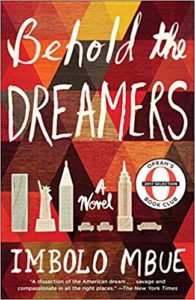
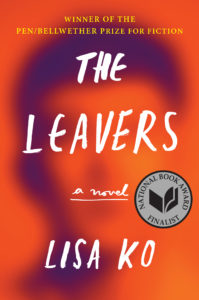 The Leavers Lisa Ko (Algonquin) $15.95 This remarkable book is beautifully written and ambitious and was a just deserved National Book Award Finalist. It also won the PEN award and the Bellwether Prize for Fiction which was created by Barbara Kingsolver for socially conscious novels. (Aside: we are taking pre-orders for the much-anticipated Barbara Kingsolver novel called Unsheltered which releases October 16.)
The Leavers Lisa Ko (Algonquin) $15.95 This remarkable book is beautifully written and ambitious and was a just deserved National Book Award Finalist. It also won the PEN award and the Bellwether Prize for Fiction which was created by Barbara Kingsolver for socially conscious novels. (Aside: we are taking pre-orders for the much-anticipated Barbara Kingsolver novel called Unsheltered which releases October 16.)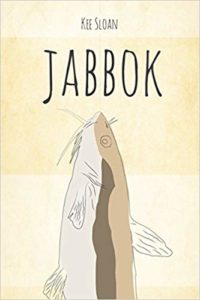 Jabbok and Beulah: A Sequel to Jabbok Kee Sloan (Peake Road/Mercer University Press) $18.99 each Sometimes we discover lesser known sources for good books, publishers of independent spirit but high quality. University Presses are usually brilliant, but often price themselves out of the market, so to speak, or are just too scholarly or obscure. Here are two very fine, very accessible novels published by the literary imprint of Mercer University Press; I bet you’ve never heard of them. They are, as you might expect from a publisher in Macon Georgia, rooted in deep Southern culture, and they are a genuine delight. In the first book, Jabbok, Buddy Hinton, a young boy who lives in the country outside of Vicksburg Mississippi, meets Jake,
Jabbok and Beulah: A Sequel to Jabbok Kee Sloan (Peake Road/Mercer University Press) $18.99 each Sometimes we discover lesser known sources for good books, publishers of independent spirit but high quality. University Presses are usually brilliant, but often price themselves out of the market, so to speak, or are just too scholarly or obscure. Here are two very fine, very accessible novels published by the literary imprint of Mercer University Press; I bet you’ve never heard of them. They are, as you might expect from a publisher in Macon Georgia, rooted in deep Southern culture, and they are a genuine delight. In the first book, Jabbok, Buddy Hinton, a young boy who lives in the country outside of Vicksburg Mississippi, meets Jake,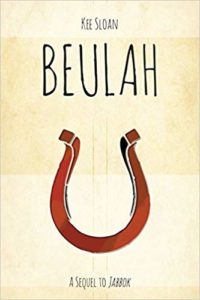 an older, black fisherman, ex-convict, former tent preacher – and their friendship deepens. It captures the late 50s boyhood of the south (including a serious lot about racism and other sorrows.) I think you will be hooked by the first sentence and the first moving paragraph of the Prelude.
an older, black fisherman, ex-convict, former tent preacher – and their friendship deepens. It captures the late 50s boyhood of the south (including a serious lot about racism and other sorrows.) I think you will be hooked by the first sentence and the first moving paragraph of the Prelude.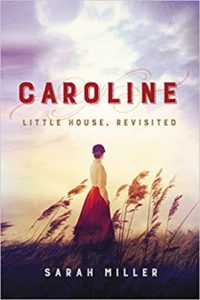 Caroline: Little House, Revisited Sarah Miller (William Morrow) $15.99 We announced this when it was out in hardback and we’re glad it’s now in a more affordable paperback edition. Beth adored it, but not everyone will, we suppose. It is, in fact, an imaginative re-telling of the Little House stories from the point of view of Ma. Isn’t that a great idea? It is impeccably researched and was authorized by Little House Heritage Trust and is very well done.
Caroline: Little House, Revisited Sarah Miller (William Morrow) $15.99 We announced this when it was out in hardback and we’re glad it’s now in a more affordable paperback edition. Beth adored it, but not everyone will, we suppose. It is, in fact, an imaginative re-telling of the Little House stories from the point of view of Ma. Isn’t that a great idea? It is impeccably researched and was authorized by Little House Heritage Trust and is very well done.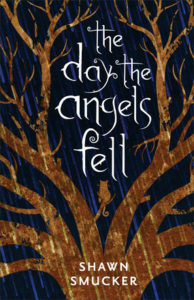 The Day the Angels Fell and The Edge of Over There Shawn Smucker (Revell) $17.99 We wanted to suggest at least something in the “speculative fiction” genre and for those that like fantasy – and have already finished the must-read Steve Lawhead, In the Region of the Summer Stars, Book One of the Eirlandia series) – these two are among the best of the year. Shawn is a well-respected writer and a great guy.
The Day the Angels Fell and The Edge of Over There Shawn Smucker (Revell) $17.99 We wanted to suggest at least something in the “speculative fiction” genre and for those that like fantasy – and have already finished the must-read Steve Lawhead, In the Region of the Summer Stars, Book One of the Eirlandia series) – these two are among the best of the year. Shawn is a well-respected writer and a great guy.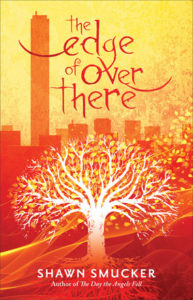 The new one, The Edge of Over There, is just out (in a fantastic hardback design for $17.99), a fine sequel that itself has gotten good reviews. Here’s the official summary:
The new one, The Edge of Over There, is just out (in a fantastic hardback design for $17.99), a fine sequel that itself has gotten good reviews. Here’s the official summary: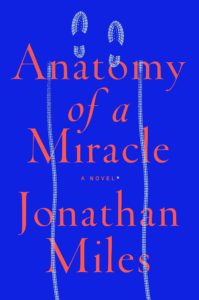 Anatomy of a Miracle: A Novel* Jonathan Miles (Hogarth $27.00 I hope you know this fascinating, talented author who has been widely reviewed and critically acclaimed. I gave a shout out about how intriguing this book was before I read it and now that I’ve spent many pleasurable days immersed in its captivating story I can say it is one of my favorite books of the year. Miles has always been a social critic who seems familiar with questions of faith and religion. (See his acclaimed Dear American Airlines and especially Want Not.) This recent novel is equally rich in themes that matter.
Anatomy of a Miracle: A Novel* Jonathan Miles (Hogarth $27.00 I hope you know this fascinating, talented author who has been widely reviewed and critically acclaimed. I gave a shout out about how intriguing this book was before I read it and now that I’ve spent many pleasurable days immersed in its captivating story I can say it is one of my favorite books of the year. Miles has always been a social critic who seems familiar with questions of faith and religion. (See his acclaimed Dear American Airlines and especially Want Not.) This recent novel is equally rich in themes that matter. A month or more ago at BookNotes
A month or more ago at BookNotes 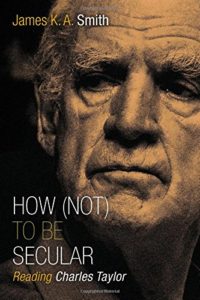 As James K.A. Smith in his brilliant How (Not) to Be Secular: Reading Charles Taylor (Eerdmans; $16.00) explains, the world-class Canadian philosopher Charles Taylor has written profoundly and deeply to show us how the tensions of the modern age and the secularism that it has brought has rendered much of our lives in our era, not to mention our religious sensibilities, shallow, contradictory, and confused. Like the frog in the kettle accommodated to the rising temperatures, we don’t even realize the mess we’re in.
As James K.A. Smith in his brilliant How (Not) to Be Secular: Reading Charles Taylor (Eerdmans; $16.00) explains, the world-class Canadian philosopher Charles Taylor has written profoundly and deeply to show us how the tensions of the modern age and the secularism that it has brought has rendered much of our lives in our era, not to mention our religious sensibilities, shallow, contradictory, and confused. Like the frog in the kettle accommodated to the rising temperatures, we don’t even realize the mess we’re in.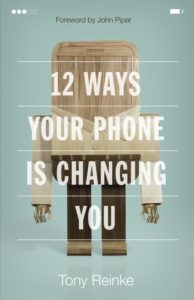
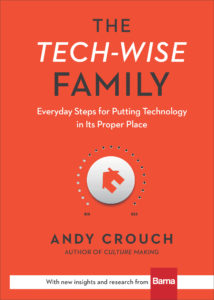 Add to this Noble’s considerable awareness of and candor about how many of us are nearly addicted to our smart phones – I laughed when he says he even uses it in the bathroom – and how literally distracted we are with the beeps and buzzes and notices from our ubiquitous devices. There are many books about this these days, from the practical 12 Ways Your Cell Phone Has Changed You by Tony Reinke to Andy Crouch’s wonderful Tech Wise Family: Everyday Steps for Putting Technology in Its Proper Place to the serious Distracted: The Erosion of Attention in the Coming Dark Age by Maggie Jackson and it is good that Noble plumbs some of the implications of electronic distraction. We all know this is really, really important, but few of us study it, let alone do much about it. I like how Alan calls us to the simple (well, not so simple, after all) task of silence and solitude so we can contemplate and wrestle with ideas. How can we do that when we are so busy, so saturated by constant connection with content, or just “move on” to the next curious thing? Watch
Add to this Noble’s considerable awareness of and candor about how many of us are nearly addicted to our smart phones – I laughed when he says he even uses it in the bathroom – and how literally distracted we are with the beeps and buzzes and notices from our ubiquitous devices. There are many books about this these days, from the practical 12 Ways Your Cell Phone Has Changed You by Tony Reinke to Andy Crouch’s wonderful Tech Wise Family: Everyday Steps for Putting Technology in Its Proper Place to the serious Distracted: The Erosion of Attention in the Coming Dark Age by Maggie Jackson and it is good that Noble plumbs some of the implications of electronic distraction. We all know this is really, really important, but few of us study it, let alone do much about it. I like how Alan calls us to the simple (well, not so simple, after all) task of silence and solitude so we can contemplate and wrestle with ideas. How can we do that when we are so busy, so saturated by constant connection with content, or just “move on” to the next curious thing? Watch  The second half of this ambitious book offers three large meditations on strategies we can use to resist, to disrupt, the distraction and secularizing ethos of our times. To make a way through the noise towards the fullness of life. He offers deep, philosophical notions and then backs them up with theological insights and proposes ordinary practices that emerge from his own efforts and stories. In a way, this is the biggest strategy of all – we simply must be more attentive to the real, the down to Earth, nurturing virtue by way of daily practices. We have to do stuff well, and show how it points beyond ourselves to the God who is there, in a world that is loved. How do we become agents of that kind of disruption?
The second half of this ambitious book offers three large meditations on strategies we can use to resist, to disrupt, the distraction and secularizing ethos of our times. To make a way through the noise towards the fullness of life. He offers deep, philosophical notions and then backs them up with theological insights and proposes ordinary practices that emerge from his own efforts and stories. In a way, this is the biggest strategy of all – we simply must be more attentive to the real, the down to Earth, nurturing virtue by way of daily practices. We have to do stuff well, and show how it points beyond ourselves to the God who is there, in a world that is loved. How do we become agents of that kind of disruption?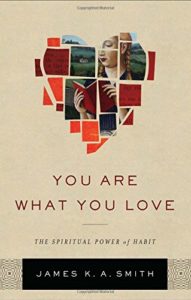
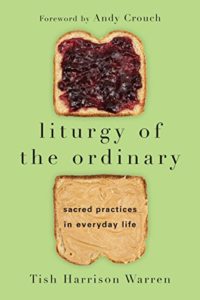 In a way, this approach is very much like what James K.A. Smith does in the urgent You Are What You Love: The Spiritual Power of Habit and what Tish Harrison Warren does in her lovely Liturgy of the Ordinary: Sacred Practices in Everyday Life. This book is a bit more dense than those, but if you’ve read those, this maybe should come next.
In a way, this approach is very much like what James K.A. Smith does in the urgent You Are What You Love: The Spiritual Power of Habit and what Tish Harrison Warren does in her lovely Liturgy of the Ordinary: Sacred Practices in Everyday Life. This book is a bit more dense than those, but if you’ve read those, this maybe should come next.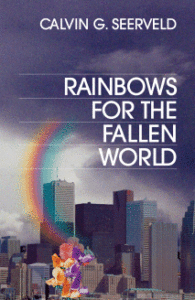 sold to him.) That is, there is a creative/artistic side to our human experience and the use of our imaginations – so often captured by popular tastes and popular culture – need to be redeemed and deepened so that we can be more colorful and curious. I hardly know any book – even those that are written about aesthetics and the arts – that draws on Seerveld’s Rainbows as much as one of the chapters in this book does. Noble is wise to show that this imaginative way of living with greater attention to the arts and daily aesthetics helps us take in more of life as we should, but also to bear witness to God’s hopeful, richly human, wholesome ways in this world. Noble’s part about beauty is very, very nicely done.
sold to him.) That is, there is a creative/artistic side to our human experience and the use of our imaginations – so often captured by popular tastes and popular culture – need to be redeemed and deepened so that we can be more colorful and curious. I hardly know any book – even those that are written about aesthetics and the arts – that draws on Seerveld’s Rainbows as much as one of the chapters in this book does. Noble is wise to show that this imaginative way of living with greater attention to the arts and daily aesthetics helps us take in more of life as we should, but also to bear witness to God’s hopeful, richly human, wholesome ways in this world. Noble’s part about beauty is very, very nicely done.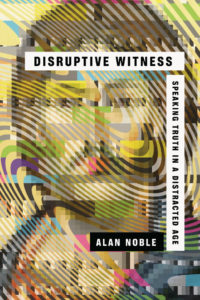 And so, we are thrilled to once again commend to you a serious summer read, a book of cultural analysis and deft critique of the forces of modernity and post-modernity, that, while slogging through some serious stuff, is still loaded with brilliant ideas and practical suggestions. We commend this book to help you and yours thinking intentionally about the nature of our witness in this hot-wired, saturated age.
And so, we are thrilled to once again commend to you a serious summer read, a book of cultural analysis and deft critique of the forces of modernity and post-modernity, that, while slogging through some serious stuff, is still loaded with brilliant ideas and practical suggestions. We commend this book to help you and yours thinking intentionally about the nature of our witness in this hot-wired, saturated age.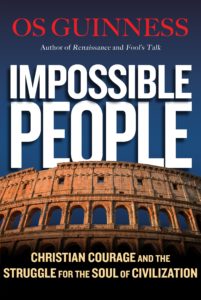 Impossible People: Christian Courage and the Struggle for the Soul of Civilization Os Guinness (IVP) $20.00 I have said before that this is a great way to understand our modern and postmodern era; it is a one-volume lesson in discerning and urgent cultural analysis. The always incisive Guinness (with his PhD degree studying the work of sociologist Peter Berger) brings out many of the themes he has explored before – how, just for instance, speed and choice and change have disrupted traditional ways of knowing and believing. He shows how modernity itself has eroded the very notion of authority. Of course he explores how we in the evangelical churches, especially, have too often attempted to link the gospel to marketing, the growth of technology, and such. Have these things come back to haunt us? Have forces we’ve too often ignored actually displaced our first love of the gospel itself? What will it take to be bold, principled, people who will rise up and say no to unfaithful compromise and unhelpful patterns? I have written before in greater detail why I think this is a very important book, sounding an alarm as it does, and read it now would be a another way to understand the need for what Noble calls “disruptive practices” in our personal, church, and cultural lives. If you’re reading Alan Noble, you should (seriously) buy this, too!
Impossible People: Christian Courage and the Struggle for the Soul of Civilization Os Guinness (IVP) $20.00 I have said before that this is a great way to understand our modern and postmodern era; it is a one-volume lesson in discerning and urgent cultural analysis. The always incisive Guinness (with his PhD degree studying the work of sociologist Peter Berger) brings out many of the themes he has explored before – how, just for instance, speed and choice and change have disrupted traditional ways of knowing and believing. He shows how modernity itself has eroded the very notion of authority. Of course he explores how we in the evangelical churches, especially, have too often attempted to link the gospel to marketing, the growth of technology, and such. Have these things come back to haunt us? Have forces we’ve too often ignored actually displaced our first love of the gospel itself? What will it take to be bold, principled, people who will rise up and say no to unfaithful compromise and unhelpful patterns? I have written before in greater detail why I think this is a very important book, sounding an alarm as it does, and read it now would be a another way to understand the need for what Noble calls “disruptive practices” in our personal, church, and cultural lives. If you’re reading Alan Noble, you should (seriously) buy this, too!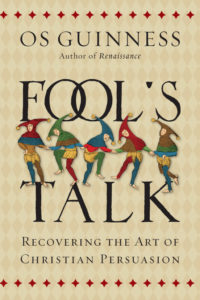 Fool’s Talk: Recovering the Art of Christian Persuasion Os Guinness (IVP) $22.00 This is a remarkable, one-of-a-kind study which we raved about here at BookNotes when it came out in 2015. Considered by some a magnum opus, it was 40 years in the making, drawing on broad and historically informed cultural studies, incisive insights about apologetics, and a mash-up of three of Guinness’s most decisive influences – C.S. Lewis, Francis Schaeffer, and Peter Berger. Granted, as Alan Noble explains (and as Os himself admits) the times are complex, the ideas and the structures and habits of culture often a large obstacle, but we can still learn how best to persuade. There is an art to learning these ways of persuasion, and Guinness has thought about this for a lifetime. Highly recommended. (By the way, just a parenthetical shout out, here: we expect any day his brand new revised and expanded 20th anniversary edition of The Call: Finding and Fulfilling Your Greatest Purpose, which remains one of my all time favorite books.)
Fool’s Talk: Recovering the Art of Christian Persuasion Os Guinness (IVP) $22.00 This is a remarkable, one-of-a-kind study which we raved about here at BookNotes when it came out in 2015. Considered by some a magnum opus, it was 40 years in the making, drawing on broad and historically informed cultural studies, incisive insights about apologetics, and a mash-up of three of Guinness’s most decisive influences – C.S. Lewis, Francis Schaeffer, and Peter Berger. Granted, as Alan Noble explains (and as Os himself admits) the times are complex, the ideas and the structures and habits of culture often a large obstacle, but we can still learn how best to persuade. There is an art to learning these ways of persuasion, and Guinness has thought about this for a lifetime. Highly recommended. (By the way, just a parenthetical shout out, here: we expect any day his brand new revised and expanded 20th anniversary edition of The Call: Finding and Fulfilling Your Greatest Purpose, which remains one of my all time favorite books.)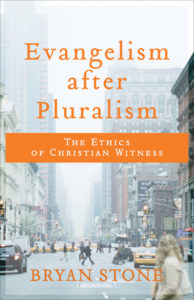 Evangelism After Pluralism: The Ethics of Christian Witness Bryan Stone (Baker Academic) $21.99 We have oodles of books about how better to share one’s faith and wish we sold more Despite the good and helpful social analysis offering in books like the Alan Noble (above) we still need to keep trying to talk face to face to people about things that matter most This remarkable volume, though, is less a practical “how to” do better evangelism, but a rich and deep study of — as Noble asks — how to even think about evangelism given what we know about communication in “the secular age” and the buffered nature of our selves. Stone has read his Taylor and any other deep cultural critics and he has drunk wisely from the wells of some of our best mainline denominational thinkers — from George Lindbeck to Rowan Williams to Lamin Sanneh to Kathyrn Tanner. I like his counter-cultural posture (citing early church fathers and mothers and modern radical saints like Dorothy Day.) He cites my hero Ron Sider and asks seriously what embodied Christian witness looks like in an era such as ours. Stone is associate dean for academic affairs and E. Stanley Jones Professor of Evangelism at the Boston University School of Theology. You may recall his book Evangelism After Christendom, which also would be a good, serious read for those exploring foundational stuff about worldviews and culture and sharing the gospel well. For what it is worth, not surprisingly, Evangelism After Pluralism has rave reviews on the back from Will Willimon and Stanley Hauerwas as well as rising scholars such as Joon-Sik Park (of Methodist Theological School in Ohio) and Duke’s Laceye Warner, who calls it a “must-read.”
Evangelism After Pluralism: The Ethics of Christian Witness Bryan Stone (Baker Academic) $21.99 We have oodles of books about how better to share one’s faith and wish we sold more Despite the good and helpful social analysis offering in books like the Alan Noble (above) we still need to keep trying to talk face to face to people about things that matter most This remarkable volume, though, is less a practical “how to” do better evangelism, but a rich and deep study of — as Noble asks — how to even think about evangelism given what we know about communication in “the secular age” and the buffered nature of our selves. Stone has read his Taylor and any other deep cultural critics and he has drunk wisely from the wells of some of our best mainline denominational thinkers — from George Lindbeck to Rowan Williams to Lamin Sanneh to Kathyrn Tanner. I like his counter-cultural posture (citing early church fathers and mothers and modern radical saints like Dorothy Day.) He cites my hero Ron Sider and asks seriously what embodied Christian witness looks like in an era such as ours. Stone is associate dean for academic affairs and E. Stanley Jones Professor of Evangelism at the Boston University School of Theology. You may recall his book Evangelism After Christendom, which also would be a good, serious read for those exploring foundational stuff about worldviews and culture and sharing the gospel well. For what it is worth, not surprisingly, Evangelism After Pluralism has rave reviews on the back from Will Willimon and Stanley Hauerwas as well as rising scholars such as Joon-Sik Park (of Methodist Theological School in Ohio) and Duke’s Laceye Warner, who calls it a “must-read.”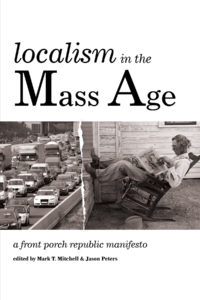 Localism in a Mass Age: A Front Porch Republic Manifesto edited by Mark T. Mitchell & Jason Peters (Front Porch Republic Books) $32.00 This fabulously interesting and curious collection takes more time than I’ve got here, now, to explain. In a sense, the title evokes much – the “front porch republic” is a movement that is, mostly, localist and conservative. (That is, they want to conserve, so they tend to be cranky about suburban sprawl and big Wal Marts and global wars and utopian dreams.) Although Wendell Berry isn’t in here, his spirit hovers near several of the chapters.
Localism in a Mass Age: A Front Porch Republic Manifesto edited by Mark T. Mitchell & Jason Peters (Front Porch Republic Books) $32.00 This fabulously interesting and curious collection takes more time than I’ve got here, now, to explain. In a sense, the title evokes much – the “front porch republic” is a movement that is, mostly, localist and conservative. (That is, they want to conserve, so they tend to be cranky about suburban sprawl and big Wal Marts and global wars and utopian dreams.) Although Wendell Berry isn’t in here, his spirit hovers near several of the chapters.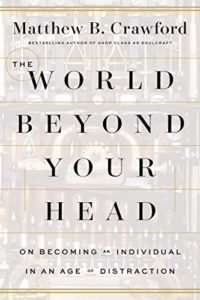 The World Beyond Your Head: On Becoming an Individual in an Age of Distraction Matthew Crawford (Farrar, Straus, Giroux) $16.00 From time to time I enjoy reminding people about Crawford’s first big book, Shop Class as Soul Craft which was, although a bit heady, a call to rediscover the joys of working with one’s hands, of his own departure from a white collar think-tank to starting his own motorcycle repair shop. What do we lose when we gush about the information age or digital culture and defund shop classes and trade schools? The World Beyond Your Head continues these questions, offering more vintage Crawford, investigating the challenging of mastering crafts and how some workers have done well in taking up their jobs as vocations. Of course, as with Noble, is has the word “distraction” in the title, although he may be reflecting a bit more deeply than Noble on kinds of distractions we encounter. The World Beyond Your Head is in a way a study about digital culture vs. “real world” work and how abstraction messes with our minds. Does learning to pay attention to and have focus upon our bodies (by way of manual work) have anything to do with Alan Noble’s “disruption” challenges in his Disruptive Witness: Speaking the Truth in a Distracted Age? What role does embodiment play in Noble’s vision? How about a dose of Crawford, here, who says, “attention sculpts the self”? Do you recall that quotable line from James K.A. Smith when he insists that “the things we do, do things to us”? Do you know Nicholas Carr’s elegant but alarming books The Shallows: What the Internet is Doing to Our Brains and The Glass Cage: How Our Computers Are Changing Us? Noble is truly concerned about this stuff and I wish he’d have engaged Matthew Crawford as a conversation partner.
The World Beyond Your Head: On Becoming an Individual in an Age of Distraction Matthew Crawford (Farrar, Straus, Giroux) $16.00 From time to time I enjoy reminding people about Crawford’s first big book, Shop Class as Soul Craft which was, although a bit heady, a call to rediscover the joys of working with one’s hands, of his own departure from a white collar think-tank to starting his own motorcycle repair shop. What do we lose when we gush about the information age or digital culture and defund shop classes and trade schools? The World Beyond Your Head continues these questions, offering more vintage Crawford, investigating the challenging of mastering crafts and how some workers have done well in taking up their jobs as vocations. Of course, as with Noble, is has the word “distraction” in the title, although he may be reflecting a bit more deeply than Noble on kinds of distractions we encounter. The World Beyond Your Head is in a way a study about digital culture vs. “real world” work and how abstraction messes with our minds. Does learning to pay attention to and have focus upon our bodies (by way of manual work) have anything to do with Alan Noble’s “disruption” challenges in his Disruptive Witness: Speaking the Truth in a Distracted Age? What role does embodiment play in Noble’s vision? How about a dose of Crawford, here, who says, “attention sculpts the self”? Do you recall that quotable line from James K.A. Smith when he insists that “the things we do, do things to us”? Do you know Nicholas Carr’s elegant but alarming books The Shallows: What the Internet is Doing to Our Brains and The Glass Cage: How Our Computers Are Changing Us? Noble is truly concerned about this stuff and I wish he’d have engaged Matthew Crawford as a conversation partner.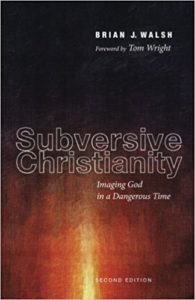 Subversive Christianity: Imaging God in a Dangerous Time Brian Walsh (Wipf & Stock) $17.00 I know you know that I regularly suggest reading Walsh. From his early The Transforming Vision and Truth Is Stranger Than It Used to Be (co-authored with Richard Middleton) to a deep study of place and mobility (Beyond Homelessness: Christian Faith in a Culture of Displacement, co-authored with Steven Bouma-Prediger) through his study of Bruce Cockburn as a way to think about imagination and the arts, to the Wine Without Breakfast Bible studies and worship litanies (St. John Before Breakfast and Habakkuk Before Breakfast) to his must-read Colossians Remixed: Subverting the Empire (co-authored with his Biblical scholar/organic farmer and bio-regional activist wife, Sylvia Keesmaat) we see over and over in his work a deeply Biblical world and life vision that necessarily says no to the dysfunctional ways of the culture (and the powers that be) when they are in opposition to a Biblically-informed vision of flourishing, gracious love and justice, and care for all of creation. Walsh preaches the Bible with breathtaking adeptness, hearing the echoes and connecting the dots and knows economics and philosophy; he writes about the arts and ancient archeology; he knows homeless folks and hangs out with the marginalized even when he’s writing chapters in books about or with other Biblical scholars (such as his friend N.T. Wright.) Brian is in many ways one of my mentors and a thoughtful example of ways to be deeply rooted – radical, that is – and subversive against the idols and ideologies of the culture. I wish I had his Bible knowledge, his relentless passion, and his guts.
Subversive Christianity: Imaging God in a Dangerous Time Brian Walsh (Wipf & Stock) $17.00 I know you know that I regularly suggest reading Walsh. From his early The Transforming Vision and Truth Is Stranger Than It Used to Be (co-authored with Richard Middleton) to a deep study of place and mobility (Beyond Homelessness: Christian Faith in a Culture of Displacement, co-authored with Steven Bouma-Prediger) through his study of Bruce Cockburn as a way to think about imagination and the arts, to the Wine Without Breakfast Bible studies and worship litanies (St. John Before Breakfast and Habakkuk Before Breakfast) to his must-read Colossians Remixed: Subverting the Empire (co-authored with his Biblical scholar/organic farmer and bio-regional activist wife, Sylvia Keesmaat) we see over and over in his work a deeply Biblical world and life vision that necessarily says no to the dysfunctional ways of the culture (and the powers that be) when they are in opposition to a Biblically-informed vision of flourishing, gracious love and justice, and care for all of creation. Walsh preaches the Bible with breathtaking adeptness, hearing the echoes and connecting the dots and knows economics and philosophy; he writes about the arts and ancient archeology; he knows homeless folks and hangs out with the marginalized even when he’s writing chapters in books about or with other Biblical scholars (such as his friend N.T. Wright.) Brian is in many ways one of my mentors and a thoughtful example of ways to be deeply rooted – radical, that is – and subversive against the idols and ideologies of the culture. I wish I had his Bible knowledge, his relentless passion, and his guts.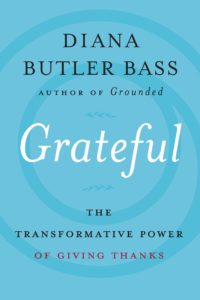 Grateful: The Transformative Power of Giving Thanks Diana Butler Bass (HarperOne) $26.99 We recently did two reviews of this at BookNotes, one rather long, so I hope you know that we are fans, even if I wasn’t confident, at first, that this book would be that interesting to me or important for serving the cause of of the flourishing of the common good. We’re very glad to report that it is exceptionally well-written, deep, good stuff, and that we think it deserves the acclaim that it has been getting. Grateful is a fabulous, inspiring book to read over the summer. The whole business of happiness and gratitude and such is being researched by scientists and while Diana is a social scientist and spiritual writer, she does discuss some of the brain studies data and such. It is certainly timely and a topic many are interested in.
Grateful: The Transformative Power of Giving Thanks Diana Butler Bass (HarperOne) $26.99 We recently did two reviews of this at BookNotes, one rather long, so I hope you know that we are fans, even if I wasn’t confident, at first, that this book would be that interesting to me or important for serving the cause of of the flourishing of the common good. We’re very glad to report that it is exceptionally well-written, deep, good stuff, and that we think it deserves the acclaim that it has been getting. Grateful is a fabulous, inspiring book to read over the summer. The whole business of happiness and gratitude and such is being researched by scientists and while Diana is a social scientist and spiritual writer, she does discuss some of the brain studies data and such. It is certainly timely and a topic many are interested in.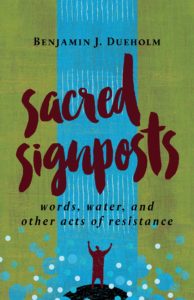 Sacred Signposts: Words, Water, and Other Acts of Resistance Benjamin J. Dueholm (Eerdmans) $16.99 I so, so want to recommend this and admit from the start that it deserves its own long review; I can only suggest a bit about it now. Dueholm is a Lutheran pastor who is also skilled as a great writer – his sentences are truly a delight to read – while his theological vision is provocative and interesting and generative. Here, as you might guess, he is showing how the church’s most elemental practices are themselves subversive to the secularized culture in which we live. Had this book been out previously (it came just this week) Alan Noble might have used it for his own chapter on disruptive practices in the local congregation.
Sacred Signposts: Words, Water, and Other Acts of Resistance Benjamin J. Dueholm (Eerdmans) $16.99 I so, so want to recommend this and admit from the start that it deserves its own long review; I can only suggest a bit about it now. Dueholm is a Lutheran pastor who is also skilled as a great writer – his sentences are truly a delight to read – while his theological vision is provocative and interesting and generative. Here, as you might guess, he is showing how the church’s most elemental practices are themselves subversive to the secularized culture in which we live. Had this book been out previously (it came just this week) Alan Noble might have used it for his own chapter on disruptive practices in the local congregation.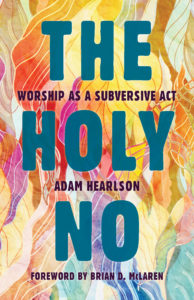 The Holy No: Worship as a Subversive Act Adam Hearlson (Eerdmans) $24.00 With this boldly subversive, nay-saying title, you can see why I might want to commend this alongside the profound study of the secular age by Alan Noble. Hearlson, a UCC pastor, puzzles out a bit about worship and liturgy as counter-cultural and formative in ways to help us resist distraction; good worship should help us understand God’s transformative work in our lives, and help us bear witness well in the world. But to do that, we must be resistant. How ‘bout a book that just shouts it – The Holy No!
The Holy No: Worship as a Subversive Act Adam Hearlson (Eerdmans) $24.00 With this boldly subversive, nay-saying title, you can see why I might want to commend this alongside the profound study of the secular age by Alan Noble. Hearlson, a UCC pastor, puzzles out a bit about worship and liturgy as counter-cultural and formative in ways to help us resist distraction; good worship should help us understand God’s transformative work in our lives, and help us bear witness well in the world. But to do that, we must be resistant. How ‘bout a book that just shouts it – The Holy No!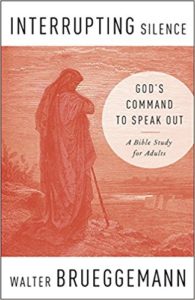 Interrupting Silence God’s Command to Speak Out: A Bible Study for Adults Walter Brueggemann (WJK) $14.00 Walt Brueggemann is very important to me for many reasons, but in the context of the theme of this newsletter — riffing off of the insights of Alan Noble’s Disruptive Witness —I might note that Brueggemann is not only a master Old Testament scholar and evocative Bible teacher, but he is exceptionally well read, especially in the social sciences and history and in what we might call cultural studies. So all of his rich Scriptural teaching is somewhat shaped by worldviewish vision and cultural critique. (Indeed, his old, extraordinary, brief book The Bible Makes Sense starts with two “bad” acculturated views of the Bible, showing ways the left-brain, establishment rationalists and the lefty, counter-cultural romantics each misread the very meaning of the Biblical drama which cannot be tamed and dare not be turned into an ideology of the right or the left.) Anyway, this new pithy book by Brueggemann offers eight fairly short but potent Bible reflections — one from Exodus, one from Amos, one on a few verses from Psalm 32, and five New Testament texts, each with provocative study questions for a serious adult class. Each chapter runs about 10 profound, pages. Brueggemann-esque pages, that is, so you’re getting your money’s worth.
Interrupting Silence God’s Command to Speak Out: A Bible Study for Adults Walter Brueggemann (WJK) $14.00 Walt Brueggemann is very important to me for many reasons, but in the context of the theme of this newsletter — riffing off of the insights of Alan Noble’s Disruptive Witness —I might note that Brueggemann is not only a master Old Testament scholar and evocative Bible teacher, but he is exceptionally well read, especially in the social sciences and history and in what we might call cultural studies. So all of his rich Scriptural teaching is somewhat shaped by worldviewish vision and cultural critique. (Indeed, his old, extraordinary, brief book The Bible Makes Sense starts with two “bad” acculturated views of the Bible, showing ways the left-brain, establishment rationalists and the lefty, counter-cultural romantics each misread the very meaning of the Biblical drama which cannot be tamed and dare not be turned into an ideology of the right or the left.) Anyway, this new pithy book by Brueggemann offers eight fairly short but potent Bible reflections — one from Exodus, one from Amos, one on a few verses from Psalm 32, and five New Testament texts, each with provocative study questions for a serious adult class. Each chapter runs about 10 profound, pages. Brueggemann-esque pages, that is, so you’re getting your money’s worth.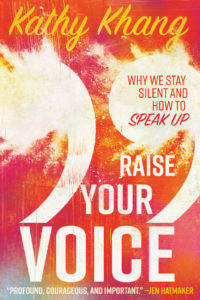 In telling you about Interrupting Silence I must note that I’m reminded of a brand new book I spoke about in my little video for last week’s BookNotes — Kathy Khang’s Raise Your Voice: Why We Stay Silent and How to Speak Up (IVP; $16.00.) We all can use some extra help in learning when and why and how to speak up, and Ms. Khang not only reminds us to use our voice with (as Rachel Held Evans puts it) “holy force” but also has done some good work herself exploring the social, cultural, and familial forces the sometimes intimidate us.
In telling you about Interrupting Silence I must note that I’m reminded of a brand new book I spoke about in my little video for last week’s BookNotes — Kathy Khang’s Raise Your Voice: Why We Stay Silent and How to Speak Up (IVP; $16.00.) We all can use some extra help in learning when and why and how to speak up, and Ms. Khang not only reminds us to use our voice with (as Rachel Held Evans puts it) “holy force” but also has done some good work herself exploring the social, cultural, and familial forces the sometimes intimidate us.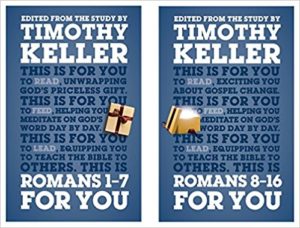 Romans 8 – 16 for You Timothy Keller (The Good Books Company) $22.99 We like this whole on-going series of Bible lessons that have some helpful application points. This is obviously the second volume of a two-volume pair on Romans. Get Romans 1 – 7 for You as well.
Romans 8 – 16 for You Timothy Keller (The Good Books Company) $22.99 We like this whole on-going series of Bible lessons that have some helpful application points. This is obviously the second volume of a two-volume pair on Romans. Get Romans 1 – 7 for You as well.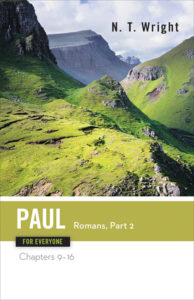
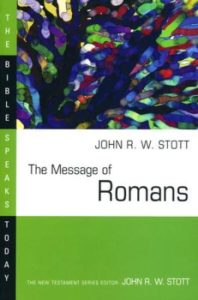 The Bible Speaks Today: The Message of Romans John Stott (IVP Academic) $20.00 As I explain in the video, the entire Bible Speaks Today series is a standard, go-to recommendation for us. They are mature and thoughtful, but not tooo critical or scholarly. Stott was the editor of the NT portion of the BST series and they are just so reliable, thoughtful, and relevant. He handles Romans 13 thoughtfully with good balance and insight. Highly recommended
The Bible Speaks Today: The Message of Romans John Stott (IVP Academic) $20.00 As I explain in the video, the entire Bible Speaks Today series is a standard, go-to recommendation for us. They are mature and thoughtful, but not tooo critical or scholarly. Stott was the editor of the NT portion of the BST series and they are just so reliable, thoughtful, and relevant. He handles Romans 13 thoughtfully with good balance and insight. Highly recommended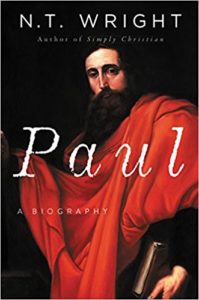
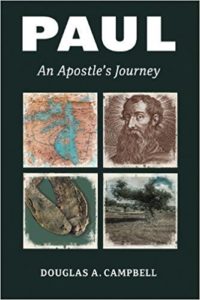 I also suggested that it would be wise just to study the life and teachings of Paul. There’s so, so much, but I gave a quick shout out to Paul: A Biography by N.T. Wright (HarperOne; $29.99.) I think the impressive, passionate scholar Douglas Campbell’s recent Paul: An Apostle’s Journey (Eerdmans; $22.00) sure looks great. And you really should know Reading Paul by the aforementioned Michael J. Gorman. (Cascade; $22.00.) I really should have mentioned that one last night, since I linked to his Facebook post on reading Romans 13 in context.
I also suggested that it would be wise just to study the life and teachings of Paul. There’s so, so much, but I gave a quick shout out to Paul: A Biography by N.T. Wright (HarperOne; $29.99.) I think the impressive, passionate scholar Douglas Campbell’s recent Paul: An Apostle’s Journey (Eerdmans; $22.00) sure looks great. And you really should know Reading Paul by the aforementioned Michael J. Gorman. (Cascade; $22.00.) I really should have mentioned that one last night, since I linked to his Facebook post on reading Romans 13 in context.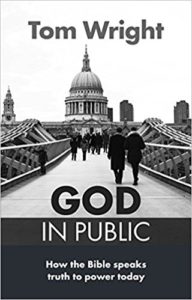 God in Public: How the Bible Speaks Truth to Power Today N.T. Wright (SPCK) $18.00 These are lectures given by the great New Testament prof on justice, government, public life, political theology and faithful civic engagement. This was published in England (where Wright goes by Tom rather than N.T. on his more popular level books. This is a great collection, highly recommended!
God in Public: How the Bible Speaks Truth to Power Today N.T. Wright (SPCK) $18.00 These are lectures given by the great New Testament prof on justice, government, public life, political theology and faithful civic engagement. This was published in England (where Wright goes by Tom rather than N.T. on his more popular level books. This is a great collection, highly recommended!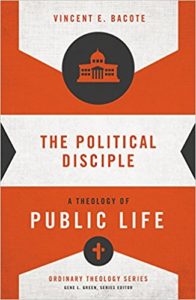 The Political Disciple: A Theology of Public Life Vincent Bacote (Zondervan) $11.99 I love this little volume in the “Ordinary Theology” series. He doesn’t cover Romans 13 much, but offers keen insights on public life, pluralism, and various postures and strategies for being “in but not of” the world as we take up our duties as Christian in society and as faithful citizens.
The Political Disciple: A Theology of Public Life Vincent Bacote (Zondervan) $11.99 I love this little volume in the “Ordinary Theology” series. He doesn’t cover Romans 13 much, but offers keen insights on public life, pluralism, and various postures and strategies for being “in but not of” the world as we take up our duties as Christian in society and as faithful citizens.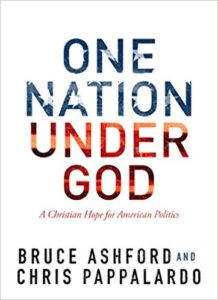 One Nation Under God: A Christian Hope for American Politics Bruce Ashford & Chris Pappalardo (B&H) $14.99 This is a small hardback written by two very sharp Southern Baptist thinkers who have studied Kuyper, pluralism, law, and understand much about the framework of a Christian view of political order. There’s a lot of meat here for a small book.
One Nation Under God: A Christian Hope for American Politics Bruce Ashford & Chris Pappalardo (B&H) $14.99 This is a small hardback written by two very sharp Southern Baptist thinkers who have studied Kuyper, pluralism, law, and understand much about the framework of a Christian view of political order. There’s a lot of meat here for a small book.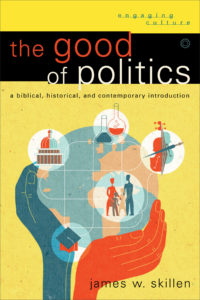 The Good of Politics: A Biblical, Historical and Contemporary Introduction James Skillen (Baker Academic) $24.00 My goodness, this overview of how the best thinkers of the Christian West have thought about politics and the state, down through the ages, is brilliant. He is helpful in showing how many have a core conviction about the state being God’s good gift, but many (perhaps influenced by some sacred/secular dualism or some private/public or church/world dichotomy) fail to develop a robust, Biblically-rooted political theory.This is a must for anyone serious about having an informed Christian perspective.
The Good of Politics: A Biblical, Historical and Contemporary Introduction James Skillen (Baker Academic) $24.00 My goodness, this overview of how the best thinkers of the Christian West have thought about politics and the state, down through the ages, is brilliant. He is helpful in showing how many have a core conviction about the state being God’s good gift, but many (perhaps influenced by some sacred/secular dualism or some private/public or church/world dichotomy) fail to develop a robust, Biblically-rooted political theory.This is a must for anyone serious about having an informed Christian perspective.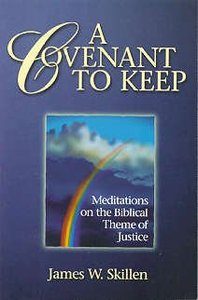 A Covenant to Keep: Meditations on the Biblical Theme of Justice James Skillen (The Center for Public Justice) $12.95 We are so glad to still have a few of these books around, first published by the Christian Reformed Church, solid Biblical reflections and a few nice case studies of people of faith serving as public officials. These Scriptural reflections emerged from Skillen’s work as founder of the Center for Public Justice, a non-partisan think tank for the development of Christian citizenship in light of a Biblical vision of society and the important but limited calling of the state.
A Covenant to Keep: Meditations on the Biblical Theme of Justice James Skillen (The Center for Public Justice) $12.95 We are so glad to still have a few of these books around, first published by the Christian Reformed Church, solid Biblical reflections and a few nice case studies of people of faith serving as public officials. These Scriptural reflections emerged from Skillen’s work as founder of the Center for Public Justice, a non-partisan think tank for the development of Christian citizenship in light of a Biblical vision of society and the important but limited calling of the state.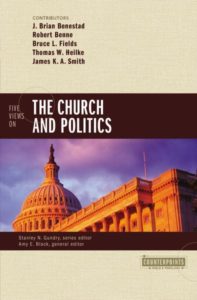 Five Views on the Church and Politics edited by Amy Black (Zondervan) $19.99 Those who follow BookNotes know that I’ve commended this recent “Counterpoints” book often. Nice to see the debate and dialogue between a Lutheran, a classic black church activist, a Roman Catholic, a Mennonite, and a Dutch Reformed Kuyper guy (our friend James K.A. Smith.)
Five Views on the Church and Politics edited by Amy Black (Zondervan) $19.99 Those who follow BookNotes know that I’ve commended this recent “Counterpoints” book often. Nice to see the debate and dialogue between a Lutheran, a classic black church activist, a Roman Catholic, a Mennonite, and a Dutch Reformed Kuyper guy (our friend James K.A. Smith.)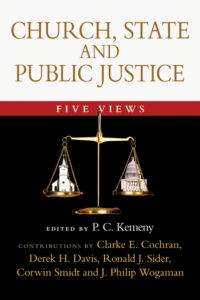 Church, State, and Public Justice: Five Views edited by P.C. Kemeny (IVP Academic) $20.00 I gave a quick shout out about this one, too, as it so helpfully allows a variety of good thinkers across a range of views to debate. There’s a Roman Catholic in the consistent, Catholic social teaching tradition, a Baptist, an Anabaptist, a principled pluralism view of the Kuyperian sort, and a social justice, mainline denominational view.
Church, State, and Public Justice: Five Views edited by P.C. Kemeny (IVP Academic) $20.00 I gave a quick shout out about this one, too, as it so helpfully allows a variety of good thinkers across a range of views to debate. There’s a Roman Catholic in the consistent, Catholic social teaching tradition, a Baptist, an Anabaptist, a principled pluralism view of the Kuyperian sort, and a social justice, mainline denominational view.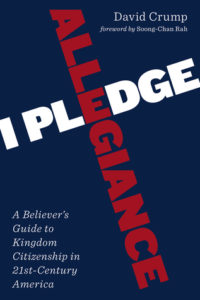 I Pledge Allegiance: A Believers Guide to Kingdom Citizenship in 21st Century America David Crump (Eerdmans) $24.99 Oh man, what a book, feisty, challenging, important. I offers a good study of the Kingdom of God, and it isn’t cheap or simple. I noted that there is a very good chapter on civil disobedience, with this New Testament professor telling of his own involvement in non-violent direct action and the solidarity he felt with those with whom he was arrested. Ron Sider calls it “a must read.” If we are going develop a more singular devotion to Christ and His Kingdom without being co-opted by the political powers that be, we will need this sort of tough thinking. Good discussion questions, too, make this a great study resource for engaged readers.
I Pledge Allegiance: A Believers Guide to Kingdom Citizenship in 21st Century America David Crump (Eerdmans) $24.99 Oh man, what a book, feisty, challenging, important. I offers a good study of the Kingdom of God, and it isn’t cheap or simple. I noted that there is a very good chapter on civil disobedience, with this New Testament professor telling of his own involvement in non-violent direct action and the solidarity he felt with those with whom he was arrested. Ron Sider calls it “a must read.” If we are going develop a more singular devotion to Christ and His Kingdom without being co-opted by the political powers that be, we will need this sort of tough thinking. Good discussion questions, too, make this a great study resource for engaged readers.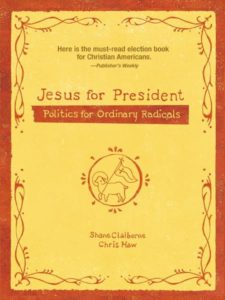 Jesus for President Shane Claiborne & Chris Haw (Zondervan) $19.99 What a wild and creative book with edgy artwork and colorful illustrations and eccentric, youthful design. More importantly, it shows how the Bible offers an alternative story to the story of economic growth, nationalism, and military might and calls us to embody a counter-cultural community which testifies to the King who rides a donkey (not a warhorse) and whose political victory comes through a nonviolent act of suffering servanthood. Agree or not with the “anti-institutional” tone of this, it is Biblically-rich, capturing an important theme in the Bible. I wish I had said more positive about it in my little video talk as it really is worth reading.
Jesus for President Shane Claiborne & Chris Haw (Zondervan) $19.99 What a wild and creative book with edgy artwork and colorful illustrations and eccentric, youthful design. More importantly, it shows how the Bible offers an alternative story to the story of economic growth, nationalism, and military might and calls us to embody a counter-cultural community which testifies to the King who rides a donkey (not a warhorse) and whose political victory comes through a nonviolent act of suffering servanthood. Agree or not with the “anti-institutional” tone of this, it is Biblically-rich, capturing an important theme in the Bible. I wish I had said more positive about it in my little video talk as it really is worth reading.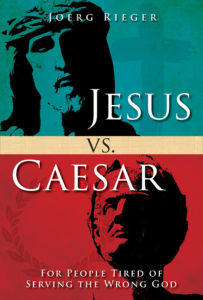 Jesus vs. Caesar: For People Tired of Serving the Wrong God Joerge Rieger (Abingdon) $19.99 Time was running out on my little book talk so I didn’t say much about this, but it is a powerful, liberationist critique of mammon, power, and how the gospel always puts us in conflict with the principalities and powers. I tend to find great value in this strong critique but was frustrated a bit by some of his zealous overstatements. Still, it is true that many of us say we are following Jesus but we are deeply complicit in a violent Empire and we simply must learn to say no to the death-dealing ways of the status quo. Could it be that many who talk about religion in public life are actually serving a false God? Wow.
Jesus vs. Caesar: For People Tired of Serving the Wrong God Joerge Rieger (Abingdon) $19.99 Time was running out on my little book talk so I didn’t say much about this, but it is a powerful, liberationist critique of mammon, power, and how the gospel always puts us in conflict with the principalities and powers. I tend to find great value in this strong critique but was frustrated a bit by some of his zealous overstatements. Still, it is true that many of us say we are following Jesus but we are deeply complicit in a violent Empire and we simply must learn to say no to the death-dealing ways of the status quo. Could it be that many who talk about religion in public life are actually serving a false God? Wow.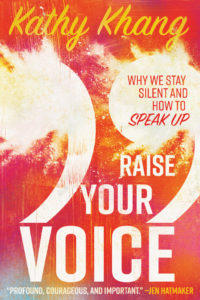
 Raise Your Voice: Why We Stay Silent and How to Speak Up Kathy Khang (IVP) $16.00 I ended my video presentation with an invitation to read this thrilling new book. I described it too quickly, but hope you picked up how thrilled we are to have such a resource and how much I’m enjoying it. I really, really hope many consider it as it is wonderfully written and offers both serious Biblical and spiritual insight, lots of anecdotes, and good strategies and guidance. Khan has worked in campus ministry with IVCF and has previously written a book for Asian American women rising to leadership positions (More Than Serving Tea: Asian American Women on Expectations, Relationships, Leadership and Faith) which of course we stock. Kathy Khang is an voice we should listen to.
Raise Your Voice: Why We Stay Silent and How to Speak Up Kathy Khang (IVP) $16.00 I ended my video presentation with an invitation to read this thrilling new book. I described it too quickly, but hope you picked up how thrilled we are to have such a resource and how much I’m enjoying it. I really, really hope many consider it as it is wonderfully written and offers both serious Biblical and spiritual insight, lots of anecdotes, and good strategies and guidance. Khan has worked in campus ministry with IVCF and has previously written a book for Asian American women rising to leadership positions (More Than Serving Tea: Asian American Women on Expectations, Relationships, Leadership and Faith) which of course we stock. Kathy Khang is an voice we should listen to.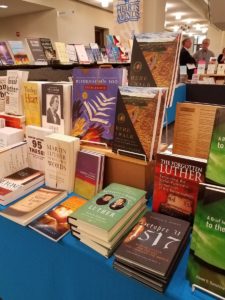 tear down and load out, we zoomed to an ecumenical conference at Lancaster Theological Seminary on “Mercersburg Theology” (a 19th century German Reformed tradition that was significant and remains a curious influence in central Pennsylvania United Church of Christ (UCC.) This year, alongside academic papers on Nevin and Schaff (the founders of the “Mercersburg school”) there were Orthodox theologians, a graduate of Westminster Seminary, a Mennonite presenter and an Episcopalian scholar who studied at the Presbyterian seminary in Pittsburgh and works for the Eastern Rite Catholic Seminary in Pittsburgh. (Did you know there were Catholics who are Eastern?) What a world, so many scooped up in the big net of God’s saving catch.
tear down and load out, we zoomed to an ecumenical conference at Lancaster Theological Seminary on “Mercersburg Theology” (a 19th century German Reformed tradition that was significant and remains a curious influence in central Pennsylvania United Church of Christ (UCC.) This year, alongside academic papers on Nevin and Schaff (the founders of the “Mercersburg school”) there were Orthodox theologians, a graduate of Westminster Seminary, a Mennonite presenter and an Episcopalian scholar who studied at the Presbyterian seminary in Pittsburgh and works for the Eastern Rite Catholic Seminary in Pittsburgh. (Did you know there were Catholics who are Eastern?) What a world, so many scooped up in the big net of God’s saving catch.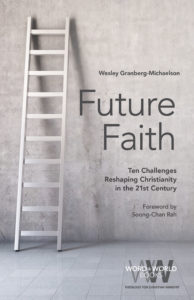 Which brings us to one of the very best books about church life I’ve read in ages, an important and interesting and insightful work by one of the most interesting, ecumenical, globally-connected persons you could ever meet, Wesley Granberg-Michaelson. The book, recently published by Fortress, is called Future Faith: Ten Challenges Reshaping Christianity in the 21st Century.
Which brings us to one of the very best books about church life I’ve read in ages, an important and interesting and insightful work by one of the most interesting, ecumenical, globally-connected persons you could ever meet, Wesley Granberg-Michaelson. The book, recently published by Fortress, is called Future Faith: Ten Challenges Reshaping Christianity in the 21st Century.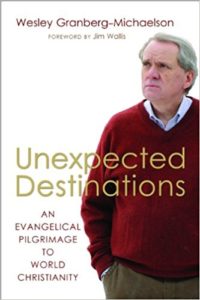
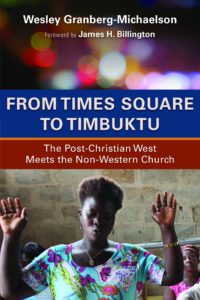 And, by the way, he is an ideal author to reach both mainline folk and evangelicals. As Wes tells so pleasantly in his fascinating memoir, Unexpected Destinations: An Evangelical Pilgrimage to World Christianity [Eerdmans; $24.00] he grew up on the fundamentalist side of the pew but his journey has taken him into nearly every corner of the broader Body of Christ. As he develops then in his 2013 masterpiece, From Times Square to Timbuktu: The Post-Christian West Meets the Non-Western Church (Eerdmans; $20.00) the realities of the global church — well known from all the recent books with all the statistics that indicate the majority of Christians (for the first time in 2000 years) are now in the global South and Asia and not white, European or North American – are now coming through migration and immigration, to our own towns. That is, even as world Christianity’s center of gravity has moved to some point near Timbuktu, many of these brothers and sisters are, in fact, moving to North America, bringing their experiences and theological frameworks with them.
And, by the way, he is an ideal author to reach both mainline folk and evangelicals. As Wes tells so pleasantly in his fascinating memoir, Unexpected Destinations: An Evangelical Pilgrimage to World Christianity [Eerdmans; $24.00] he grew up on the fundamentalist side of the pew but his journey has taken him into nearly every corner of the broader Body of Christ. As he develops then in his 2013 masterpiece, From Times Square to Timbuktu: The Post-Christian West Meets the Non-Western Church (Eerdmans; $20.00) the realities of the global church — well known from all the recent books with all the statistics that indicate the majority of Christians (for the first time in 2000 years) are now in the global South and Asia and not white, European or North American – are now coming through migration and immigration, to our own towns. That is, even as world Christianity’s center of gravity has moved to some point near Timbuktu, many of these brothers and sisters are, in fact, moving to North America, bringing their experiences and theological frameworks with them.
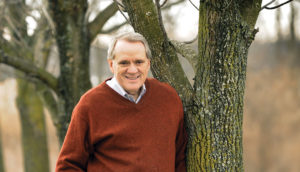 He sees the good, the bad, and the ugly, in the church these days and remains hopeful. The book is hard-hitting and challenging (not least for Western church folks who are the primary intended readers) but it isn’t strident or pessimistic or alarmist. Well, it’s a little alarming since, well, we simply can’t abide the status quo much longer; things must change in our faith communities. The gloomy statistics about church decline and the disastrous trajectory for many aging and dying congregations are self-evident and it is foolish to disregard the writing on the wall, as they say. Granberg-Michaelson clearly summarizes some of the most recent data on this hard stuff and it was both bracing and helpful.
He sees the good, the bad, and the ugly, in the church these days and remains hopeful. The book is hard-hitting and challenging (not least for Western church folks who are the primary intended readers) but it isn’t strident or pessimistic or alarmist. Well, it’s a little alarming since, well, we simply can’t abide the status quo much longer; things must change in our faith communities. The gloomy statistics about church decline and the disastrous trajectory for many aging and dying congregations are self-evident and it is foolish to disregard the writing on the wall, as they say. Granberg-Michaelson clearly summarizes some of the most recent data on this hard stuff and it was both bracing and helpful.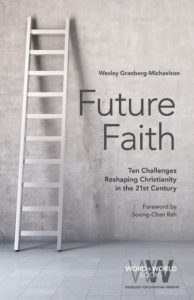 Future Faith will help churches re-vamp their way of doing life together in their parishes, sure, which will help them practically be more sustainable in these changing times, but more importantly, it will help them be more Biblical. More faithful, more coherent and consistent and natural at bearing witness to the very good gospel of God’s Kingdom. Reading and discussing it will transfigure the church and transform us, hopefully making a difference in the world. This is an interesting book about global trends and includes some data and research and predictions but truly it is a book about theological principles which are too often missed and which simply must be embraced, now, before it is too late.
Future Faith will help churches re-vamp their way of doing life together in their parishes, sure, which will help them practically be more sustainable in these changing times, but more importantly, it will help them be more Biblical. More faithful, more coherent and consistent and natural at bearing witness to the very good gospel of God’s Kingdom. Reading and discussing it will transfigure the church and transform us, hopefully making a difference in the world. This is an interesting book about global trends and includes some data and research and predictions but truly it is a book about theological principles which are too often missed and which simply must be embraced, now, before it is too late.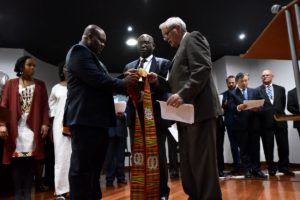 The stories he tells are often about churches from all over – some international, some from North America, many mainline, some not. Wes has this extraordinary calling and exceptional grace to be able to be in fellowship with and learn from folks from all over the theological spectrum so there are plenty of cool stories and lots of provocative insights and some jaw-dropping stories offered. Did I say this would make a great study for a small group or book club?
The stories he tells are often about churches from all over – some international, some from North America, many mainline, some not. Wes has this extraordinary calling and exceptional grace to be able to be in fellowship with and learn from folks from all over the theological spectrum so there are plenty of cool stories and lots of provocative insights and some jaw-dropping stories offered. Did I say this would make a great study for a small group or book club?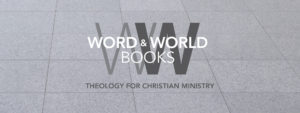
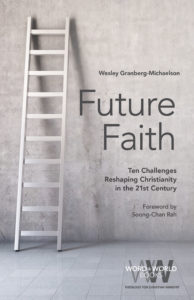
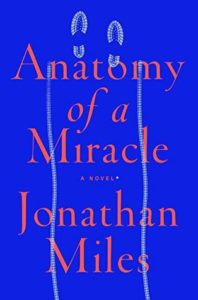 about waste and excess called Want Not. His new one is called Anatomy of a Miracle published by the significant Hogarth Press (regularly $27.00, before discount.) In the first chapter a beer-guzzling war vet, made a paraplegic in Afghanistan, is mysteriously healed on a hot morning in front of the Biz-E-Bee convenience story in Biloxi, Mississippi. The book unfolds as scientists and faith healers and reality TV producers all vie to explain what happened. (It isn’t every profane, mainstream novel, by the way, that talks about evangelical faith, both black and white Southern Christians, citing everything from C.S. Lewis on miracles to more low-brow evangelical bestsellers. And that also nicely exposes the reductionism and lack of imagination among those committed to materialistic scientism. And the dangers of, well, I digress…)
about waste and excess called Want Not. His new one is called Anatomy of a Miracle published by the significant Hogarth Press (regularly $27.00, before discount.) In the first chapter a beer-guzzling war vet, made a paraplegic in Afghanistan, is mysteriously healed on a hot morning in front of the Biz-E-Bee convenience story in Biloxi, Mississippi. The book unfolds as scientists and faith healers and reality TV producers all vie to explain what happened. (It isn’t every profane, mainstream novel, by the way, that talks about evangelical faith, both black and white Southern Christians, citing everything from C.S. Lewis on miracles to more low-brow evangelical bestsellers. And that also nicely exposes the reductionism and lack of imagination among those committed to materialistic scientism. And the dangers of, well, I digress…)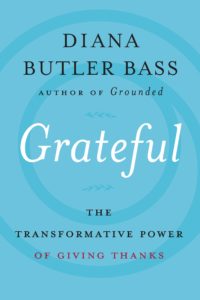 Grateful: The Transformative Power of Giving Thanks Diana Butler Bass (HarperOne) $26.99 I was enthusiastic in my description of this when the book released a month ago, and I encouraged all within ear-shot to consider it. I admitted that I wasn’t sure what I’d think about it, at first, but realized it is really good. I tried to explain it briefly, but wanted to revisit in now.
Grateful: The Transformative Power of Giving Thanks Diana Butler Bass (HarperOne) $26.99 I was enthusiastic in my description of this when the book released a month ago, and I encouraged all within ear-shot to consider it. I admitted that I wasn’t sure what I’d think about it, at first, but realized it is really good. I tried to explain it briefly, but wanted to revisit in now.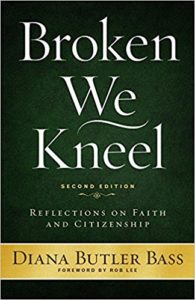 (A revised and expanded version of her must-read, short memoir called Broken We Kneel: Reflections on Faith and Citizenship is coming out late this summer from Church Publishing ($18.95 – you can pre-order it from us, of course.) It ruminates on the important church/state, faith/politics intersection but is rooted in her own anguished story of leaving a church the year following 9-11, precipitated by flags in the sanctuary. Her spiritually rich, humble phrase, “Broken We Kneel” was in direct contrast to the “United We Stand” motto and expresses her sadness at how some churches – even large main-denominational churches – are too often aligned with militarism and nationalism; it reminds us of the price some of us will have to pay to be faithful to Christ to resist what the hymn-writer called “our warring madness.” I am very eager to see revised edition…)
(A revised and expanded version of her must-read, short memoir called Broken We Kneel: Reflections on Faith and Citizenship is coming out late this summer from Church Publishing ($18.95 – you can pre-order it from us, of course.) It ruminates on the important church/state, faith/politics intersection but is rooted in her own anguished story of leaving a church the year following 9-11, precipitated by flags in the sanctuary. Her spiritually rich, humble phrase, “Broken We Kneel” was in direct contrast to the “United We Stand” motto and expresses her sadness at how some churches – even large main-denominational churches – are too often aligned with militarism and nationalism; it reminds us of the price some of us will have to pay to be faithful to Christ to resist what the hymn-writer called “our warring madness.” I am very eager to see revised edition…)
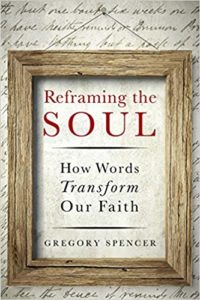 Reframing the Soul: How Words Transform Our Faith Gregory Spencer (Leafwood) $15.99 Oh my, what a handsome, nice paperback, a perfect book to read alongside Grateful by Diana Butler Bass. In fact, Spencer has a very, very good chapter on gratitude in Reframing the Soul and it helped me as I was reading Butler Bass. I’m not stretching it to say these two really could be read in tandem.
Reframing the Soul: How Words Transform Our Faith Gregory Spencer (Leafwood) $15.99 Oh my, what a handsome, nice paperback, a perfect book to read alongside Grateful by Diana Butler Bass. In fact, Spencer has a very, very good chapter on gratitude in Reframing the Soul and it helped me as I was reading Butler Bass. I’m not stretching it to say these two really could be read in tandem.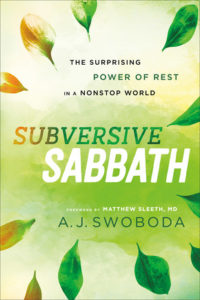 Subversive Sabbath: The Surprising Power of Rest in a Nonstop World A. J. Swoboda (Brazos Press) $19.99 This is another book that I wrote about in some detail – but not enough – when it first came out. We raved about it, assured you that it seemed to be one of the very best books done on this topic. We celebrated Swoboda as a great writer – we so loved his last few books such as A Glorious Dark: Finding Hope in the Tension Between Belief (Baker Books; $15.00) and Experience or The Dusty Ones: Why Wandering Deepens Your Faith (Baker Books; $16.00) not to mention an academic text he edited on Pentecostals involved in peace-making, social justice, and creation care entitled Blood Cries Out: Pentecostals Ecology, and the Groan of Creation (Pickwick Publications; $31.00.)
Subversive Sabbath: The Surprising Power of Rest in a Nonstop World A. J. Swoboda (Brazos Press) $19.99 This is another book that I wrote about in some detail – but not enough – when it first came out. We raved about it, assured you that it seemed to be one of the very best books done on this topic. We celebrated Swoboda as a great writer – we so loved his last few books such as A Glorious Dark: Finding Hope in the Tension Between Belief (Baker Books; $15.00) and Experience or The Dusty Ones: Why Wandering Deepens Your Faith (Baker Books; $16.00) not to mention an academic text he edited on Pentecostals involved in peace-making, social justice, and creation care entitled Blood Cries Out: Pentecostals Ecology, and the Groan of Creation (Pickwick Publications; $31.00.)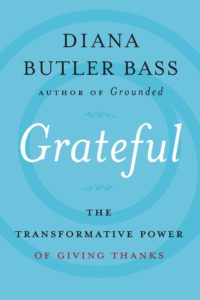
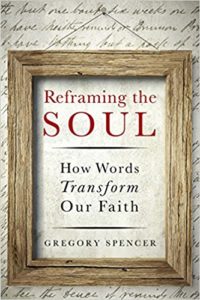
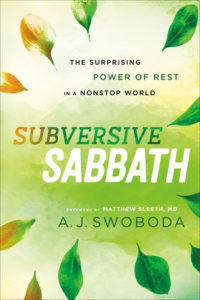
 When in doubt, I often start with a passionate summary of the doctrine of vocation, talk about Os Guinness’s stellar and exquisite work The Call: Finding and Fulfilling Your Life’s Greatest Purpose (Word; $17.99) and remind folks that their work or avocations are as important to the Kingdom of God as is the work of ministers or missionaries. Explaining how the early church was wrong to so easily buy into Plato’s lie that life is made up of what some call “sacred and secular” spheres is a good way to start almost any talk on any topic. God cares, the world matters, we are called to reflect on the principles and practices that cohere with the actual way God’s good world really works, illumined by the light of Biblical truth. Citing that explosive verse about “taking every theory captive” (2 Corinthians 10:5) it’s helpful, I think, to remind folks to think well about what they do.
When in doubt, I often start with a passionate summary of the doctrine of vocation, talk about Os Guinness’s stellar and exquisite work The Call: Finding and Fulfilling Your Life’s Greatest Purpose (Word; $17.99) and remind folks that their work or avocations are as important to the Kingdom of God as is the work of ministers or missionaries. Explaining how the early church was wrong to so easily buy into Plato’s lie that life is made up of what some call “sacred and secular” spheres is a good way to start almost any talk on any topic. God cares, the world matters, we are called to reflect on the principles and practices that cohere with the actual way God’s good world really works, illumined by the light of Biblical truth. Citing that explosive verse about “taking every theory captive” (2 Corinthians 10:5) it’s helpful, I think, to remind folks to think well about what they do. If this task or way of thinking about the intellectual implications of passages like 2 Corinthians 11:5 or Romans 12:1-2, I highly recommend at least reading up a bit on the Christian mind. My favorite brief book on this is by the wonderful Greg Jao and is called Your Mind’s Mission (IVP; $7.00.) I very briefly describe in an older BookNotes ten others in a list that’s a little dated but may proof helpful. We still stock these, and more, so
If this task or way of thinking about the intellectual implications of passages like 2 Corinthians 11:5 or Romans 12:1-2, I highly recommend at least reading up a bit on the Christian mind. My favorite brief book on this is by the wonderful Greg Jao and is called Your Mind’s Mission (IVP; $7.00.) I very briefly describe in an older BookNotes ten others in a list that’s a little dated but may proof helpful. We still stock these, and more, so  Culture Making: Recovering Our Creative Calling Andy Crouch (IVP) $22.00 Time and again I insist this is not a book for artists but for all of us, for any who long to be more meaningful engaged in the human task of culture-making, of stewarding the gifts God has given us for the common good. We are all called to make something out of what we are given and this image-of-God work of cultivating God’s garden is intrinsically human. So, yes, it is for butchers, bakers, and candlestick makers, for parents and politicians and practitioners of all sorts. But, let’s face it: who needs to have language to express this stuff, this good, creative calling, this longing to leave a legacy of something real, than those called to be artists, writers, poets, novelists? I very, very highly recommend this one-of-a-kind book.
Culture Making: Recovering Our Creative Calling Andy Crouch (IVP) $22.00 Time and again I insist this is not a book for artists but for all of us, for any who long to be more meaningful engaged in the human task of culture-making, of stewarding the gifts God has given us for the common good. We are all called to make something out of what we are given and this image-of-God work of cultivating God’s garden is intrinsically human. So, yes, it is for butchers, bakers, and candlestick makers, for parents and politicians and practitioners of all sorts. But, let’s face it: who needs to have language to express this stuff, this good, creative calling, this longing to leave a legacy of something real, than those called to be artists, writers, poets, novelists? I very, very highly recommend this one-of-a-kind book. Rainbows for the Fallen World Calvin Seerveld (Toronto Tuppence Press) $30.00 In my presentation I explained a bit about this important book, on of my own personal all time favorites, especially the early chapters about how Seerveld reminds us, helps disclose for us, the aesthetic dimension to all of life. Here he does his most famous and often-discussed good work on “allusion” and a serious chapter or two on the philosophy of aesthetics. I’d read anything Cal writes – and what an energetic writer he is! For those who want a deep dive into his work, see any of these in
Rainbows for the Fallen World Calvin Seerveld (Toronto Tuppence Press) $30.00 In my presentation I explained a bit about this important book, on of my own personal all time favorites, especially the early chapters about how Seerveld reminds us, helps disclose for us, the aesthetic dimension to all of life. Here he does his most famous and often-discussed good work on “allusion” and a serious chapter or two on the philosophy of aesthetics. I’d read anything Cal writes – and what an energetic writer he is! For those who want a deep dive into his work, see any of these in  A Redemptive Theology of Art: Restoring Godly Aesthetics to Doctrine and Culture David A. Covington (Zondervan) $24.99 This is very new and I applaud Zondervan for releasing a book that, sadly, may not seem important to those who read theology. I’m part way through it want to commend the author for doing this kind of good work. It looks at how aesthetics can influence our understanding of doctrine as well as our engagement with the culture and the creative process. Good, good stuff. He quotes Seerveld, too.
A Redemptive Theology of Art: Restoring Godly Aesthetics to Doctrine and Culture David A. Covington (Zondervan) $24.99 This is very new and I applaud Zondervan for releasing a book that, sadly, may not seem important to those who read theology. I’m part way through it want to commend the author for doing this kind of good work. It looks at how aesthetics can influence our understanding of doctrine as well as our engagement with the culture and the creative process. Good, good stuff. He quotes Seerveld, too.

 It Was Good: Making Art to the Glory of God edited by Ned Bustard (Square Halo Books) $24.99
It Was Good: Making Art to the Glory of God edited by Ned Bustard (Square Halo Books) $24.99 Scribbling in the Sand: Christ and Creativity Michael Card (IVP) $17.00 There are heavier books out there, but I really, really like Mike’s mature reflections and balanced call to embrace some degree of creativity in our daily lives. This is helpful for artists and writers, but also good for anyone. We recommend it often.
Scribbling in the Sand: Christ and Creativity Michael Card (IVP) $17.00 There are heavier books out there, but I really, really like Mike’s mature reflections and balanced call to embrace some degree of creativity in our daily lives. This is helpful for artists and writers, but also good for anyone. We recommend it often. Imagine: A Vision for Christians in the Arts Steve Turner (IVP) $16.00 This is another standard go-to book for us that is basic, interesting, engaging for anyone whether filmmaker, musician, storyteller, or writer – or anyone who just enjoys the popular arts. I so appreciate this classic book, which was nicely expanded a few years back and often recommend it (to artists and others; maybe especially others.) Steve Turner is a respected rock critic (and has written widely on, among other musical icons, The Beatles.) This is a very good book, highly recommended.
Imagine: A Vision for Christians in the Arts Steve Turner (IVP) $16.00 This is another standard go-to book for us that is basic, interesting, engaging for anyone whether filmmaker, musician, storyteller, or writer – or anyone who just enjoys the popular arts. I so appreciate this classic book, which was nicely expanded a few years back and often recommend it (to artists and others; maybe especially others.) Steve Turner is a respected rock critic (and has written widely on, among other musical icons, The Beatles.) This is a very good book, highly recommended. Echoes of Eden: Reflections on Christianity, Literature, and the Arts Jerram Barrs (Crossway) $18.99 When my friend Denis Haack says something good about a book, when jazzman and seminary prof William Edgar has a blurb (saying it is “enriching both professional artists and anyone else sensitive to the power of art for all of life”) and when Nicholas Perrin (once a teaching assistant to NT Wright) says that Barr “clears away the clutter of much-touted arguments and sets forth a clear framework for any Christian thinking Biblically about the arts” you know you’ve got my attention.
Echoes of Eden: Reflections on Christianity, Literature, and the Arts Jerram Barrs (Crossway) $18.99 When my friend Denis Haack says something good about a book, when jazzman and seminary prof William Edgar has a blurb (saying it is “enriching both professional artists and anyone else sensitive to the power of art for all of life”) and when Nicholas Perrin (once a teaching assistant to NT Wright) says that Barr “clears away the clutter of much-touted arguments and sets forth a clear framework for any Christian thinking Biblically about the arts” you know you’ve got my attention. Walking on Water: Reflections on Faith and Art Madeline L’Engle (Convergence) $15.00 This is a must-read for any serious writer. Her take on the creative process and the spirituality of the arts is wise and a tad unusual – she draws on desert fathers and medieval artists and more. It is not simplistic. Of course, her main art work is as an author, so it’s very good for writers. There is, in this recently re-issued paperback, a lovely preface by the YA novelist Sara Zarr.
Walking on Water: Reflections on Faith and Art Madeline L’Engle (Convergence) $15.00 This is a must-read for any serious writer. Her take on the creative process and the spirituality of the arts is wise and a tad unusual – she draws on desert fathers and medieval artists and more. It is not simplistic. Of course, her main art work is as an author, so it’s very good for writers. There is, in this recently re-issued paperback, a lovely preface by the YA novelist Sara Zarr. Breath for the Bones: Art, Imagination, and Spirit: Reflections on Creativity and Faith Luci Shaw (Thomas Nelson) $15.99 Luci Shaw (or was good friends and prayer partner with Madeline L’Engle, by the way) is a very esteemed Christian literary figure, a poet and nonfiction essayist, spiritual leader and storyteller. (She has a new book of poetry coming from Paraclete Press this fall!!) This is a book that should be on every aspiring writers shelves, maybe on your nightstand. She knows good writing – from Emily Dickinson to Annie Dillard – she reflects on the meaning of symbolism and metaphor and shows how good art (mostly good writing since that is her particular specialty) can help humans flourish and even experience God. Very nicely done and very inspiring.
Breath for the Bones: Art, Imagination, and Spirit: Reflections on Creativity and Faith Luci Shaw (Thomas Nelson) $15.99 Luci Shaw (or was good friends and prayer partner with Madeline L’Engle, by the way) is a very esteemed Christian literary figure, a poet and nonfiction essayist, spiritual leader and storyteller. (She has a new book of poetry coming from Paraclete Press this fall!!) This is a book that should be on every aspiring writers shelves, maybe on your nightstand. She knows good writing – from Emily Dickinson to Annie Dillard – she reflects on the meaning of symbolism and metaphor and shows how good art (mostly good writing since that is her particular specialty) can help humans flourish and even experience God. Very nicely done and very inspiring. Refractions: A Journey of Faith, Art and Culture Makoto Fujimura (NavPress) $24.99 We stock and highly recommend all of Mako’s extraordinary books; there is a reason he is so well respected in so many quarters. As an abstract painter living near Ground Zero during 9-11 his ruminations on the arts have a poignant, socially responsible tone. These are beautiful essays, cries from the heart of a lively, thoughtful, Christian artist. I hope you know his many other books, from the broad and thoughtful Culture Care: Reconnecting with Beauty for our Common Life to Silence and Beauty: Hidden Faith Born of Suffering the specific, award-winning study of the classic Japanese novel, Silence, which raises huge questions about how art can be helpful as we live in a hurting world. We talked about this matter somewhat in the writers group – that good books can help heal the world. Silence and Beauty shows us how it’s done. But I think his Refractions is a must-have book.
Refractions: A Journey of Faith, Art and Culture Makoto Fujimura (NavPress) $24.99 We stock and highly recommend all of Mako’s extraordinary books; there is a reason he is so well respected in so many quarters. As an abstract painter living near Ground Zero during 9-11 his ruminations on the arts have a poignant, socially responsible tone. These are beautiful essays, cries from the heart of a lively, thoughtful, Christian artist. I hope you know his many other books, from the broad and thoughtful Culture Care: Reconnecting with Beauty for our Common Life to Silence and Beauty: Hidden Faith Born of Suffering the specific, award-winning study of the classic Japanese novel, Silence, which raises huge questions about how art can be helpful as we live in a hurting world. We talked about this matter somewhat in the writers group – that good books can help heal the world. Silence and Beauty shows us how it’s done. But I think his Refractions is a must-have book. Intruding Upon the Timeless: Meditations on Art, Faith and Mystery Gregory Wolfe (Square Halo Books) $22.99 I think any literary person should know the exquisite and thoughtful prose of this well-informed Catholic leader in the movement – the space, as we say these days – relating faith and the arts. You should know the journal he founded, Image, his collection of essays entitled The Operation of Grace: Further Essays on Art, Faith, and Mystery, and a major work entitled Beauty Will Save the World: Recovering the Human in an Ideological Age. (You should know his wife, Suzanne’s, two excellent novels, too, The Confessions of X, about Augustine’s early lover and Unveiling, a revised, newly reissued novel about an art restoration project. But I digress.) This recent Square Halo edition of Intruding Upon the Timeless a collection of short, luminous, essays by Wolfe from Image was expanded last year and reissued with new artwork within, including some by woodcut artist Barry Moser. Very, very nicely done, and good reading for anyone in the arts, and certainly faith-based writers.
Intruding Upon the Timeless: Meditations on Art, Faith and Mystery Gregory Wolfe (Square Halo Books) $22.99 I think any literary person should know the exquisite and thoughtful prose of this well-informed Catholic leader in the movement – the space, as we say these days – relating faith and the arts. You should know the journal he founded, Image, his collection of essays entitled The Operation of Grace: Further Essays on Art, Faith, and Mystery, and a major work entitled Beauty Will Save the World: Recovering the Human in an Ideological Age. (You should know his wife, Suzanne’s, two excellent novels, too, The Confessions of X, about Augustine’s early lover and Unveiling, a revised, newly reissued novel about an art restoration project. But I digress.) This recent Square Halo edition of Intruding Upon the Timeless a collection of short, luminous, essays by Wolfe from Image was expanded last year and reissued with new artwork within, including some by woodcut artist Barry Moser. Very, very nicely done, and good reading for anyone in the arts, and certainly faith-based writers. Imagination Redeemed: Glorifying God with a Neglected Part of Your Mind Gene Veith & Matthew Ristuccia (Crossway) $16.99 It is surprising that there are few books that are directly exploring the role of imagination in faith. There are a few that are a bit eccentric or obtuse, but this is clear and insightful. It is a good starting point towards a coherently Christian approach and has endorsements on the back by David Kim (of the Redeemer Presbyterian Center for Faith and Work), Jeremy Begbie (who, after Seerveld, may be one of the most important aesthetic theorists writing today) and the esteemed emeritus Wheaton literature prof Leland Ryken.
Imagination Redeemed: Glorifying God with a Neglected Part of Your Mind Gene Veith & Matthew Ristuccia (Crossway) $16.99 It is surprising that there are few books that are directly exploring the role of imagination in faith. There are a few that are a bit eccentric or obtuse, but this is clear and insightful. It is a good starting point towards a coherently Christian approach and has endorsements on the back by David Kim (of the Redeemer Presbyterian Center for Faith and Work), Jeremy Begbie (who, after Seerveld, may be one of the most important aesthetic theorists writing today) and the esteemed emeritus Wheaton literature prof Leland Ryken. The Christian Imagination: The Practice of Faith in Literature and Writing Leland Ryken (Shaw Books) $24.99 Some say that this is an ideal book to use in a class on writing or literature, an anthology that brings together some of the very best stuff written on the integration of faith and literature. It is a bit dated and tends towards the classical, but for what it does it is an unparalleled anthology. In it you’ll find excerpts from C.S. Lewis, Flannery O’Conner, Dorothy Sayers, Frederick Buechner, and more… a good exercise for any writer is to dip into good writing and it is always worthwhile for anyone trying to develop their own opinions about creativity and aesthetics and the writing process to hear what great minds have said about this daunting topic. What a joy to have this thick paperback of 480 pages!
The Christian Imagination: The Practice of Faith in Literature and Writing Leland Ryken (Shaw Books) $24.99 Some say that this is an ideal book to use in a class on writing or literature, an anthology that brings together some of the very best stuff written on the integration of faith and literature. It is a bit dated and tends towards the classical, but for what it does it is an unparalleled anthology. In it you’ll find excerpts from C.S. Lewis, Flannery O’Conner, Dorothy Sayers, Frederick Buechner, and more… a good exercise for any writer is to dip into good writing and it is always worthwhile for anyone trying to develop their own opinions about creativity and aesthetics and the writing process to hear what great minds have said about this daunting topic. What a joy to have this thick paperback of 480 pages! Title Pending: What I Think About When I Make Stuff Justin McRoberts (CreateSpace) $10.99 I told the San Fran Bay Area ACFW group that they should know Justin, a singer-songwriter, workshop leader, podcast genius, author and all-around cultural creative who lives out there. Title Pending is a little known self-published work by a guy I really, really respect which is full of advice and ideas about being creative. Congrats to Justin and his friend Scott “The Painter” Erickson who just signed a deal with Waterbrook. Yah. What do you think about when you make stuff? Maybe Justin’s insights can help you answer that, or give a better answer. Cool.
Title Pending: What I Think About When I Make Stuff Justin McRoberts (CreateSpace) $10.99 I told the San Fran Bay Area ACFW group that they should know Justin, a singer-songwriter, workshop leader, podcast genius, author and all-around cultural creative who lives out there. Title Pending is a little known self-published work by a guy I really, really respect which is full of advice and ideas about being creative. Congrats to Justin and his friend Scott “The Painter” Erickson who just signed a deal with Waterbrook. Yah. What do you think about when you make stuff? Maybe Justin’s insights can help you answer that, or give a better answer. Cool. Holy Curiosity: Cultivating the Creative Spirit in Everyday Life Amy Hollingsworth (Cascade) $18.00 Perhaps you know Hollingsworth for her excellent book The Simple Faith of Mister Rogers or the riveting memoir she co-wrote with her son, Runaway Radical. She’s a fine writer and her craft is on full display here as she weaves her own story about discovering something essential about the creative process. As one writer said in a back cover review “Amy draws thread from spools ancient and modern, mythic and scientific, experiential and theoretical and weaves a seamless story…”
Holy Curiosity: Cultivating the Creative Spirit in Everyday Life Amy Hollingsworth (Cascade) $18.00 Perhaps you know Hollingsworth for her excellent book The Simple Faith of Mister Rogers or the riveting memoir she co-wrote with her son, Runaway Radical. She’s a fine writer and her craft is on full display here as she weaves her own story about discovering something essential about the creative process. As one writer said in a back cover review “Amy draws thread from spools ancient and modern, mythic and scientific, experiential and theoretical and weaves a seamless story…” Finding Divine Inspiration: Working with the Holy Spirit in Your Creativity Scott McElroy (Destiny Image) $15.99 Scott has made a unique contribution in this field of “creativity studies” by asking, very responsibly, I might add, what active role the Holy Spirit has in our creative efforts. I like Scott a lot and many will appreciate this simple guide to discerning God’s guidance in our own efforts at the creative process. By the way, McElroy has since gone on to write a very useful book for those involved in arts ministries in the local church called Creative Church Handbook: Releasing the Power of the Arts in Your Congregation (IVP; $20.00.)
Finding Divine Inspiration: Working with the Holy Spirit in Your Creativity Scott McElroy (Destiny Image) $15.99 Scott has made a unique contribution in this field of “creativity studies” by asking, very responsibly, I might add, what active role the Holy Spirit has in our creative efforts. I like Scott a lot and many will appreciate this simple guide to discerning God’s guidance in our own efforts at the creative process. By the way, McElroy has since gone on to write a very useful book for those involved in arts ministries in the local church called Creative Church Handbook: Releasing the Power of the Arts in Your Congregation (IVP; $20.00.) The Creative Life: A Workbook for Unearthing the Christian Imagination Alice Bass (InterVarsity Press) $19.00 You know we are fond of IVP and respect and trust their instincts about books. This was a workbook full of thoughtful exercises and things to generate greater creativity for anyone hope to unearth their own gift and capacities. I suspect this could be described as an evangelical version of something like The Artist’s Way.
The Creative Life: A Workbook for Unearthing the Christian Imagination Alice Bass (InterVarsity Press) $19.00 You know we are fond of IVP and respect and trust their instincts about books. This was a workbook full of thoughtful exercises and things to generate greater creativity for anyone hope to unearth their own gift and capacities. I suspect this could be described as an evangelical version of something like The Artist’s Way.  The Creative Call: An Artist’s Response to the Way of the Spirit Janice Elsheimer (Shaw/Waterbrook) $16.99 This is a book loaded with ideas, experiments, exercises and more. Designed for anyone wanting to enhance creativity, even if it is backyard gardening, a hobby of photography or digging out an old instrument from your youth. It does seems perhaps very suited for writers; for a while, this publisher (founded by Harold and Luci Shaw) had a few books in a series they called “The Writer’s Palette.) Nice, huh?
The Creative Call: An Artist’s Response to the Way of the Spirit Janice Elsheimer (Shaw/Waterbrook) $16.99 This is a book loaded with ideas, experiments, exercises and more. Designed for anyone wanting to enhance creativity, even if it is backyard gardening, a hobby of photography or digging out an old instrument from your youth. It does seems perhaps very suited for writers; for a while, this publisher (founded by Harold and Luci Shaw) had a few books in a series they called “The Writer’s Palette.) Nice, huh?
 Different Drummer: Bold Thinking for the Rebellious Creative Erik Lokkesmoe (Elevant) $13.99 This small book is expertly designed with short and pithy chapters, super-graphics, cool design with touches of red ink and black graphics, with no-holds-barred bold reminders to be a “difference maker.” Lokkesmoe – who left a job in the policy world of Washington DC to be a culturally creative organizer — shows how to be encouraged, how to let go of fear and move forward into your essential role in God’s missional plan. This is very, very practical but yet expressing a youthful sort of idealistic energy. First it’ll rock your world and then you’ll really dig it.
Different Drummer: Bold Thinking for the Rebellious Creative Erik Lokkesmoe (Elevant) $13.99 This small book is expertly designed with short and pithy chapters, super-graphics, cool design with touches of red ink and black graphics, with no-holds-barred bold reminders to be a “difference maker.” Lokkesmoe – who left a job in the policy world of Washington DC to be a culturally creative organizer — shows how to be encouraged, how to let go of fear and move forward into your essential role in God’s missional plan. This is very, very practical but yet expressing a youthful sort of idealistic energy. First it’ll rock your world and then you’ll really dig it. Create vs Copy: Embrace Change, Ignite Creativity, Break Through with Imagination Ken Wytsma (Moody Press) $14.99 I hope you recall that we’ve touted Wytsma before – we highly recommend his book that came out of his spectacular work founding the annual “Justice Conference” called Pursuing Justice as well as his excellent book on racism and white privilege, The Myth of Equality. But this hand-sized hardback is not only pretty cool to see but is laden with great insight about how to cultivate a creative mindset in life and leadership, using greater imagination, learning how to unleash some of our in-born creativity. The blurb on the front by Bob Goff is pretty nifty, too.
Create vs Copy: Embrace Change, Ignite Creativity, Break Through with Imagination Ken Wytsma (Moody Press) $14.99 I hope you recall that we’ve touted Wytsma before – we highly recommend his book that came out of his spectacular work founding the annual “Justice Conference” called Pursuing Justice as well as his excellent book on racism and white privilege, The Myth of Equality. But this hand-sized hardback is not only pretty cool to see but is laden with great insight about how to cultivate a creative mindset in life and leadership, using greater imagination, learning how to unleash some of our in-born creativity. The blurb on the front by Bob Goff is pretty nifty, too. The Gift: Creativity and the Artist in the Modern World Lewis Hyde (Vintage) $16.95 This is less a workshop on being creative or an inspirational guide to finding your flow but a very impressive, almost scholarly history of how creators make a difference. Margaret Atwood says it is “the best book I know of for talented but unacknowledged creators. A masterpiece.” Jonathan Lethem said it is an “epiphany, in sculpted prose.” It is a manifesto of sorts, a call for a culture not to be so governed by money and commodity but to be reformed by the audacious generosity of artists who share their work as gift. Canadian folk-rocker Bruce Cockburn did a neat song on his 1988 Big Circumstance album inspired by this book called “The Gift.”
The Gift: Creativity and the Artist in the Modern World Lewis Hyde (Vintage) $16.95 This is less a workshop on being creative or an inspirational guide to finding your flow but a very impressive, almost scholarly history of how creators make a difference. Margaret Atwood says it is “the best book I know of for talented but unacknowledged creators. A masterpiece.” Jonathan Lethem said it is an “epiphany, in sculpted prose.” It is a manifesto of sorts, a call for a culture not to be so governed by money and commodity but to be reformed by the audacious generosity of artists who share their work as gift. Canadian folk-rocker Bruce Cockburn did a neat song on his 1988 Big Circumstance album inspired by this book called “The Gift.”  Everyone’s a Genius: Unleashing Creativity for the Sake of the World Alan Briggs (Thomas Nelson) $16.99 Briggs has a great book about staying put and caring about your own neighborhood called Staying is the New Going and the introduction (by Michael Frost) about how literature can evoke a sense of place is worth the price of the book. Many have heard me rave about this author. This is a fairly new one, absolutely fascinating, about team-building and brain studies and leadership and art and culture and, well making stuff. Very nice; a fabulous way to think about creativity and, curiously, missional church leadership, too. Give it a try – you’ll be captivated.
Everyone’s a Genius: Unleashing Creativity for the Sake of the World Alan Briggs (Thomas Nelson) $16.99 Briggs has a great book about staying put and caring about your own neighborhood called Staying is the New Going and the introduction (by Michael Frost) about how literature can evoke a sense of place is worth the price of the book. Many have heard me rave about this author. This is a fairly new one, absolutely fascinating, about team-building and brain studies and leadership and art and culture and, well making stuff. Very nice; a fabulous way to think about creativity and, curiously, missional church leadership, too. Give it a try – you’ll be captivated. Do Story: How to Tell Your Story So the World Listens Bobette Buster (Chronicle Books) $16.95 Buster is an extraordinary woman who teaches storytelling at Northeastern University and has done presentations with all the great film studios (Pixar, Sony, Disney.) While this book seems to be more about engaging an audience with live storytelling – if you want to do a TED talk, you’ve got to get this – it is rich for anyone doing any sort of storytelling, writing, marketing, even. It’s a very hip little volume by an amazingly important person of faith. Enjoy.
Do Story: How to Tell Your Story So the World Listens Bobette Buster (Chronicle Books) $16.95 Buster is an extraordinary woman who teaches storytelling at Northeastern University and has done presentations with all the great film studios (Pixar, Sony, Disney.) While this book seems to be more about engaging an audience with live storytelling – if you want to do a TED talk, you’ve got to get this – it is rich for anyone doing any sort of storytelling, writing, marketing, even. It’s a very hip little volume by an amazingly important person of faith. Enjoy. Academic; $24.99) which is very good, even for seasoned Bible readers. Since I was talking to writers,
Academic; $24.99) which is very good, even for seasoned Bible readers. Since I was talking to writers, though, I slipped into an advertisement for Frederick Buechner’s fascinating Telling the Truth: The Gospel as Tragedy, Comedy and Fairy Tale (HarperOne; $17.99.) There is much more that should be said about God as Word and the Bible as Story. It’s important for all of us but should be great encouragement to those honing their writing chops, inventing fantastical worlds, spinning years and writing mysteries. Stories are close to the heart of God. And they work for us, helping us long for the right stuff, to learn to belong, to realize the story we are a part of, as Madeline L’Engle explores in her lovely The Rock That Is Higher: Story as Truth (Waterbrook; $16.99.)
though, I slipped into an advertisement for Frederick Buechner’s fascinating Telling the Truth: The Gospel as Tragedy, Comedy and Fairy Tale (HarperOne; $17.99.) There is much more that should be said about God as Word and the Bible as Story. It’s important for all of us but should be great encouragement to those honing their writing chops, inventing fantastical worlds, spinning years and writing mysteries. Stories are close to the heart of God. And they work for us, helping us long for the right stuff, to learn to belong, to realize the story we are a part of, as Madeline L’Engle explores in her lovely The Rock That Is Higher: Story as Truth (Waterbrook; $16.99.) Time didn’t allow, but in a more extensive workshop teaching about this, I’d look at least at the splendid table of contents of The Stories We Tell: How TV and Movies Long for and Echo the Truth by Mike Cosper (Crossway; $15.99) which gives us new ways to appreciate the stories we watch (or read!) Although written for viewers themselves, I think writers would be helped by The Stories We Tell, just being reminded how all this works.
Time didn’t allow, but in a more extensive workshop teaching about this, I’d look at least at the splendid table of contents of The Stories We Tell: How TV and Movies Long for and Echo the Truth by Mike Cosper (Crossway; $15.99) which gives us new ways to appreciate the stories we watch (or read!) Although written for viewers themselves, I think writers would be helped by The Stories We Tell, just being reminded how all this works. so beautifully explored in the forthcoming On Reading Well: Finding the Good Life Through Great Books by Karen Swallow Prior (Brazos Press; $19.99.) I love Smith’s line about how our imaginations can be “conscripted into a story” of a certain vision of the good life. That’s what good stories do; they grab our hearts, shape our imagination, and thereby form our desires (for better or for worse, of course. They sneak right past those “watchful dragons” you know.) They help us want what we want and love what we love. For those who take Christian beliefs seriously, and want to be part of God’s redemptive story, the problem is, as Smith warns, we might not love what we think we do.
so beautifully explored in the forthcoming On Reading Well: Finding the Good Life Through Great Books by Karen Swallow Prior (Brazos Press; $19.99.) I love Smith’s line about how our imaginations can be “conscripted into a story” of a certain vision of the good life. That’s what good stories do; they grab our hearts, shape our imagination, and thereby form our desires (for better or for worse, of course. They sneak right past those “watchful dragons” you know.) They help us want what we want and love what we love. For those who take Christian beliefs seriously, and want to be part of God’s redemptive story, the problem is, as Smith warns, we might not love what we think we do. Book Girl: A Journey Through the Treasures & Transforming Power of a Reading Life Sarah Clarkson (Tyndale) $15.99 Oh how I wish I had known about this when we did our BookNotes a week or so ago about books you should pre-order. Book Girl by Sarah Clarkson comes out in September and you certainly should pre-order it right away. As I hope you saw, I highly recommended in that BookNotes On Reading Well by Karen Swallow Prior (who will be doing a presentation at our store on September 14th 2018) and invited you to pre-order that book about reading. But this beautiful book by Sally Clarkson should also have been on that list as well. It comes out in September and the first few chapters are about as sweet as anything I’ve ever read about the power of books, the virtues of the reading life, and joy of discovering books. How interesting that there are two books about the reading life coming out from two Christian publishers this fall.
Book Girl: A Journey Through the Treasures & Transforming Power of a Reading Life Sarah Clarkson (Tyndale) $15.99 Oh how I wish I had known about this when we did our BookNotes a week or so ago about books you should pre-order. Book Girl by Sarah Clarkson comes out in September and you certainly should pre-order it right away. As I hope you saw, I highly recommended in that BookNotes On Reading Well by Karen Swallow Prior (who will be doing a presentation at our store on September 14th 2018) and invited you to pre-order that book about reading. But this beautiful book by Sally Clarkson should also have been on that list as well. It comes out in September and the first few chapters are about as sweet as anything I’ve ever read about the power of books, the virtues of the reading life, and joy of discovering books. How interesting that there are two books about the reading life coming out from two Christian publishers this fall. The big second half of Book Girl is comprised of Sarah Clarkson’s remarkably interesting lists of books around varying themes and genres (fiction and non-fiction.) As I skimmed these chapters on real-life topics and marveled at the many books she deftly annotated I kept shaking my head in agreement and kept smiling in recognition…
The big second half of Book Girl is comprised of Sarah Clarkson’s remarkably interesting lists of books around varying themes and genres (fiction and non-fiction.) As I skimmed these chapters on real-life topics and marveled at the many books she deftly annotated I kept shaking my head in agreement and kept smiling in recognition… The Word: Black Writers Talk about the Transformative Power of Reading and Writing edited by Marita Golden (Broadway) $14.99 I nearly have the first pages of this remarkable book memorized as I’ve read them out loud to so many groups… these opening vignettes of novelist and memoirist Marita Golden’s encounter with books have very significantly moved me and never fails to remind me of the impact of books and why we do what we do as booksellers. I love these kinds of anthologies about folks talking about the power of books, reading them and even writing them. That it is black writers makes it that much more vital.
The Word: Black Writers Talk about the Transformative Power of Reading and Writing edited by Marita Golden (Broadway) $14.99 I nearly have the first pages of this remarkable book memorized as I’ve read them out loud to so many groups… these opening vignettes of novelist and memoirist Marita Golden’s encounter with books have very significantly moved me and never fails to remind me of the impact of books and why we do what we do as booksellers. I love these kinds of anthologies about folks talking about the power of books, reading them and even writing them. That it is black writers makes it that much more vital. Reading for Preaching: The Preacher in Conversation with Storytellers, Biographers, Poets, and Journalists Cornelius Plantinga, Jr. (Eerdmans) $14.00 Those who are fairly new to BookNotes might want to
Reading for Preaching: The Preacher in Conversation with Storytellers, Biographers, Poets, and Journalists Cornelius Plantinga, Jr. (Eerdmans) $14.00 Those who are fairly new to BookNotes might want to  Reading for the Common Good: How Books Help Our Churches and Neighborhoods Flourish C. Christopher Smith (IVP) $16.00 I said in my little writer’s workshop that this was a book I wished I had written and that I so, so value it. I cannot but want to press a copy into the hands of anyone who cares about books, about thinking well and studying and talking about books and being committed to the reading life; Chris really understands the holy significance of books in Kingdom ministry and knows that slow reading and careful conversations are key practices to reform our social imaginaries. This book has such a unique and valuable take on things that I need to say that I even think that without a wider embrace of the ideas shared in this provocative, thoughtful book, the role of Christian bookstores may be doomed. Reading matters, and this gives as robust (and enjoyable) vision for that as any book I know. Buy a few, please, and share them. Give one to a book-lovin’ friend and one who ought to be. Yes!
Reading for the Common Good: How Books Help Our Churches and Neighborhoods Flourish C. Christopher Smith (IVP) $16.00 I said in my little writer’s workshop that this was a book I wished I had written and that I so, so value it. I cannot but want to press a copy into the hands of anyone who cares about books, about thinking well and studying and talking about books and being committed to the reading life; Chris really understands the holy significance of books in Kingdom ministry and knows that slow reading and careful conversations are key practices to reform our social imaginaries. This book has such a unique and valuable take on things that I need to say that I even think that without a wider embrace of the ideas shared in this provocative, thoughtful book, the role of Christian bookstores may be doomed. Reading matters, and this gives as robust (and enjoyable) vision for that as any book I know. Buy a few, please, and share them. Give one to a book-lovin’ friend and one who ought to be. Yes! The Pleasures of Reading in an Age of Distraction Alan Jacobs (Oxford University Press) $19.95 Jacobs is an exquisite, world-class scholar, a serious essayist – think First Things or Image or the old Books & Culture – and this wonderful 2011 book was a contribution to the discussions around the topic of how on-line reading effects our capacity to pay attention, to read well, to retain what we’ve read. Important books like Nicholas Carr’s The Shallows (a very good, if alarming, read) were pessimistic, exposing how too much time on Facebook and social media erodes our capacities to read seriously. The Shallows was understandably dire, an Amusing Ourselves to Death for the digital age. Well, in all of these conversations and broadsides against tech and laments about the erosion of our reading habits, few noted that what was at stake was not just retaining great learning, but, well, enjoyment. We are supposed to be having fun, reading books we like. So this wonderful book – still a rather serious work of lit-and-culture-criticism from Oxford University Press – is about pleasure. Many of our best customers have truly enjoyed it.
The Pleasures of Reading in an Age of Distraction Alan Jacobs (Oxford University Press) $19.95 Jacobs is an exquisite, world-class scholar, a serious essayist – think First Things or Image or the old Books & Culture – and this wonderful 2011 book was a contribution to the discussions around the topic of how on-line reading effects our capacity to pay attention, to read well, to retain what we’ve read. Important books like Nicholas Carr’s The Shallows (a very good, if alarming, read) were pessimistic, exposing how too much time on Facebook and social media erodes our capacities to read seriously. The Shallows was understandably dire, an Amusing Ourselves to Death for the digital age. Well, in all of these conversations and broadsides against tech and laments about the erosion of our reading habits, few noted that what was at stake was not just retaining great learning, but, well, enjoyment. We are supposed to be having fun, reading books we like. So this wonderful book – still a rather serious work of lit-and-culture-criticism from Oxford University Press – is about pleasure. Many of our best customers have truly enjoyed it. Caring for Words in a Culture of Lies Marilyn McEntyre (Eerdmans) $19.00 What if words were like natural resources, gift from God who wants to steward them well? These are brilliant “stewardship strategies” for anyone who uses words in these awful times. Highly recommended, especially for writers. Why don’t you just get it now, if you haven’t yet, because I’m going to keep recommending it over and over. It’s that good and that important.
Caring for Words in a Culture of Lies Marilyn McEntyre (Eerdmans) $19.00 What if words were like natural resources, gift from God who wants to steward them well? These are brilliant “stewardship strategies” for anyone who uses words in these awful times. Highly recommended, especially for writers. Why don’t you just get it now, if you haven’t yet, because I’m going to keep recommending it over and over. It’s that good and that important. Word By Word: A Daily Spiritual Practice Marilyn McEntyre (Eerdmans) $17.99 This is like an ordinary Christian daily devotional, but instead of the standard Bible verse and reflection on it, this offers a word on ponder. One reflects on it in a variety of ways, a different angle each day, for a week. It is a beautifully (and deeply spiritual) tutorial on plumbing the meaning of the words and phrases we use, entering into them in wise and fruitful ways.
Word By Word: A Daily Spiritual Practice Marilyn McEntyre (Eerdmans) $17.99 This is like an ordinary Christian daily devotional, but instead of the standard Bible verse and reflection on it, this offers a word on ponder. One reflects on it in a variety of ways, a different angle each day, for a week. It is a beautifully (and deeply spiritual) tutorial on plumbing the meaning of the words and phrases we use, entering into them in wise and fruitful ways. Stephen Lawhead:
Stephen Lawhead: And, if you will allow me this stream-of-consciousness mention, speaking of fantasy: it is great news for Tolkien lovers that Christopher Tolkien has been working on yet another (and most likely the last) unpublished story of Middle-earth fiction from his famous father. Look for The Fall of Gondolin by J.R.R. Tolkien coming from Houghton Mifflin ($30.00) on the street date of August 30, 2918. Naturally, you can pre-order it by following the link to our secure order form page, below.
And, if you will allow me this stream-of-consciousness mention, speaking of fantasy: it is great news for Tolkien lovers that Christopher Tolkien has been working on yet another (and most likely the last) unpublished story of Middle-earth fiction from his famous father. Look for The Fall of Gondolin by J.R.R. Tolkien coming from Houghton Mifflin ($30.00) on the street date of August 30, 2918. Naturally, you can pre-order it by following the link to our secure order form page, below. On Writing: A Memoir of the Craft Stephen King (Scribner) $17.00 I don’t know anyone who has read this book who hasn’t exclaimed about how surprised they were by it, and how enjoyable and inspiring it was; even, for some, how very helpful it was. It is by almost all accounts a tremendous read, wise and thoughtful and full of basic, solid advice, even if it is mostly written as a memoir. A hint: he’s interested in the mechanics of language usage more than you may wish but not big on plot outlines.
On Writing: A Memoir of the Craft Stephen King (Scribner) $17.00 I don’t know anyone who has read this book who hasn’t exclaimed about how surprised they were by it, and how enjoyable and inspiring it was; even, for some, how very helpful it was. It is by almost all accounts a tremendous read, wise and thoughtful and full of basic, solid advice, even if it is mostly written as a memoir. A hint: he’s interested in the mechanics of language usage more than you may wish but not big on plot outlines. Bird by Bird: Some Instructions on Writing and Life Anne Lamott (Anchor) $16.00 Are there any serious writers who don’t know this book? It was called “a warm, generous and hilarious guide through the writer’s world and its treacherous swamps.” It is pretty clear that she came to Christian faith as she was writing this – Traveling Mercies colorfully tells that story, of course. An enduring book, it came out in 1994 (preceding the novel, a few years later, Crooked Little Hearts.) As the Seattle Times wrote of it, Bird by Bird is “A gift to all of us mortals who write or ever wanted to write… sidesplittingly funny, patiently wise and alternately cranky and kind – a reveille to get off our duffs and start writing now, while we still can.” Yup.
Bird by Bird: Some Instructions on Writing and Life Anne Lamott (Anchor) $16.00 Are there any serious writers who don’t know this book? It was called “a warm, generous and hilarious guide through the writer’s world and its treacherous swamps.” It is pretty clear that she came to Christian faith as she was writing this – Traveling Mercies colorfully tells that story, of course. An enduring book, it came out in 1994 (preceding the novel, a few years later, Crooked Little Hearts.) As the Seattle Times wrote of it, Bird by Bird is “A gift to all of us mortals who write or ever wanted to write… sidesplittingly funny, patiently wise and alternately cranky and kind – a reveille to get off our duffs and start writing now, while we still can.” Yup. Letters & Life: On Being a Writer, On Being a Christian Bret Lott (Crossway) $22.99 Kudos to Crossway, so many years ago influenced by Francis Schaeffer, for their conviction that, even for their very conservative theological views, they know that good art matters. They published novelist Larry Woiwode when the New Yorker crowd dropped him; they publish Lott, a New York Times bestselling author (whose book Jewel was even an Oprah Book Club selection) who has served on the National Council on the Arts. Yes, Lott is a straight-laced Baptist Sunday school teacher and he talks a lot in this collection of essays about his classic, evangelical faith, but he also offers deep and erudite ruminations on the craft of writing, on what we mean by “literary fiction” (he doesn’t know either, btw) and all manner of important stuff for serious literary types. Highly recommended.
Letters & Life: On Being a Writer, On Being a Christian Bret Lott (Crossway) $22.99 Kudos to Crossway, so many years ago influenced by Francis Schaeffer, for their conviction that, even for their very conservative theological views, they know that good art matters. They published novelist Larry Woiwode when the New Yorker crowd dropped him; they publish Lott, a New York Times bestselling author (whose book Jewel was even an Oprah Book Club selection) who has served on the National Council on the Arts. Yes, Lott is a straight-laced Baptist Sunday school teacher and he talks a lot in this collection of essays about his classic, evangelical faith, but he also offers deep and erudite ruminations on the craft of writing, on what we mean by “literary fiction” (he doesn’t know either, btw) and all manner of important stuff for serious literary types. Highly recommended. The Way of the Writer: Reflections on the Art and Craft of Storytelling Charles Johnson (Scribner) $16.00 I have a few friends who swear by this meaty book by an fiction writer who has won the prestigious National Book Award. And who has a degree in philosophy and has been a MacArthur Fellow. In 2002 Johnson received the Arts and Letters Award in Literature from the American Academy of Arts and Letters. James McBride – please tell me you know McBride — says about The Way of the Writer “A treasure chest of writing secrets and philosophy… told by a man who has kissed the black stone of literary excellence.”
The Way of the Writer: Reflections on the Art and Craft of Storytelling Charles Johnson (Scribner) $16.00 I have a few friends who swear by this meaty book by an fiction writer who has won the prestigious National Book Award. And who has a degree in philosophy and has been a MacArthur Fellow. In 2002 Johnson received the Arts and Letters Award in Literature from the American Academy of Arts and Letters. James McBride – please tell me you know McBride — says about The Way of the Writer “A treasure chest of writing secrets and philosophy… told by a man who has kissed the black stone of literary excellence.” Beate Not the Poore Desk: A Writer to Young Writers Walter Wangerin, Jr. (The Rabbit Room) $14.95 Walt Wangerin is one of the great writers of our time, a Lutheran pastor, fantasy writer, children’s author, memoirist, devotional writer, Bible scholar, poet, and novelist. My, my, my. You should read anything he writes. Kudos to The Rabbit Room for offering this book where this National Book Award-winner “turns his keen eye upon the craft of writing.”
Beate Not the Poore Desk: A Writer to Young Writers Walter Wangerin, Jr. (The Rabbit Room) $14.95 Walt Wangerin is one of the great writers of our time, a Lutheran pastor, fantasy writer, children’s author, memoirist, devotional writer, Bible scholar, poet, and novelist. My, my, my. You should read anything he writes. Kudos to The Rabbit Room for offering this book where this National Book Award-winner “turns his keen eye upon the craft of writing.” Shouts and Whispers: Twenty-One Writers Speak About Their Writing and Their Faith edited by Jennifer L. Holberg (Eerdmans) $18.99 This is the second marvelous book that more or less came out of the legendary, bi-annual Calvin Festival of Faith and Writing. Here you get remarkable, sometimes stunning, essays by excellent wordsmiths and storytellers such as Doris Betts, Frederick Buechner, Betty Smartt Carter, David James Duncan, Jan Karon, Joy Kogawa, Anne Lamott, Madeleine L’Engle, Brett Lott, Thomas Lynch, Katherine Paterson, Barbara Brown Taylor and more. Wow. Just wow. You need this.
Shouts and Whispers: Twenty-One Writers Speak About Their Writing and Their Faith edited by Jennifer L. Holberg (Eerdmans) $18.99 This is the second marvelous book that more or less came out of the legendary, bi-annual Calvin Festival of Faith and Writing. Here you get remarkable, sometimes stunning, essays by excellent wordsmiths and storytellers such as Doris Betts, Frederick Buechner, Betty Smartt Carter, David James Duncan, Jan Karon, Joy Kogawa, Anne Lamott, Madeleine L’Engle, Brett Lott, Thomas Lynch, Katherine Paterson, Barbara Brown Taylor and more. Wow. Just wow. You need this. Writers to Read: Nine Names That Belong On Your Bookshelf Douglas Wilson (Crossway) $16.99 Wilson is a bit curmudgeonly and an incredible wordsmith (he himself wrote Wordsmithy: Hot Tips for the Writing Life.) This asks, in a way, why certain writers are legendary, classic, enduring. And what it means to choose wise ones to emulate. Of course it is a truism, a classic adage, that to be a better writer one must read good writers. Did I say that in the ACFW Zoom presentation? I intended to, but it almost sounds too self-serving, bookseller that I am. But I’ll say it here, now. To be a good thinker, a good writer, a good reader – read!
Writers to Read: Nine Names That Belong On Your Bookshelf Douglas Wilson (Crossway) $16.99 Wilson is a bit curmudgeonly and an incredible wordsmith (he himself wrote Wordsmithy: Hot Tips for the Writing Life.) This asks, in a way, why certain writers are legendary, classic, enduring. And what it means to choose wise ones to emulate. Of course it is a truism, a classic adage, that to be a better writer one must read good writers. Did I say that in the ACFW Zoom presentation? I intended to, but it almost sounds too self-serving, bookseller that I am. But I’ll say it here, now. To be a good thinker, a good writer, a good reader – read! On Stories And Other Essays on Literature C.S. Lewis (HarperOne) $13.99 This wasn’t supposed to be a list of books about literature, about reading and criticism, but about creativity and writing. Nonetheless, we simply must list at least this one by the great master. There are some lovely and some haunting and some very important chapters in this handsome, small paperback. The lead essay, “On Stories,” is truly classic, as is his “On Three Ways of Writing for Children.” And I wonder what we should think about “The Death of Words”? While you’ve got your large cup of tea and are in a Lewisy mood, don’t forget his Of Other Worlds: Essays and Stories (HarperOne; $13.99.)
On Stories And Other Essays on Literature C.S. Lewis (HarperOne) $13.99 This wasn’t supposed to be a list of books about literature, about reading and criticism, but about creativity and writing. Nonetheless, we simply must list at least this one by the great master. There are some lovely and some haunting and some very important chapters in this handsome, small paperback. The lead essay, “On Stories,” is truly classic, as is his “On Three Ways of Writing for Children.” And I wonder what we should think about “The Death of Words”? While you’ve got your large cup of tea and are in a Lewisy mood, don’t forget his Of Other Worlds: Essays and Stories (HarperOne; $13.99.)
 As I often do in presentations, I quote other authors (well there’s an understatement; I can almost hear my friends chuckling.) Quite regularly I quote or at least allude to Steve Garber. His Fabric of Faithfulness: Moving From Belief to Behavior (IVP; $19.00) is challenging but profound and such a great work; his Visions of Vocation: Common Grace for the Common Good (IVP; $17.00) remains one of my favorite books. In both exquisitely-written books he cites writers and novelists and artists. In Visions of Vocation Garber tells of an encounter with novelist Tom Wolfe (who was such a zesty non-fiction writer that he is credited with helping launch what is often called “the new journalism.”) When Wolfe died a week or two ago, Steve shared a tender piece on Facebook (that was somewhat similar to his telling in VoV.) It was too timely not to share.
As I often do in presentations, I quote other authors (well there’s an understatement; I can almost hear my friends chuckling.) Quite regularly I quote or at least allude to Steve Garber. His Fabric of Faithfulness: Moving From Belief to Behavior (IVP; $19.00) is challenging but profound and such a great work; his Visions of Vocation: Common Grace for the Common Good (IVP; $17.00) remains one of my favorite books. In both exquisitely-written books he cites writers and novelists and artists. In Visions of Vocation Garber tells of an encounter with novelist Tom Wolfe (who was such a zesty non-fiction writer that he is credited with helping launch what is often called “the new journalism.”) When Wolfe died a week or two ago, Steve shared a tender piece on Facebook (that was somewhat similar to his telling in VoV.) It was too timely not to share.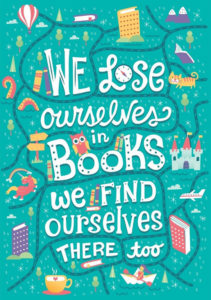 these I knew I had to tell you firstly about how well written they are, how much delight the wordplay and storytelling will bring, and then how they will help you learn and grow and see the world anew. With that in mind I jettisoned a few that were important but not utterly lovely and a few that I liked but didn’t love. There are plenty of excellent, important books. These ten are great because they are beautiful, so very nicely done, each in their own way, all well crafted and pleasing to read, even if the content includes some very hard stuff.
these I knew I had to tell you firstly about how well written they are, how much delight the wordplay and storytelling will bring, and then how they will help you learn and grow and see the world anew. With that in mind I jettisoned a few that were important but not utterly lovely and a few that I liked but didn’t love. There are plenty of excellent, important books. These ten are great because they are beautiful, so very nicely done, each in their own way, all well crafted and pleasing to read, even if the content includes some very hard stuff.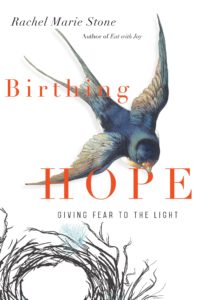 Birthing Hope: Giving Fear to the Light Rachel Marie Stone (IVP) $16.00 I think I am more grateful for this book then nearly anything I’ve read this season and Stone’s well-crafted prose is certainly among the very best writing I’ve encountered in a Christian book in ages. I have promoted this before I spent much time with it by stating the obvious: she is a doula and she works the birthing metaphor beautifully. What a great move, talking about bringing something new to the world by being vulnerable and taking up risk, like parents do. There’s some vivid childbirth stories and plenty of bodily talk about womanly stuff. (I do not buy any assumptions of squeamishness about this attributed to guys; women and men alike may be squeamish and women and men alike will take it all in with wide-eyed wonder. This powerful bit of prose is not a “woman’s book” although surely many will love it.)
Birthing Hope: Giving Fear to the Light Rachel Marie Stone (IVP) $16.00 I think I am more grateful for this book then nearly anything I’ve read this season and Stone’s well-crafted prose is certainly among the very best writing I’ve encountered in a Christian book in ages. I have promoted this before I spent much time with it by stating the obvious: she is a doula and she works the birthing metaphor beautifully. What a great move, talking about bringing something new to the world by being vulnerable and taking up risk, like parents do. There’s some vivid childbirth stories and plenty of bodily talk about womanly stuff. (I do not buy any assumptions of squeamishness about this attributed to guys; women and men alike may be squeamish and women and men alike will take it all in with wide-eyed wonder. This powerful bit of prose is not a “woman’s book” although surely many will love it.)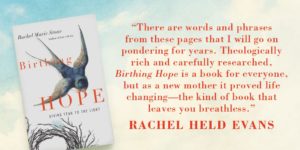
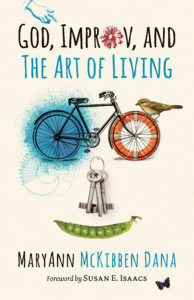 God, Improv, and the Art of Living MaryAnn McKibben Dana (Eerdmans) $21.99 Oh man, this is a fabulous book, well-written, creative, and very interesting. It is a brand new release that I can honestly say – I love saying this! – that there is nothing like it in print! Ms. McKibben Dana is a good storyteller and a fine, fine essayist – her first book was the lively year-long memoir called Sabbath in the Suburbs: One Family’s Experiment with Holy Time – and here she offers a blend of creative reflection on her experiences, some artful self-helpy sort of practical guidance, a bit of allusive theology (she is a Presbyterian USA pastor, a bit progressive and open.) It’s well written, entertaining, and in many ways wise.
God, Improv, and the Art of Living MaryAnn McKibben Dana (Eerdmans) $21.99 Oh man, this is a fabulous book, well-written, creative, and very interesting. It is a brand new release that I can honestly say – I love saying this! – that there is nothing like it in print! Ms. McKibben Dana is a good storyteller and a fine, fine essayist – her first book was the lively year-long memoir called Sabbath in the Suburbs: One Family’s Experiment with Holy Time – and here she offers a blend of creative reflection on her experiences, some artful self-helpy sort of practical guidance, a bit of allusive theology (she is a Presbyterian USA pastor, a bit progressive and open.) It’s well written, entertaining, and in many ways wise.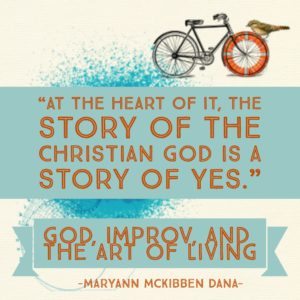 At the heart of this wild book are two big claims that are common sense enough, to my weird ears, anyway, and from which the author extrapolates. First, God wants us to say Yes. And, secondly, that yes, really must be a Yes, And.
At the heart of this wild book are two big claims that are common sense enough, to my weird ears, anyway, and from which the author extrapolates. First, God wants us to say Yes. And, secondly, that yes, really must be a Yes, And.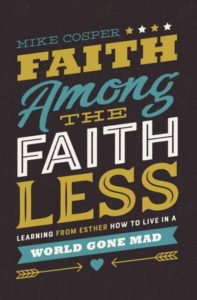 Faith Among the Faithless: Learning From Esther How to Live in a World Gone Mad Mike Cosper (Nelson) $16.99 I have recommended all of Cosper’s books in recent years, from his wonderful book on worship (Rhythms of Grace and the great study of pop culture called The Stories We Tell and the remarkably thoughtful, rich study Recapturing the Wonder.) I list this brand new one now because he is a very fine writer and a very fine thinker and to show that even a Bible commentary can be playful, creative, culturally engaged and full of inspired insight about living well in the very real world.
Faith Among the Faithless: Learning From Esther How to Live in a World Gone Mad Mike Cosper (Nelson) $16.99 I have recommended all of Cosper’s books in recent years, from his wonderful book on worship (Rhythms of Grace and the great study of pop culture called The Stories We Tell and the remarkably thoughtful, rich study Recapturing the Wonder.) I list this brand new one now because he is a very fine writer and a very fine thinker and to show that even a Bible commentary can be playful, creative, culturally engaged and full of inspired insight about living well in the very real world.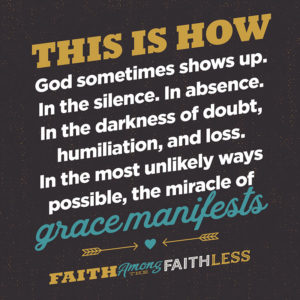 In a fascinating move Cosper says that for those of us looking for faithful presence in the world and uniquely Christian cultural engagement and calls to fidelity amidst our post-Christendom culture, we might find much more sturdy help from the backslidden and compromised Esther and Mordecai rather than the steadfast Daniel. Both are stories set in exile, but Daniel – the hero of so many sermons about cultural transformation — was raised in a firm faith tradition and he knew well the stories of Israel. Alas, it seems (and this is evident in the close reading Cosper gives) our heroes of Esther were far from fidelity, deeply compromised, clearly accommodated to the pagan ethos of the empire of Xerxes et al.
In a fascinating move Cosper says that for those of us looking for faithful presence in the world and uniquely Christian cultural engagement and calls to fidelity amidst our post-Christendom culture, we might find much more sturdy help from the backslidden and compromised Esther and Mordecai rather than the steadfast Daniel. Both are stories set in exile, but Daniel – the hero of so many sermons about cultural transformation — was raised in a firm faith tradition and he knew well the stories of Israel. Alas, it seems (and this is evident in the close reading Cosper gives) our heroes of Esther were far from fidelity, deeply compromised, clearly accommodated to the pagan ethos of the empire of Xerxes et al.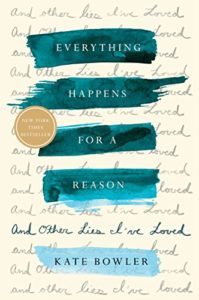 Everything Happens for a Reason And Other Lies I’ve Loved Kate Bowler (Random House) $26.00 I hesitated to list this as I’m sure most BookNotes readers would know of it already; it has garnered so much buzz and been reviewed so well, it is nearly a publishing phenomenon, riding the best-seller list for a while, now. Perhaps in league with the stunning When Breath Becomes Air or Being Mortal it is a book about ultimate things that is exceptionally insightful, beautifully written, raw and wise (and irreverent and funny, too, believe it or not.) With advanced rave reviews from Publishers Weekly and Kirkus, Bowler’s reflection on dying has become a touchstone for many conversations these days.
Everything Happens for a Reason And Other Lies I’ve Loved Kate Bowler (Random House) $26.00 I hesitated to list this as I’m sure most BookNotes readers would know of it already; it has garnered so much buzz and been reviewed so well, it is nearly a publishing phenomenon, riding the best-seller list for a while, now. Perhaps in league with the stunning When Breath Becomes Air or Being Mortal it is a book about ultimate things that is exceptionally insightful, beautifully written, raw and wise (and irreverent and funny, too, believe it or not.) With advanced rave reviews from Publishers Weekly and Kirkus, Bowler’s reflection on dying has become a touchstone for many conversations these days.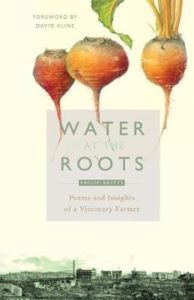 Water at the Roots: Poems and Insights of a Visionary Farmer Philip Britts (Plough Publishing) $16.00 Talk about a handsome book – just the cover and artful design throughout won us over before we even read a page. Happily, the aesthetic quality (most of the book is poetry) is front and center, even though it is a book about agrarianism. That is, very much like Wendell Berry, Philip Britts (1917- 1949) was a poet and a farmer and social activist and a person of faith. He was also a pastor and a bit of a mystic. We are thrilled that our friends at Plough Publishing – the publishing arm of the Bruderhof faith communities – has released these long out-of-print essays, narratives, and poems. And, oh, the poems…
Water at the Roots: Poems and Insights of a Visionary Farmer Philip Britts (Plough Publishing) $16.00 Talk about a handsome book – just the cover and artful design throughout won us over before we even read a page. Happily, the aesthetic quality (most of the book is poetry) is front and center, even though it is a book about agrarianism. That is, very much like Wendell Berry, Philip Britts (1917- 1949) was a poet and a farmer and social activist and a person of faith. He was also a pastor and a bit of a mystic. We are thrilled that our friends at Plough Publishing – the publishing arm of the Bruderhof faith communities – has released these long out-of-print essays, narratives, and poems. And, oh, the poems… The graphic design of Water At the Roots is striking. There are some grainy black and white photos that are just perfect. The chapter’s that bring together his few essays, reflections and poems, are Wilderness, Ploughing, Planting, Cultivating, and Harvesting. There is a very good – no, wonderful — forward by David Kline, the famous author who has written important, intelligent books about Amish farming methods and his own organic farm in Ohio. He gets Britts’s worldview, his writing, his early anticipation of the problems of agribusiness, his faith, his stewardship of the mysteries. With Kline setting the stage, you will even more deeply realize that Water at the Roots is an important little book. But first, it is truly lovely, artful book.
The graphic design of Water At the Roots is striking. There are some grainy black and white photos that are just perfect. The chapter’s that bring together his few essays, reflections and poems, are Wilderness, Ploughing, Planting, Cultivating, and Harvesting. There is a very good – no, wonderful — forward by David Kline, the famous author who has written important, intelligent books about Amish farming methods and his own organic farm in Ohio. He gets Britts’s worldview, his writing, his early anticipation of the problems of agribusiness, his faith, his stewardship of the mysteries. With Kline setting the stage, you will even more deeply realize that Water at the Roots is an important little book. But first, it is truly lovely, artful book.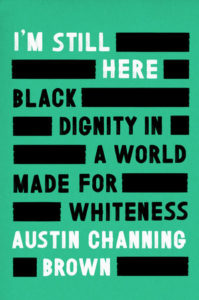 I’m Still Here: Black Dignity in a World Made for Whiteness Austin Channing Brown (Convergent) $25.00 Eloquent, moving, compelling writing about race and racism – like eloquent, moving writing about grief, say – is not uncommon. Something about the worst in life brings out good words, inspired words of rage, lament, insight, grace. That this new book is a smallish hardcover of a certain trim shape immediately brings to mind Ta-Nehisi Coates and Michael Eric Dyson, the decade’s most well-known writing by African American scholars who have worn their broken hearts right on their sleeves and have been catapulted to fame for their eloquence and profundity and wordsmithing. (The trim sized hard-covers that were so very well written and culturally significant to which I refer are, of course, Coates’s Between the World and Me and Dyson’s Tears We Cannot Stop.) It is too early to determine if I’m Still Here will become known as a similarly fervent, well-told story of one black woman’s journey through white America, but it very well might. Christena Cleveland calls it “a stunning debut.”
I’m Still Here: Black Dignity in a World Made for Whiteness Austin Channing Brown (Convergent) $25.00 Eloquent, moving, compelling writing about race and racism – like eloquent, moving writing about grief, say – is not uncommon. Something about the worst in life brings out good words, inspired words of rage, lament, insight, grace. That this new book is a smallish hardcover of a certain trim shape immediately brings to mind Ta-Nehisi Coates and Michael Eric Dyson, the decade’s most well-known writing by African American scholars who have worn their broken hearts right on their sleeves and have been catapulted to fame for their eloquence and profundity and wordsmithing. (The trim sized hard-covers that were so very well written and culturally significant to which I refer are, of course, Coates’s Between the World and Me and Dyson’s Tears We Cannot Stop.) It is too early to determine if I’m Still Here will become known as a similarly fervent, well-told story of one black woman’s journey through white America, but it very well might. Christena Cleveland calls it “a stunning debut.” 
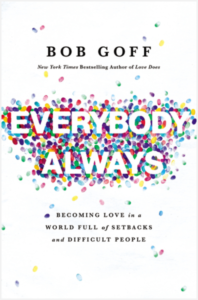 Everybody Always: Becoming Love in a World Full of Setbacks and Difficult People Bob Goff (Nelson) $16.99 We’ve already announced this one; we were very, very happy to describe it here the week it arrived. We knew then that it would be an energetic, upbeat read and we have certainly not been disappointed. There’s a reason it has zoomed to the top of the best-sellers list.
Everybody Always: Becoming Love in a World Full of Setbacks and Difficult People Bob Goff (Nelson) $16.99 We’ve already announced this one; we were very, very happy to describe it here the week it arrived. We knew then that it would be an energetic, upbeat read and we have certainly not been disappointed. There’s a reason it has zoomed to the top of the best-sellers list.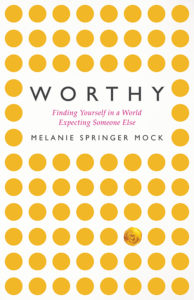 Worthy: Finding Yourself in a World Expecting Someone Else Melanie Springer Mock (Herald Press) $16.99 I was intrigued by the curious cover – see that one little circle that’s different? — and was intrigued by the first line of the excellent foreword by Carolyn Custis James who says “Every once in a while, a book lands on my desk that I wish I had read when I was in college. Worthy is one of those books.”
Worthy: Finding Yourself in a World Expecting Someone Else Melanie Springer Mock (Herald Press) $16.99 I was intrigued by the curious cover – see that one little circle that’s different? — and was intrigued by the first line of the excellent foreword by Carolyn Custis James who says “Every once in a while, a book lands on my desk that I wish I had read when I was in college. Worthy is one of those books.”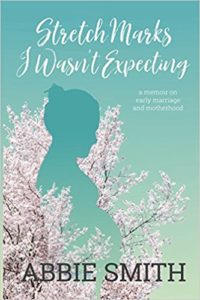 Stretch Marks I Wasn’t Expecting: A Memoir on Early Marriage and Motherhood Abbie Smith (Kalos Press) $15.95 Kalos Press is an small, indie publisher we like a lot; that they do artful, well-written and spiritually sound books like this is the main reason why. We were thrilled to announce this when it came out nearly a half a year ago but we’ve not had the opportunity to tell you about it again… although I’ve been itching to. Stretch Marks… is sort of a memoir, well told and delightfully interesting, but which includes spiritual reflections and Bible explorations. It is about the early years of the author’s marriage and her becoming and being a new mom. And it is so much more; a lot, actually.
Stretch Marks I Wasn’t Expecting: A Memoir on Early Marriage and Motherhood Abbie Smith (Kalos Press) $15.95 Kalos Press is an small, indie publisher we like a lot; that they do artful, well-written and spiritually sound books like this is the main reason why. We were thrilled to announce this when it came out nearly a half a year ago but we’ve not had the opportunity to tell you about it again… although I’ve been itching to. Stretch Marks… is sort of a memoir, well told and delightfully interesting, but which includes spiritual reflections and Bible explorations. It is about the early years of the author’s marriage and her becoming and being a new mom. And it is so much more; a lot, actually.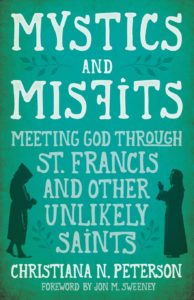 Mystics and Misfits: Meeting God Through St. Francis and Other Unlikely Saints Christiana N. Peterson (Herald Press) $16.99 This is a beautiful book, surprisingly so, even. There are many informative and nicely written books on historic saints and there are plenty on Francis so it is understandable not to jump immediately on yet another. But trust me. This is remarkable.
Mystics and Misfits: Meeting God Through St. Francis and Other Unlikely Saints Christiana N. Peterson (Herald Press) $16.99 This is a beautiful book, surprisingly so, even. There are many informative and nicely written books on historic saints and there are plenty on Francis so it is understandable not to jump immediately on yet another. But trust me. This is remarkable.